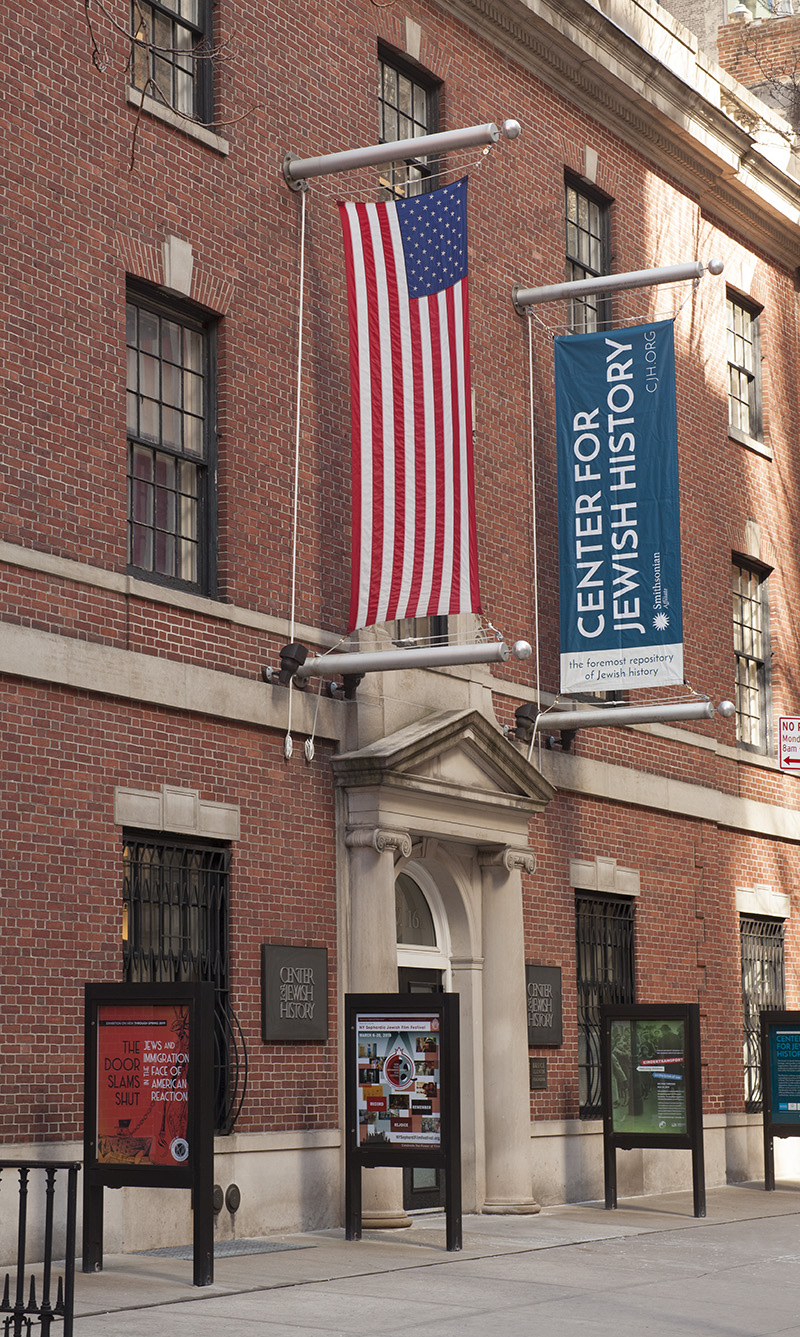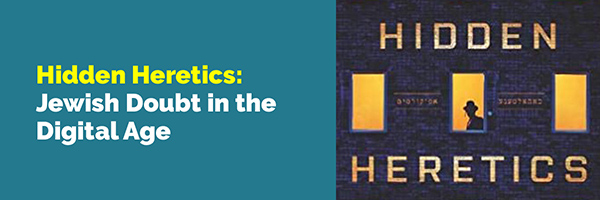panel discussion
Perspectives on Jewish Life in Germany Today
In December 1945, when asked by the German-Jewish emigre journal Aufbau in New York whether he thought there was any future for Jews in Germany, Leo Baeck answered unequivocally: “No! The history of German-speaking Jewry is definitively at its end. There is no turning back the clock.”
There was no stopping the clock either. The 15,000 or so Jews who had survived in hiding or in “mixed” marriages were joined by approximately 250,000 Jewish “Displaced Persons” from Eastern Europe seeking the safety of the American Occupation Zone. The vast majority prepared for emigration to Palestine or other countries outside Europe, but some remained to build lives in Germany, and the history of Jewish life in Germany continued.
Throughout 2021, the Shared History Project has traced the intertwined histories of German-speaking Jews and their neighbors across nearly two millennia full of transformations, surprises, and ruptures – none greater than the cataclysm that led Leo Baeck to declare the end of his people’s history. The postwar period has also seen dramatic transformations in Jewish life, however, most notably the influx of at least 200,000 people with Jewish backgrounds from the former Soviet Union after 1990.
Since then, the presence of a significant and growing Jewish population, new synagogues and rabbinical seminaries, and a burgeoning Jewish cultural sphere seemed to suggest that the “new” Germany had finally overcome its past. But how are Jewish people defining their own place within German society, within a Jewish sphere that is much more diverse than the rest of Germany recognizes, and within German and Jewish history and memory? In recent years, a vital and sometimes contentious discussion within and around the Jewish community in Germany has addressed questions about Jewish identity and belonging, the relationship between Jews and other minorities in Germany – especially the significantly larger Muslim population – and the uses and abuses of Jewish history in Germany’s public sphere.
Our panelists, historians Atina Grossmann (Cooper Union) and Darja Klingenberg (Viadrina University Frankfurt an der Oder) and the poet, theater-maker, and essayist Max Czollek will discuss the terms of these debates and how they emerged from the complex and fractured history of Germany’s post-war Jewish community.
About the Panelists
Atina Grossmann is Professor of Modern European and German History, and Women’s and Gender Studies at The Cooper Union, New York. Her numerous publications include Jews, Germans, and Allies: Close Encounters in Occupied Germany (2007, German 2012), Wege in der Fremde: Deutsch-jüdische Begegnungsgeschichte zwischen New York, Berlin und Teheran (2012), and Reforming Sex: The German Movement for Birth Control and Abortion Reform 1920–1950. She is a member of the Academic Advisory Board of the Leo Baeck Institute – New York | Berlin and the co-author (with Tamar Lewinsky) of the section on the period 1945–1949 in A History of Jews in Germany since 1945 (Michael Brenner, ed.), a companion to the LBI’s four-volume German-Jewish History in Modern Times.
Max Czollek lives in Berlin, where he was born in 1987. After studying political science at the Technical University (TU) of Berlin, he earned a doctorate at the TU's Center for Research on Antisemitism. Since 2009 he has been a member of the poetry collective G13, which publishes books and organizes lectures. Together with Sasha Marianna Salzmann he was initiator of “Desintegration. Ein Kongress zeitgenössischer jüdischer Positionen” (2016) and “Radikale Jüdische Kulturtage” (2017) at Maxim Gorki Theater Berlin, Studio R. Since 2021 he has been curating the Coalition for a Pluralistic Public Discourse (CPPD) on memory culture in the pluralizing European societies. His lyric books Druckkammern (2012), Jubeljahre (2015) and Grenzwerte (2019) were published at Verlagshaus Berlin. In 2018 his non-fiction book Desintegriert Euch! was published at Carl Hanser, followed by Gegenwartsbewältigung in 2020.
Darja Klingenberg is a Research Associate at the Faculty of Social and Cultural Sciences at the European Viadrina University in Frankfurt an der Oder. Her research interests include migration and mobility, the Russian-speaking diaspora, feminist theory, and the sociologies of food and humor. She earned her PhD in social sciences at the Goethe University in Frankfurt with a dissertation on the sociology of middle-class Russian-speaking immigrants in Germany, which is also the topic of her forthcoming book Wohnen nach der Migration. Materialismus, Hoffnung und Melancholie migrantischer Mittelschichten.
Ticket Info: Free; register at lbi.org for a Zoom link
Presented by:

panel discussion
lecture & performance
A Very Jewish Christmas: Toledot Yeshu, a Jewish Anti-gospel
While the “December Dilemma” is a familiar challenge to Jews today, it has its origins in antiquity. Jews in the early days of Christianity encountered Christian traditions and sought to distinguish themselves and their beliefs. One result of this interreligious encounter is the ancient book, Toledot Yeshu, a satirical, carnivalesque anti-gospel telling the story of a magical but not divine Jesus. It was, in some Jewish communities, a tradition to read this story dramatically on Christmas Eve similar to the way that the Megiles-Ester is read on Purim. The text, shrouded in mystery, is extant in a variety of versions, and is believed to contain narrative traditions that are over 1500 years old. Renditions exist in Hebrew, Aramaic, Judeo Arabic, Judeo Persian, Ladino, and, of course, Yiddish. Rare versions were saved by the Paper Brigade from Nazi destruction and recently digitized as a part of the Edward Blank YIVO Vilna Online Collections Project.
Join YIVO for a very Jewish Christmas celebration featuring a talk on the history and receptions of Toledot Yeshu by Azzan Yadin-Israel. Following Yadin-Israel’s presentation, Shane Baker and Eleanor Reissa will perform a bilingual reading, in Yiddish and English, of a version of the story.
This event will take place in person with a kosher Chinese food feast following the presentation.
Proof of full COVID-19 vaccination with matching ID is required in order to enter the Center for Jewish History. Click here to see our Visitor Safety Requirements.
About the Participants
Azzan Yadin-Israel is a professor in the departments of Jewish Studies and Classics are Rutgers University, having earned a BA from the Hebrew University and a PhD from the University of California, Berkeley. His primary area of scholarship is early rabbinic literature, and he has published two books on midrash with the University of Pennsylvania Press. His monograph, "How the Forbidden Fruit Became and Apple" is forthcoming with the University of Chicago Press.
Shane Baker is executive director of the Congress for Jewish Culture, a Yiddish cultural organization based in New York. He is best known for playing Vladimir in his own Yiddish translation of Waiting for Godot, both Off Broadway and internationally. Pre-pandemic, he was appearing as his alter ego, Mitzi Manna in Her First-Ever Final Farewell Tour, with plans to continue in 2022. In 2020, he received Adrienne Cooper Dreaming in Yiddish Award.
Eleanor Reissa is a Tony nominated director, international concert artist, award winning playwright and Broadway actor. Fluent in two languages, English and Yiddish, she has lived a life in the theatre for over thirty years, in nearly every entertainment medium and in many parts of the world. Her work is unique, honest, authentic, and reflects who she is. She appeals to a wide audience and has received critical recognition by the press as well as her peers.
Ticket Info: Live - $25 general; $20 YIVO members, students
Livestream – Free
Register for both at yivo.org for a Zoom link
Presented by:

lecture & performance
workshop
Kickstart your Memoir: Heirlooms
Join award-winning author Gila Green in a hands-on workshop where we will talk about how we can use objects from the past in memoir.
*Note: this is a 90-min. workshop
Canadian author Gila Green is an Israel-based writer, editor, and EFL teacher.
Ticket Info: $25; register at us02web.zoom.usfor a Zoom link
Presented by:
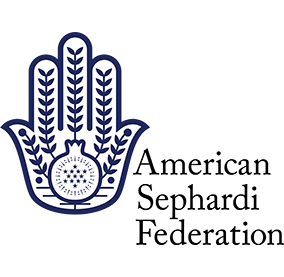
workshop
concert
Celebrating Beethoven’s Birthday: Phoenix Chamber Ensemble Plays Trios by Beethoven, Mozart & Dvorak
On Beethoven’s 251st birthday, Phoenix Chamber Ensemble performs Mozart’s Piano Trio in B flat, K. 502, Beethoven’s Piano Trio in G major, Op. 1, No. 2, and Dvorak’s, Trio No. 4 in E minor, Op. 90 ("Dumky"). Pianists Vassa Shevel and Inessa Zaretsky are joined by Anna Elashvili on violin and Raman Ramakrishnan on cello.
Auditorium seating is available for 100. This concert will also be live streamed for those who cannot attend in person.
To ensure compliance with local health and safety guidelines, proof of full COVID-19 vaccination (at least 14 days after your final vaccine dose) with matching ID is required for all visitors 12 and older. You can provide proof of vaccination by displaying it on your smartphone, by presenting a physical copy, or by using the New York State Excelsior Pass or NYC COVID Safe App (Android | iOS). Other acceptable forms of COVID-19 vaccination proof are the CDC Vaccination Card or NYC Vaccination Record. Mask wearing is mandatory throughout the building.
This program is supported, in part, by public funds from the New York City Department of Cultural Affairs in partnership with the City Council.
Ticket Info:
In person: $15 general; $10 members, seniors, students – ADVANCE TICKETS ONLY; NO SALES AT THE DOOR
Reserve In-Person Tickets
On YouTube: Pay what you wish
Reserve YouTube Tickets
Presented by:

concert
lecture
Emotional Geography of Revenge: Polish Jews and the Search for Postwar Justice in the Polish Countryside
While there is now a considerable amount of work showing the disintegration and extra-legal purges omnipresent in postwar Europe in the immediate aftermath of liberation, individual Jews were usually written out of this story. They were often considered physically and emotionally incapable of getting revenge. The notion of revenge as not only morally ambiguous, but also “irrational” and “uncivilized” as well as dangerous, potentially leading to communal unrest and a circle of violence, was also at that point reinforced by representatives of the Polish Jewish community. Katarzyna Person discusses how individual survivors, despite very few opportunities available to them, did attempt to get both physical revenge and retribution. Thus the Jewish search for justice can and should be discussed as part of the wider European postwar search for revenge and retribution, while at the same time can be clearly disentangled from the violence surrounding it.
About the Speaker:
Katarzyna Person received her PhD from the University of London and her habilitacja from the Polish Academy of Science. She works in the Jewish Historical Institute in Warsaw, where she leads the Ringelblum Archive publishing project. She has published on the Holocaust and its aftermath in occupied Poland. Her most recent book is Warsaw Ghetto Police. The Jewish Order Service during the Nazi Occupation (Cornell University Press 2021).
Ticket Info: Free; register at yivo.org for a Zoom link
Presented by:

lecture
lecture
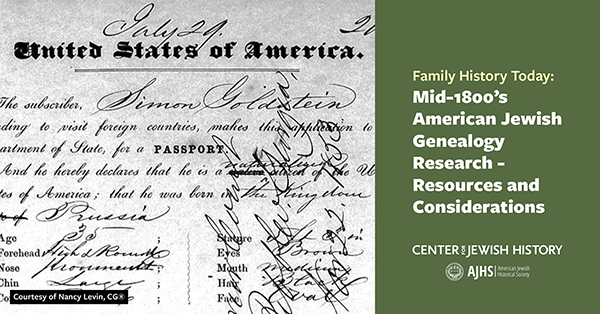
Researching Jewish ancestors who immigrated to the United States in the mid-1800’s can be challenging, as common genealogical resources which exist in later periods may be unavailable or less informative in this period. In this lecture, Nancy Levin, a professional genealogist licensed by the Board for Certification of Genealogists since 1997, will highlight some of the lesser-known resources and special considerations necessary for successful research in mid-1800’s America.
Live closed captions will be available.
This program is sponsored by the Ackman & Ziff Family Genealogy Institute at the Center for Jewish History. It is funded, in part, by public funds from the New York City Department of Cultural Affairs in partnership with the City Council. Live closed captioning has been made possible by a grant from the Institute of Museum and Library Services.
Ticket Info: Pay what you wish; register at programs.cjh.org/tickets/family-history-today-2021-12-13 for a Zoom link
Presented by:


lecture
yiddish club
YIVO Yiddish Club: Yiddish and Hasidic Culture in Film, Tv, and Theater Today With Lili Rosen
Nu, vilst redn a bisele yidish? An event for Yiddish enthusiasts the world over, the YIVO Yiddish club is an informal monthly gathering to celebrate mame-loshn. Hosted by Shane Baker, sessions take place in English, and are liberally peppered with Yiddish. Each month Baker is joined by a different guest who discusses their work and a related Yiddish cultural theme. In the spirit of a club, sessions are held as interactive zoom meetings in which participants can see and hear one another. Each session includes ample time for audience questions, group discussion, and, time permitting, knock-down, drag-out arguments. Attendees need not know any Yiddish to attend, though some familiarity with the language is highly recommended.
This session features actor, writer, and producer Lili Rosen for a discussion of Yiddish and Hasidic culture in film, TV, and theater today. Born and raised in a Hasidic Jewish community in Brooklyn, Rosen featured as Reb Yosele in the hit Neftlix series Unorthodox and is the managing director of New Yiddish Rep.
Ticket Info: Free; register at yivo.org/YiddishClub9 for a Zoom link
Presented by:

yiddish club
panel discussion
Back to Berlin
We are pleased to announce a virtual panel discussion of the film “Back to Berlin.” We will be joined by the film’s director, Catherine Lurie, and historian Dr. Moshe Zimmermann, for a discussion examining the intersection of sports, antisemitism, and racism in German-Jewish history.
About the Film
The “Back to Berlin” cameras follow eleven modern-day Jewish bikers on an epic journey from Tel-Aviv to Berlin, crossing nine European countries in 24 days. Their mission: To deliver the Maccabi torch to Hitler’s infamous 1936 Olympiastadion for the Opening Ceremony of the 2015 European Maccabiah Games. These riders follow in the tracks of the early 1930s’ bikers who set out from Tel Aviv to all corners of Europe to seek out athletes to compete in the first Maccabiah Games.
Each country holds a chilling resonance for the bikers - each a Holocaust survivor or descendant of a survivor. The juxtaposition of the present and past is the underlying thread, mixing archival footage with the 2015 journey. This is the story of people overcoming the worst as they attempt to reaffirm belief in a common humanity.
View the trailer here: youtube.com/watch?v=-e-6LP0Bt_M
About the Speakers
Catherine Lurie is a film producer and journalist based in London. She conceived the idea of Back to Berlin after working as a correspondent covering the 2013 Maccabiah Games in Israel, where she found, produced and directed five human interest stories. She is on the Board of Trustees for Maccabi World Union. Her company, Luria Media, focuses on subjects relating to humanitarian causes.
“This has been a project of passion. When I heard that Germany would host the 2015 Maccabi Games at this infamous site - I decided to capture this ironic moment, when Germany now welcomed Jews. We would deliver the torch and fly the Israeli flag defiantly against injustice and intolerance through a Europe where Jews once thrived.”
Dr. Moshe Zimmermann, born 1943 in Jerusalem, is Professor emeritus for German History. From 1986-2012 he was Director of the Richard-Koebner-Center for German History at the Hebrew University, Jerusalem. Dr. Zimmermann has been a visiting professor in Heidelberg, Mainz, Princeton (USA), Köln, Halle, München, Saarbrücken, Kassel, Göttingen and Krakow (Poland). His work has garnered numerous prizes, including the Humboldt-Forschungspreis 1993, Jacob- und Wilhelm-Grimm-Prize of the DAAD 1997; Dr. Lukas Prize of the Uni Tübingen 2002 and the Lessing-Prize of the Lessing Akademie Wolfenbüttel 2006. He is the author of many publications in German, English and Hebrew about nationalism, antisemitism, the history of sport, film-history and German-Jewish history, as well as about the Holocaust, collective memory in Germany and Israel, and German-Israeli relations.
Anton Klix, Consul for Political Affairs at the German Consulate General New York, will offer welcoming remarks.
This event is co-hosted by the Friends of Freiburg University, the Leo Baeck Institute New York, and the German Consulate General New York.
Participants are encouraged to watch the film in advance. The link will be provided to those who register for the program.
Ticket Info: Free; register at lbi.org for a Zoom link
Presented by:

panel discussion
lecture
Putting on Cologne: An Exploration of a Medieval City
The medieval city of Cologne was a bustling metropolis and a hub of commerce. The city is better known for its economic prowess, with Jews and Christians working side by side. But it is less known for its contribution to theology and canon law, from the Jewish to the halakha and Jewish tradition. Nevertheless, due to the city’s central location between England, the Low Countries, Northern France and the German Rhineland, it serves as a gauge for assessing many religious, political and cultural processes in the high middle ages. Dr. Ephraim Shoham Steiner, the 2021-2022 visiting scholar and a Fordham-NYPL Fellow in Jewish Studies, and members of Fordham’s faculty in Medieval Studies will explore together how Cologne served in this fashion drawing on examples from both medieval Christian and Jewish sources.
Ephraim Shoham-Steiner is Professor of Medieval Jewish History at the Department of Jewish History at Ben-Gurion University of the Negev and an expert on urban life in Europe in the late Middle Ages. For 2021-2022, he is the Fordham-NYPL Research Fellow in Jewish Studies and a Visiting Scholar at Fordham University. He is the author of On the Margins of a Minority: Leprosy, Madness, and Disability among the Jews of Medieval Europe (2014) and more recently, Jews and Crime in Medieval Europe (Wayne State, 2020).
Ticket Info: Free; register at lbi.org for a Zoom link
Presented by:

lecture
book talk
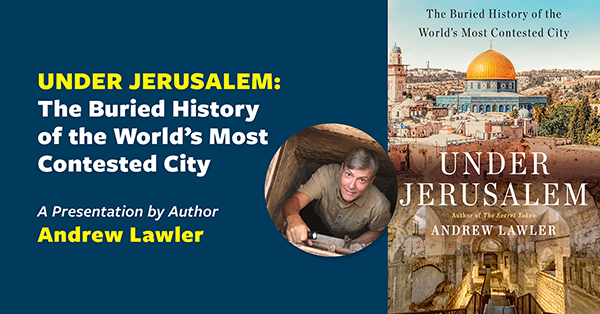
In UNDER JERUSALEM: The Buried History of the World’s Most Contested City, acclaimed journalist and author Andrew Lawler delves into the tombs, tunnels, and trenches of the Holy City—a saga of biblical treasures, intrepid explorers, and political upheaval—and brings to life the indelible characters who have investigated this subterranean landscape. Sharing previously unpublished images by National Geographic photographers, Lawler will discuss how the 150-year quest to unearth the city’s biblical history has not only led to remarkable discoveries, but also contributed to riots and bloodshed. And yet while the colorful array of excavators has helped spawn Zionism, create the state of Israel, and ultimately define the conflict over modern Jerusalem, their struggles to control this contested place may also provide a map for two peoples and three faiths to peacefully coexist.
This program is funded, in part, by public funds from the New York City Department of Cultural Affairs in partnership with the City Council.
Ticket Info: Pay what you wish; register at programs.cjh.org/tickets/under-jerusalem-2021-12-08 for a Zoom link
Presented by:

book talk
panel discussion
Jewish Identity in Lithuania Today
Join YIVO for a conversation about the resurgence of interest in Jewish identity in Lithuania today. YIVO’s Executive Director Jonathan Brent will interview Migle Anušauskaite, Anna Avidan, and Kestas Pikunas about their work with and interest in Jewish culture today.
Ticket Info: Free; register at yivo.org for a Zoom link
Presented by:

panel discussion
panel discussion
Ethical Dilemmas for Religious Leaders in Times of Crisis
LBI & Fellowships at Auschwitz for the Study of Professional Ethics
The rise of National Socialism, an ideology that sought to assimilate all social institutions toward its political ends, forced a reckoning for those in fields that once valued their independence from the state and political concerns. This played out not just in the professions, such as business, journalism, law, medicine but also in religion. Join us as our panelists Michael A. Meyer (Hebrew Union College) and Susannah Heschel (Dartmouth College) examine the excruciating choices faced by Jewish religious leaders, such as Rabbi Leo Baeck, as well as the response of Church leaders to National Socialism.
When he was elected to head the Reich Representation of German Jews in 1933, Leo Baeck had to continually weigh the value of principled opposition and almost certain martyrdom against the limited opportunities he had to reduce harm to his flock – all while maintaining the unity of a diverse Jewish community under threat. Famously, Baeck personally foreswore emigration even as he worked tirelessly to facilitate the escape of others.
Christian leaders did not face the same existential threat, but they grappled with how to respond to a regime that was at best indifferent and sometimes hostile to the church. For example, the "German Christian" movement within the Lutheran Church eagerly set about taking steps to harmonize its theology with a völkisch ideology, even revising scripture to remove Jewish influences. More theologically conservative elements resisted what they perceived as a threat to the autonomy of the Church, but only a small number of individuals ever overcame an ingrained attitude of Christian anti-Judaism to resist the Nazi's racial policies.
Our panel will discuss how the institutions, the theology, the training, and the personal moral vision of these religious leaders impacted their choices.
About the Panelists
Michael A. Meyer is the Adolph S. Ochs Professor of Jewish History Emeritus, Hebrew Union College-Jewish Institute of Religion, Cincinnati. Meyer is the author of more than 200 articles and reviews as well as numerous books, including Response to Modernity: A History of the Reform Movement in Judaism and the biography, Leo Baeck: Living a Religious Imperative in Troubled Times (2020).
Susannah Heschel is the Eli Black Professor of Jewish Studies at Dartmouth College. Her scholarship focuses on Jewish-Christian relations in Germany during the 19th and 20th centuries, the history of biblical scholarship, and the history of antisemitism. Her numerous publications include Abraham Geiger and the Jewish Jesus (University of Chicago Press), which won a National Jewish Book Award, and The Aryan Jesus: Christian Theologians and the Bible in Nazi Germany (Princeton University Press). She is the editor, with Robert P. Ericksen of the volume Betrayal: German Churches and the Holocaust (1999).
Ticket Info: Free; register at lbi.org for a Zoom link
Presented by:

panel discussion
celebration
Eid Al-Banat
The Institute of Jewish Experience and the Mizrahi Dance Archive invites you to a unique global celebration of Eid Al-Banat!
This year for the North African holiday of Eid Al-Banat (The Festival of Daughters, in Judeo-Arabic), or Hag HaBanot (Hebrew), we are bringing together female Mizrahi talents to virtually celebrate North African Jewish traditions, female leadership, music, dance, and so much more.
This festival honors the story of Jewish heroines like Judith and Queen Esther and the important role of women in Jewish life until today. It is customary to sing, dance, and light the night’s menorah candle and focus on bringing together generations of mothers, daughters, aunts, sisters and the extended community. Women would traditionally get together to bake sweet treats and give gifts to each other. They would sing piyyutim and pray for the health and wellbeing of the women in their lives. It is a celebration of women, past and present.
In this year’s celebration, we will be featuring musician Lala Tamar, a world-renowned Israeli singer, who will be streaming a concert from Morocco accompanied by local female musicians. Lala is known for her bold and feminine style where she incorporates her Moroccan roots and the ancient Judeo-Spanish language of Haketia.
Jackie Barzvi will be leading us in celebratory dance to Jewish Moroccan music, where anyone can follow along, without any previous dance experience. Jackie is a professional Raqs Sharqi (belly dance) instructor and performer and the creator of the Mizrahi Dance Archive.
Dr. Hélène Jawhara Piñer, author of Sephardi: Cooking the History. Recipes of the Jews of Spain and the Diaspora from the 13th Century to Today will be sharing a new recipe created uniquely for this program that incorporates the historical and modern significance of the day in the context of specific food items.
Ticket Info: Free; register at us02web.zoom.usfor a Zoom link
Presented by:

celebration
concert
David's Harp Returns – Live in Concert for Hanukkah
Bask in some of the Middle East’s most exhilarating music, played by David’s Harp: a program of Sephardic folk songs in Ladino (Judeo-Spanish), Turkish, Greek, and Hebrew. “Canciones de Sefarad,” sung with flute, oud, keyboard, and percussion, brings David’s Harp’s virtuosity and dynamic energy to the rich musical legacy of the Sephardim with this exciting program!
This year’s storyteller is Eleanor Reissa, Tony-award nominee, award-winning playwright, actress, and international concert artist.
To ensure compliance with local health and safety guidelines, proof of full COVID-19 vaccination (at least 14 days after your final vaccine dose) with matching ID is required for all visitors 12 and older. You can provide proof of vaccination by displaying it on your smartphone, by presenting a physical copy, or by using the New York State Excelsior Pass or NYC COVID Safe App (Android | iOS). Other acceptable forms of COVID-19 vaccination proof are the CDC Vaccination Card or NYC Vaccination Record. Mask wearing is mandatory throughout the building.
Ticket Info: $18 general, $12 members, $9 seniors and students at eventbrite.com
Presented by:
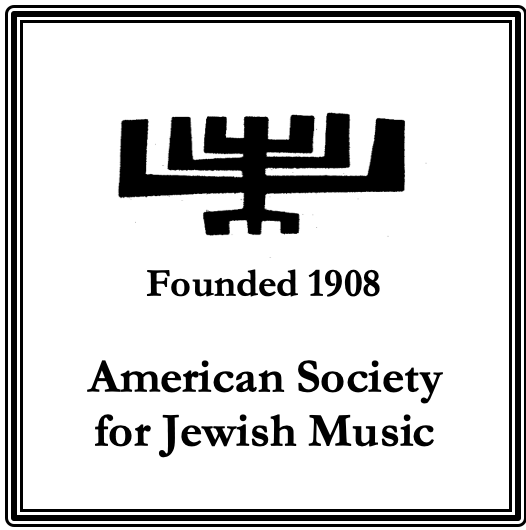


concert
book club
LBI Book Club, Vol. XVI: Panorama by H. G. Adler
The LBI Book Club will read and discuss Panorama by H.G. Adler with special guest Peter Filkins.
Please note that the Zoom link to the program can be found at the bottom of your registration confirmation email. This information will also be emailed to you via Eventbrite the day before the event at 9am EDT and 30 minutes prior to the event.
About the Book
Only recently available for the first time in English, Panorama is the newly-rediscovered first novel of H. G. Adler, a modernist master whose work has been compared to that of Kafka, Joyce, and Solzhenitsyn. A brilliant epic told in ten distinct vignettes, Panorama is a portrait of a place and people soon to be destroyed, as seen through the eyes of the young Josef Kramer. It moves from the pastoral World War I-era Bohemia of Josef's youth, to a German boarding school full of creeping prejudice, through an infamous extermination camp, and finally to Josef's self-imposed exile abroad, achieving veracity and power through a stream-of-consciousness style reminiscent of our greatest modern masters. Written soon after the war, Panorama was not published until 1988.
About the Author
Hans Günther Adler was born in Prague in 1910, the son of a bookbinder. He studied music, art, literature, philosophy and psychology. After completing his doctorate in 1935, he worked for Urania, a public educational institute in Prague, and for Czech radio. In February 1942, he was deported to Theresienstadt and from there in October 1944 to Auschwitz. From there he was transferred to sub-camps of Buchenwald, where he was liberated.
After he was freed in April 1945, Adler returned to Prague. He first worked as a teacher of children and youth who had survived the Shoah (including Yehuda Bacon) and was active in rebuilding the Jewish Museum in Prague. On 11 February 1947, Adler emigrated to England and lived as a self-employed academic, author and lyrical poet in London. He dedicated himself to the task of depicting the persecution and extermination of European Jews.
In 1948, he completed his study entitled Theresienstadt 1941-1945. Das Antlitz einer Zwangsgemeinschaft ("Theresienstadt 1941-1945: The Face of an Enforced Community"), published in 1955. In this work, he analyzes the functioning of the bureaucracy and its role in the transportation and extermination of the Jewish population. Most of his work was published long after he had completed it or only after his death. In 1958, he received the Leo Baeck Medal, in 1969 the Charles Veillon Prize, in 1974 the Buber-Rosenzweig Medal. In 1977, he received the title of professor in Austria and in 1980 he was awarded an honorary doctorate from the university of education in West Berlin. From 1973 to 1985, he was president of the PEN Centre for German-speaking Authors Abroad. H. G. Adler died in London on 21 August 1988.
About the Guest
Peter Filkins is an American poet and literary translator. Filkins graduated from Williams College with a Bachelor of Arts and from Columbia University with a Master of Fine Arts degree. His poetry collections include the forthcoming Water / Music, as well as The View We’re Granted, co-winner of the 2013 Sheila Motton Best Book Award from the New England Poetry Club, and Augustine’s Vision, winner of the 2009 New American Press Chapbook Award. His poems, essays, reviews, and translations have appeared in numerous journals, including The New Republic, Partisan Review, The New Criterion, and The Yale Review.
Filkins has also translated several books of postwar German literature into English. His translation of Ingeborg Bachmann’s collected poems, Songs in Flight, received an Outstanding Translation Award in 1995 from the American Literary Translators Association and was reissued in an expanded second edition titled Darkness Spoken, which received a Distinguished Translation Award from the Austrian Ministry for Education, Art, and Culture in 2007. Filkins was the first to translate H. G. Adler's novels into English. The Journey, Panorama, and The Wall, the three novels Filkins translated, all written soon after the war, but not published until the 1962, 1968, and 1988, respectively. Filkins' translation of Panorama was listed as one of the best books of 2011 by The New Republic. His biography, H. G. Adler: A Life in Many Worlds, was published by Oxford University Press in March 2019.
Filkins has taught literature and writing at Bard College at Simon's Rock since 1988 and translation at the main campus of Bard College since 2006.
Ticket Info: Free; register at eventbrite.com/ for a Zoom link
Presented by:

book club
panel discussion
Reclaiming Identity: Jews of Arab Lands and Iran share stories of identity, struggle and redemption
Join us for a global virtual event marking the November 30, Israel's national day of commemorating the expulsion of Jews from Arab lands and Iran. We will discuss questions such as: What is my true identity? How does my family narrative coexist within the greater Jewish world? Why, when, and how did I reclaim my heritage identity?
On June 23, 2014 the Knesset adopted a law designating November 30 as an annual, national day of commemoration for the 850,000 Jewish refugees who were displaced from Arab countries and Iran in the 20th century.
This year on November 30, Jews across the world will share personal experiences of their families who left those countries only to once again face losses in the experience of living their heritage and identity. It is time to reclaim our Jewish heritage.
Ticket Info: Free; register at us02web.zoom.usfor a Zoom link
Presented by:

panel discussion
book talk
In the Midst of Civilized Europe: the Pogroms of 1918-1921 and the Onset of the Holocaust
Between 1918 and 1921, over a hundred thousand Jews were murdered in Ukraine by peasants, townsmen, and soldiers who blamed the Jews for the turmoil of the Russian Revolution. In hundreds of separate incidents, ordinary people robbed their Jewish neighbors with impunity, burned down their houses, ripped apart their Torah scrolls, sexually assaulted them, and killed them. Largely forgotten today, these pogroms—ethnic riots—dominated headlines and international affairs in their time. Aid workers warned that six million Jews were in danger of complete extermination. Twenty years later, these dire predictions would come true.
Jeffrey Veidlinger’s new book In the Midst of Civilized Europe: The Pogroms of 1918-1921 and the Onset of the Holocaust draws upon long-neglected archival materials, including thousands of newly discovered witness testimonies, trial records, and official orders, showing for the first time how this wave of genocidal violence created the conditions for the Holocaust. Join us for a discussion on this important new book featuring Jeffrey Veidlinger in conversation with Steven Zipperstein.
Purchase the book here.
About the Speakers
Jeffrey Veidlinger is a professor of history and Judaic studies at the University of Michigan. His books, which include The Moscow State Yiddish Theater and In the Shadow of the Shtetl, have won a National Jewish Book Award, the Barnard Hewitt Award for Theatre Scholarship, two Canadian Jewish Book Awards, and the J. I. Segal Award. He lives in Ann Arbor, Michigan.
Steven J. Zipperstein is the Daniel E. Koshland Professor in Jewish Culture and History at Stanford University. He is the author and editor of nine books; his most recent is Pogrom: Kishinev and the Tilt of History (Liveright/WW Norton) named a book of the year by The Economist and shortlisted for the National Jewish Book Award and the Mark Lytton Prize as the best non-fiction book of 2018. He is now writing a biography of Philip Roth for Yale's Jewish Lives series.
Ticket Info: Free; register at yivo.org for a Zoom link
Presented by:


book talk
lecture
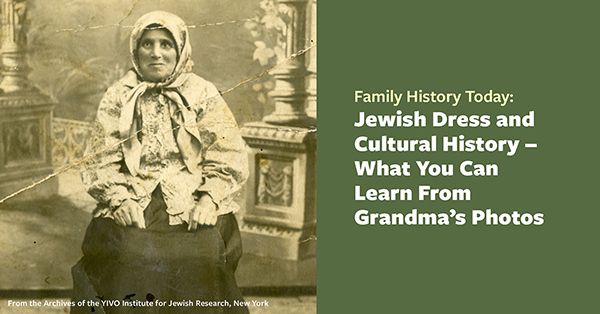
For most of Jewish history, clothing represented a tension between dressing Jewish and dressing like everybody else. This was especially true in the late 19thand early 20th centuries, precisely the era in which the ancestors of most American Jews immigrated to the United States. In this talk, Eric Silverman, scholar at Brandeis University’s Women’s Studies Research Center and author of A Cultural History of Jewish Dress, will demonstrate how we can “read” the clothing in our old family photos for clues about the wider historical processes that shaped our ancestors’ lives, aspirations, and struggles.
Live closed captions will be available.
This program is funded, in part, by public funds from the New York City Department of Cultural Affairs in partnership with the City Council. Live closed captioning has been made possible by a grant from the Institute of Museum and Library Services.
Ticket Info: Pay what you wish; register at programs.cjh.org/tickets/family-history-today-2021-11-30 for a Zoom link
Presented by:

lecture
conversation
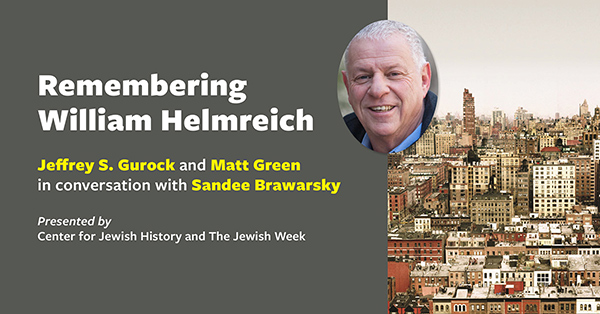
Please join us for a program in tribute to William Helmreich, z”l, sociologist, author, scholar of Judaism, and distinguished professor. He walked every street of New York City – more than 6,000 miles – and wrote about his adventures, conversations, and insights in a series of excellent and uncommon guidebooks that introduce readers anew to the city and its neighborhoods.
The author of many books including The New York Nobody Knows (and individual volumes on Queens, Brooklyn, and Manhattan) along with Against All Odds and The World of the Yeshiva, William Helmreich was a Distinguished Professor of Sociology at City College and at CUNY’s Graduate Center. A man with deep curiosity, wide-ranging brilliance, and a generous spirit, he died of COVID in March 2020.
Featuring:
Jeffrey S. Gurock, the Libby M. Klaperman Professor of Jewish History at Yeshiva University, the author or editor of more than twenty books, many about the Jewish history of New York.
Matt Green, who is walking every block of New York City, as documented in the film The World Before Your Feet (which also features a cameo by William Helmreich).
In conversation with:
Sandee Brawarsky, award-winning journalist, author, and editor.
When you register for this event, you’ll also join the New York Jewish Week community of readers. Look for the latest news about Jewish New York in your inbox soon.
Ticket Info: Pay what you wish; register at programs.cjh.org/tickets/remembering-william-helmreich-2021-11-29 for a Zoom link
Presented by:



conversation
concert
A Recital by Two Exceptional Students from the Conservatory of the Jerusalem Academy of Music and Dance - Live
Featuring Yoav Roth, pianist, student at the Jerusalem Academy of Music and Dance and Karni Malu, singer, graduate of the Jerusalem Academy of Music and Dance, student at Buchman Mehta Music Academy.
Auditorium seating is available for 100. To ensure compliance with local health and safety guidelines, proof of full COVID-19 vaccination (at least 14 days after your final vaccine dose) with matching ID is required for all visitors 12 and older. You can provide proof of vaccination by displaying it on your smartphone, by presenting a physical copy, or by using the New York State Excelsior Pass or NYC COVID Safe App (Android | iOS). Other acceptable forms of COVID-19 vaccination proof are the CDC Vaccination Card or NYC Vaccination Record. Mask wearing is mandatory throughout the building.
Ticket Info: Free; reserve in-person tickets at eventbrite.com
Presented by:


concert
lecture
A Bukharian Jew in Uzbekistan
Manashe Khaimov was born in a city along the Silk Road, in Samarkand, Uzbekistan, where his ancestors lived for over 2000 years. Join Manashe as he will explore the story about being a Bukharian Jew in Uzbekistan. He will discuss his experience in the Uzbekistan school system, his education in the underground yeshiva, and his relationship with his family mikvah (ritual bath), the only mikvah in Samarkand at that time.
About the Speaker
Manashe is a fourth generation community organizer, serial entrepreneur, and social innovator who builds and consults organizations on Jewish diversity.
At his previous role as a Director of Community Engagement and Development at Queens College Hillel, he focused on building a real diverse Jewish community, creating Sephardi & Mizrahi Leadership pipeline while expanding Sephardi & Mizrahi student life programs at five CUNY Hillel campuses. Manashe sat on the Diversity, Equity, and Inclusion committee at Hillel International and served as a facilitator of the Mizrahi & Sephardi Hillel Professionals resource group.
Currently, Manashe is an Adjunct Professor in Jewish Studies, with a specialty in the History and Culture of the Central Asian Jews at Queens College. He is the founding president of SAMi Sephardic American Mizrahi Initiative that focuses on the Leadership Development of under-served Jewish communities on college campuses. Manashe sits on the National Sephardic Advisory Committee at JIMENA. In 2021 Manashe was appointed by Queens District Attorney Melinda Katz as a member of the Jewish Advisory Council. Manashe just accepted a position with Moishe House as their new Eastern Community Manager.
Manashe is founder of the Bukharian Jewish Union, an organization for young professionals in their 20’s/30’s, the founder of AskBobo.org, the only Bukharian online dictionary and the founder of The Jewish Silk Road Tours ™ an initiative that helps to introduce NYers and tourists from around the world to the diversity of NYC.
Ticket Info: $10; register at us02web.zoom.usfor a Zoom link
Presented by:

lecture
book talk
"When I Grow Up" - a Graphic Novel Exploring Interwar Teenage Jewish Life
When I Grow Up is a new graphic nonfiction book, based on six of the hundreds of autobiographies of Eastern European Jewish teens collected by YIVO on the brink of WWII, including those discovered in 2017 which had been hidden in a Lithuanian church cellar. Created by New Yorker cartoonist Ken Krimstein, When I Grow Up shows readers the stories of six young men and women in illustrated narratives showcasing the humor, yearning, ambition, and angst of their teenage years. Join YIVO for a discussion with Krimstein led by scholar Jeffrey Shandler celebrating this new book.
About the Participants
Ken Krimstein’s cartoons have been published in the New Yorker, Barron's, The Harvard Business Review, Prospect Magazine, Punch, The National Lampoon, the Wall Street Journal, Narrative Magazine, and three of S. Gross’s cartoon anthologies. His humor writing has been in The New York Observer’s “New Yorker’s Diary” and humor websites, including McSweeney’s Internet Tendency, Yankee Pot Roast, and Mr. Beller’s Neighborhood. Ken is also an advertising creative director who has taught writing at The School of the Art Institute of Chicago. He is currently a professor at De Paul University.
Jeffrey Shandler is Distinguished Professor of Jewish Studies at Rutgers University. His publications include Adventures in Yiddishland: Postvernacular Language and Culture (2005) and Shtetl: A Vernacular Intellectual History (2014); among other titles, he is editor of Awakening Lives: Autobiographies of Jewish Youth in Poland before the Holocaust (2002) and translator of Emil and Karl, a Holocaust novel for young readers by Yankev Glatshteyn (2006). Shandler has served as president of the Association for Jewish Studies and is a fellow of the American Academy for Jewish Research.
Ticket Info: Free; register at yivo.org for a Zoom link
Presented by:

book talk
yiddish club
YIVO Yiddish Club: Yiddish Puppetry With Jenny Romaine
Nu, vilst redn a bisele yidish? An event for Yiddish enthusiasts the world over, the YIVO Yiddish club is an informal monthly gathering to celebrate mame-loshn. Hosted by Shane Baker, sessions take place in English, and are liberally peppered with Yiddish. Each month Baker is joined by a different guest who discusses their work and a related Yiddish cultural theme. In the spirit of a club, sessions are held as interactive zoom meetings in which participants can see and hear one another. Each session includes ample time for audience questions, group discussion, and, time permitting, knock-down, drag-out arguments. Attendees need not know any Yiddish to attend, though some familiarity with the language is highly recommended.
This session features director, designer and puppeteer Jenny Romaine. Romaine is the co-founder and artistic director of the OBIE winning Great Small Works visual theater collective, the music director of Jennifer Miller’s CIRCUS AMOK and artist in residence at Milk Not Jails and Inside Change. This conversation will focus on her work with Yiddish puppetry, and will also include special guest Eddy Portnoy, whose scholarly work on Zuni Maud and Yosl Cutler was one of the inspirations for Great Small Works’ Muntergang and Other Cheerful Downfalls.
Ticket Info: Free; register at yivo.org/YiddishClub8 for a Zoom link
Presented by:

yiddish club
conversation
At Lunch with Jean Hanff Korelitz
Julie Salamon (Wall Street Journal and NY Times) sits down with New York Times bestselling novelist, playwright, and founder of BOOKTHEWRITER, Jean Hanff Korelitz. Join us online for this compelling interview between writers!
About the Speakers:
Jean Hanff Korelitz is the New York Times bestselling author of the novels The Plot, You Should Have Known (which aired on HBO in October 2020 as The Undoing, starring Nicole Kidman, Hugh Grant, and Donald Sutherland), Admission (adapted as a film in 2013 starring Tina Fey), The Devil and Webster, The White Rose, The Sabbathday River and A Jury of Her Peers, as well as Interference Powder, a novel for children. Her company BOOKTHEWRITER hosts Pop-Up Book Groups in which small groups of readers discuss new books with their authors. She lives in New York City with her husband, Irish poet Paul Muldoon.
Julie Salamon is an American author, critic and storyteller. She worked at The Wall Street Journal for five years first as a commodities and banking reporter before spending eleven years as the paper's film critic. Later she became a staff journalist at The New York Times where she was a TV critic and arts reporter. Later she gained fellowships at the MacDowell Colony and became a Kaiser Media Fellow. She has written both fiction and non-fiction books for adults and children-- and produced articles for magazines that include The New Yorker, Vanity Fair, Vogue, Bazaar, and The New Republic. She has just completed "Unlikely Friends," a memoir available on Audible, and season two of TCM’s hit podcast, The Plot Thickens.
Ticket Info: Free; register at ajhs-org.zoom.us for a Zoom link
Presented by:

conversation
book talk
New Works Wednesdays: Jews and Muslims in Morocco: Their Intersecting Worlds
Join us for New Works Wednesdays with Professor Yolande Cohen and Associate Professor David Koffman discussing their new book No Better Home?: Jews, Canada and the Sense of Belonging. It begins with an audacious question: Has there ever been a better home for Jews than Canada? By certain measures, Canada might be the most socially welcoming, economically secure, and religiously tolerant country for Jews in the diaspora, past or present. No Better Home? takes this question seriously, while also exploring the many contested meanings of the idea of "home."
Contributors to the volume include leading scholars of Canadian Jewish life as well as eminent Jewish scholars writing about Canada for the first time. The essays compare Canadian Jewish life with the quality of life experienced by Jews in other countries, examine Jewish and non-Jewish interactions in Canada, analyse specific historical moments and literary texts, reflect deeply personal histories, and widen the conversation about the quality and timbre of the Canadian Jewish experience. No Better Home? foregrounds Canadian Jewish life and ponders all that the Canadian experience has to teach about Jewish modernity.
About the Authors
Yolande Cohen has been a professor of contemporary history at the University of Quebec in Montreal since 1976. Specializing in the history of women and migration, heads the History, Women, Gender and Migration research group.
David S. Koffman, the J. Richard Shiff Chair for the Study of Canadian Jewry, an Associate Professor in the Department of History, is a cultural and social historian of modern Jewish life, with a specialization in Canadian and U.S. Jewries.
For more about the book: https://utorontopress.com/9781487531102/no-better-home/
Ticket Info: Free; register at us02web.zoom.usfor a Zoom link
Presented by:

book talk
panel discussion
Nazism, Neo-nazism and Music
All political movements use music, and National Socialism is no exception. Both Hitler’s Nazis and postwar neo-Nazis have used different kinds of music in various ways. This panel will explore how German Nazis used music to help facilitate mass murder during the Holocaust, as well as how neo-Nazism became entangled with various music-based subcultural scenes and their connections with political organizations. From the NSDAP to the American Nazi Party’s record label, to the Nazi skinhead movement, to NSBM (National Socialist Black Metal) and even fascist reggae, this panel will document and reflect on how, why, and in what ways National Socialism has come to be tied to various musical forms.
Ticket Info: Free; register at yivo.org for a Zoom link
Presented by:

panel discussion
lecture
Why am I Bukharian if I am not from Bukhara?
We will explore important parts of Bukharian Jewish culture, the Bukharian language (also known as Judeo-Tajik or Bukhori), life cycle events and traditional clothing. We will look at fascinating artifacts and traditional clothing from the Bukharian Jewish Heritage Museum and talk about their importance and how they differ from the local community in Uzbekistan.
About the Speaker
Manashe Khaimov is a fourth generation community organizer, serial entrepreneur, and social innovator who builds and consults organizations on Jewish diversity.
At his previous role as a Director of Community Engagement and Development at Queens College Hillel, he focused on building a real diverse Jewish community, creating Sepharadi and Mizrahi Leadership pipeline while expanding Sephardi and Mizrahi student life programs at five CUNY Hillel campuses. Manashe sat on the Diversity, Equity, and Inclusion committee at Hillel International and served as a facilitator of the Mizrahi and Sephardi Hillel Professionals resource group.
Currently, Manashe is an Adjunct Professor in Jewish Studies, with a specialty in the History and Culture of the Central Asian Jews at Queens College. He is the founding president of SAMi Sephardic American Mizrahi Initiative that focuses on the Leadership Development of under-served Jewish communities on college campuses. Manashe sits on the National Sephardic Advisory Committee at JIMENA. In 2021 Manashe was appointed by Queens District Attorney Melinda Katz as a member of the Jewish Advisory Council. Manashe also just accepted a position with Moishe House as their new Eastern Community Manager.
Manashe is founder of the Bukharian Jewish Union, an organization for the young professionals in their 20’s and 30’s, the founder of AskBobo.org, the only Bukharian online dictionary and the founder of The Jewish Silk Road Tours ™ an initiative that helps to introduce NYers and tourists from around the world to the diversity of NYC.
Ticket Info: $10; register at us02web.zoom.usfor a Zoom link
Presented by:

lecture
panel discussion
Holocaust History in the 21st Century
From the earliest efforts by survivors themselves to document the destruction of European Jews to the enormous international and interdisciplinary literature being produced today, the historiography of the Holocaust has both followed the course of history as a discipline through numerous turns – cultural, narrative, forensic, spatial, etc... – and opened up new methodological paths of its own. As LBI's Shared History Project concludes its examination of the darkest chapter in the 1,700-year history of Jewish life in German-speaking lands, panelists Elizabeth Anthony (USHMM), Anna Hájková (University of Warwick), and Joanna Sliwa (Claims Conference) reflect on the past, present, and future of Holocaust historiography. Aubrey Pomerance (Jewish Museum Berlin) moderates.
About the Panelists
Elizabeth Anthony is the Director of Visiting Scholar Programs at the Jack, Joseph and Morton Mandel Center for Advanced Holocaust Studies of the United States Holocaust Memorial Museum, which supports significant research and writing about the Holocaust and related topics with a particular goal of ensuring the development of a new generation of scholars. Her own research focuses on the postwar Jewish community of Vienna and the records of the International Tracing Service (ITS) archive. Her book, The Compromise of Return: Viennese Jews after the Holocaust (2021) is a co-publication of Wayne State University Press and the USHMM. From 2005–2007, she was a case worker and case work manager for HIAS in Vienna, Austria.
Anna Hájková is Associate Professor of Modern European Continental History at the University of Warwick, UK. She holds a Ph.D. from the University of Toronto. She is the author of The Last Ghetto: An Everyday History of Theresienstadt (Oxford University Press, 2020), the first in-depth analytical history of prison society during the Holocaust, based on archival sources from dozens of archives from ten countries and in nine languages. She has been working on history of Theresienstadt since 2000, and between 2006 and 2008 was the co-editor of Theresienstädter Studien und Dokumente. She has also co-edited the anthology Alltag im Holocaust: Jüdisches Leben im Großdeutschen Reich 1941–1945, and co-authored The Last Veit Simons from Berlin: Holocaust, Gender, and the End of the German-Jewish Bourgeoisie. She regularly contributes to mass media in English, German, and Czech in the publications Haaretz, Süddeutsche Zeitung, Tablet, and Tagespiegel.
Joanna Sliwa is Historian at the Conference on Jewish Material Claims Against Germany (Claims Conference). Her own research focuses on the Holocaust in Poland and on Polish-Jewish history. Joanna has taught at Kean University and Rutgers University, and she served as an educator in teacher training programs on the Holocaust. Joanna’s book, Jewish Childhood in Kraków: A Microhistory of the Holocaust will be published in fall 2021 (Rutgers University press; recipient of the 2020 Ernst Fraenkel Prize from the Wiener Holocaust Library).
Ticket Info: Free; register at lbi.org for a Zoom link
Presented by:

panel discussion
conference
Jewish Soldiers & Fighters in World War II
Sunday, November 14, 11am - 4:30pm & Monday, November 15, 9:30am - 6pm
Amidst the bloodshed and destruction of World War II, nearly 1.5 million Jewish men and women made vital contributions to the Allied war effort against Adolf Hitler and the Axis powers. However, despite the large volume of World War II research, books, movies, and other works, the very fact of these 1.5 million “Jewish soldiers” remains virtually unknown.
In November 2021, leading experts from universities, archives, libraries, and museums will gather on an international (virtual) stage, alongside members of the public, veterans and their families, and Holocaust survivors and their descendants to explore the experience of the Jewish soldier in WWII. Click here for more information.
The Center for Jewish History is a Cultural Partner of this program.
Ticket Info: Free; register at accelevents.com/e/jewishsoldiersinwwii
Presented by:
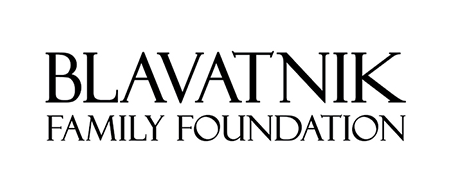
conference
lecture
The Voice of the Mothers: A Look into Sephardi Feminist Approaches to Tradition
Join us for a look into Sephardi Feminist approaches to tradition with Dr. Angy Cohen!
This talk will explore the experiences of Sephardi women who are building a feminist discourse that speaks the language of Sephardi tradition, tells the story of the grandmothers, reclaims the intellectual and moral authority of our foremothers, establishes a public Sephardi and feminist voice, and educates towards a more fair and tolerant Israeli society. We will dive into the experiences of the members of the Mizrahi-feminist Beit Midrash Arevot in Jerusalem, the only one of its kind in Israel, who have been working on the development of “traditionist feminism” (feminism masorati in Hebrew).
About the Speaker
Dr. Angy Cohen is the inaugural Belzberg Postdoctoral Associate in Israel Studies at University of Calgary. She is a cultural researcher whose work deals with personal narratives and identity construction among Moroccan Jews in Israel and Argentina and the experiences of Mizrahi women in the development of a feminist approach to tradition. Her approach to ethnographic work weaves together cultural psychology, narrative psychology, sociology, and anthropology. She is currently working on the manuscript of a book about personal narratives of Spanish-Moroccan Jews in Israel and Argentine, from a comparative approach.
Ticket Info: $10; register at us02web.zoom.usfor a Zoom link
Presented by:

lecture
book club
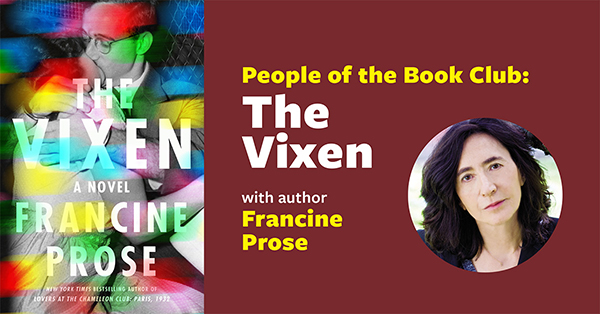
Go behind the stories and peer into the archives at the CJH book discussion, led by Lauren Gilbert, Senior Manager for Public Services at the Center for Jewish History. Join a discussion of The Vixen by Francine Prose, a novel about Simon Putnam, a recent Harvard graduate hired by a distinguished Manhattan publishing firm, which feels a world away from his middle-class Jewish home in Coney Island. Simon’s first assignment, editing a lurid bodice-ripper improbably based on the recent trial and execution of Ethel and Julius Rosenberg, tests his loyalties, because he has a secret that he cannot reveal at the height of the Red Scare: his beloved mother was a childhood friend of Ethel Rosenberg’s. We will look at some documents in the Center’s collections that are connected to the Rosenberg case, and we will be joined by author Francine Prose for a Q&A after the discussion.
Participants will need to obtain their own copy of the book to read in advance.
NOTE: This is an interactive book discussion for all participants, not a lecture, so space is limited.
Ticket Info: Pay what you wish; register at programs.cjh.org/tickets/people-book-club-2021-11-15 for a Zoom link
Presented by:

book club
conference
Jewish Soldiers & Fighters in World War II
Sunday, November 14, 11am - 4:30pm & Monday, November 15, 9:30am - 6pm
Amidst the bloodshed and destruction of World War II, nearly 1.5 million Jewish men and women made vital contributions to the Allied war effort against Adolf Hitler and the Axis powers. However, despite the large volume of World War II research, books, movies, and other works, the very fact of these 1.5 million “Jewish soldiers” remains virtually unknown.
In November 2021, leading experts from universities, archives, libraries, and museums will gather on an international (virtual) stage, alongside members of the public, veterans and their families, and Holocaust survivors and their descendants to explore the experience of the Jewish soldier in WWII. Click here for more information.
The Center for Jewish History is a Cultural Partner of this program.
Ticket Info: Free; register at accelevents.com/e/jewishsoldiersinwwii
Presented by:

conference
book talk
Man of the Futures: the Story of Leo Melamed
YIVO Board Member Leo Melamed, author of Man of the Futures, recounts his journey from Holocaust survivor to prominent leader in the world of finance, sharing behind-the-scenes reminiscences on the financial markets and his philanthropic work in the Jewish community.
About the Author
Leo Melamed (born March 20th, 1932), a Holocaust survivor, found safety in the US during World War II. He is the founder of financial futures. In 1972, as chairman of the Chicago Mercantile Exchange (CME Group), he revolutionized markets with the creation of the International Monetary Market — the first futures exchange for financial instruments — and the launch of currency futures. Twenty years after their inception, Nobel Laureate Merton Miller named financial futures “the most significant innovation of the past two decades.” In 1987, Melamed revolutionized futures trading again with the founding of Globex®, the world’s first futures electronic-trading system.
Ticket Info: Free; registration required at https://www.yivo.org/Man-of-the-Futures
Presented by:

book talk
lecture
The Last Shtetl in Poland? The Jewish World, the Cold War and the Jewish Community of Dzierzoniow (1945-1950)
Using examples from archival, photographic other material from the YIVO and other archives, Kamil Kijek (Taube Department of Jewish Studies, University of Wroclaw) will show how a remarkable community of Polish Jews in formerly German Lower Silesia played an important role not only in Polish post-war history but also in Jewish global politics (on both sides of the so-called Iron Curtain) during the years 1945-1950.
What will become apparent is that, in the aftermath of the Holocaust, many Polish Jews, as well as their western, especially American counterparts, felt that Poland was to be considered more than cemetery of a destroyed Jewish civilization. During the years 1945-1950, the Polish Jewish Lower Silesian community in general, and that of the the town of Dzier?oniów in particular, were at the center of Jewish transnational discussion regarding the future of Polish Jewry after the Holocaust. Kijek will argue that it was, in fact, not the Kielce pogrom of 1946, but the intenstification of the Cold War and the installment of the so-called Stalinist political regime in Poland that was the main trigger leading to the end of faith in the possibility of an existence of Jewish national life in post-Holocaust Poland.
About the Speaker
Dr. Kamil Kijek is a Assistant Professor at the Jewish Studies Department, University of Wroclaw, Poland. He has been a Prins Foundation postdoctoral fellow at the Center for Jewish History in New York and Sosland Family Fellow at the Jack, Joseph and Morton Mandel Center for Advanced Holocaust Studies at the United States Holocaust Museum in Washington, DC. Kijek’s publications include: “Dzieci modernizmu. Swiadomosc i socjalizacja polityczna mlodziezy zydowskiej w Polsce miedzywojennej” [Children of modernism. Socialization and Political Consciousness of the Jewish Youth in Interwar Poland], Wroclaw 2017; “Was It Possible to avoid ‘Hebrew Assimilation’? Hebraism, Polonization, and the Zionist “Tarbut” School System in the Last Decade of Interwar Poland”, “Jewish Social Studies”, vol. 21.2, 2016.; “Between love of Poland, symbolic violence and anti-Semitism. On the idiosyncratic effect of the state education system among the Jewish youth in Interwar Poland” [in:] “Polin. Studies in Polish Jewry”, vol. 30, 2018.
In 2018, he received an international prize for an outstanding publication in the topic of "Jews and Illiberal Regimes in Eastern Europe after 1917" granted by The Leonid Nevzlin Research Center for Russian and East-European Jewry at the Hebrew University of Jerusalem for the book "Dzieci modernizmu."
His current research project is entitled Polish Shtetl after the Holocaust? Jews in Dzierzoniow, 1945-1950.
Ticket Info: Free; register at yivo.org for a Zoom link
Presented by:

lecture
book talk
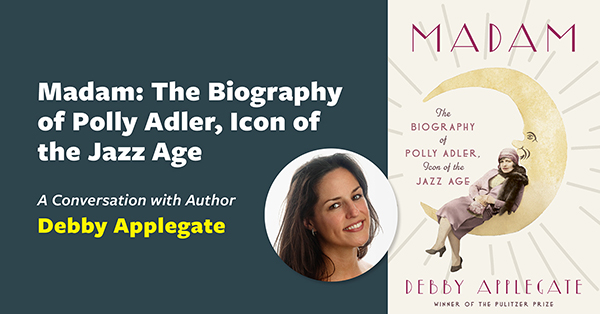
Pearl “Polly” Adler (1900-1962) was a diminutive dynamo whose Manhattan brothels in the Roaring Twenties were key gathering places where high society mingled with violent underworld figures—and had a good time doing it. As a Jewish immigrant from eastern Europe, Polly Adler’s life is a classic American story of success and assimilation that starts like a novel by Henry Roth and then turns into a glittering tale straight out of F. Scott Fitzgerald. Pulitzer Prize-winning author Debby Applegate tells the jaw-dropping story of a notorious madam who as much as any single figure helped make the twenties roar.
This program is funded, in part, by public funds from the New York City Department of Cultural Affairs in partnership with the City Council.
Ticket Info: Pay what you wish; register at programs.cjh.org/tickets/polly-adler-2021-11-10 for a Zoom link
Presented by:


book talk
concert
10 Yiddish Songs by Alexander Krein – Live on Facebook and YouTube
Join us for a performance of Alexander Krein's Ten Yiddish Songs Op. 49 (~1937). Performed by singer Lucy Fitz Gibbon with pianist Ryan MacEvoy McCullough, these 10 songs reimagine Yiddish folksong texts and melodies in rich and imaginative arrangements for piano and voice.
Born in 1883, Krein was raised in a family of musicians and performed cello with his father’s Klezmer band. After studying at the Moscow Conservatory where Krein enrolled at age 13, he became an active member of the Moscow branch of the Society for Jewish Folkmusic. Krein wrote music that was more harmonically adventurous than many of the other composers, taking influence from modernist composers such as Alexander Scriabin. While many of the composers affiliated with the Society for Jewish Folkmusic emigrated to Palestine or the United States, Krein remained in the Soviet Union for the rest of his life. Krein was awarded the title of Honored Artist of the Soviet Union, and was particularly active writing music for theatrical performances including for Moscow’s Hebrew-language Habimah Theater as well as for Yiddish state theaters in Moscow, Kiev, and Minsk.
About the Performers
Soprano Lucy Fitz Gibbon and pianist Ryan MacEvoy McCullough have been making music together since 2006, giving their first joint recital in Sacramento, California, in 2009. As both musical and life partners, Fitz Gibbon and McCullough bring an intimacy to their performances that speaks to their many years of collaboration. The husband-and-wife duo has performed throughout North America and Europe in such venues as New York's Merkin Hall, Park Avenue Armory, Metropolitan Museum of Art, and Di Menna Center; London's Wigmore Hall; and Toronto's Koerner Hall. Their growing joint discography includes forthcoming CDs with Albany Records (Descent/Return, featuring works by John Harbison and James Primosch, and another featuring the collected works of Sheila Silver alongside luminaries Dawn Upshaw, Stephanie Blythe, and Gilbert Kalish) and Acte Préalable (mid-century Polish art song).
Committed to the performance of contemporary works alongside the art song canon, Fitz Gibbon and McCullough have worked closely with emerging and established composers alike. Among the body of works dedicated to them are compositions by Niccolo Athens (Five Poems of Sara Teasdale), Dante De Silva (A Year of Strife), Andrew Hsu (Reticence), Anna Lindemann (The Colony), Pablo Ortiz (California Songs), and Alan Louis Smith (Surfing the Thin Places). They have also given premieres of works by John Harbison (Seven Poems of Lorraine Niedecker) and James Primosch (Descent/Return, The Pitcher, The Old Astronomer) and have worked closely with Sheila Silver on numerous projects. Through the guidance and research of musicologist Mackenzie Pierce, Fitz Gibbon and McCullough have given the US premieres of numerous works by mid-20th century Polish composers ranging from the early and late works of Roman Palester (Three Songs to Texts of Kazimiera Illakowiczówna, Monogramy) and a modern setting of 16th century religious texts (Tadeusz Kassern's Tryptyk Zablobny), as well as songs by Grazyna Bacewicz and Alexander Tansman (Ponctuation Française). They have also brought new life to Milton Babbit's lyrical Du and Adela Maddison's lush Cinq mélodies, while championing long-form songs by Schubert (Viola, Vergissmeinnicht) and Prokofiev (The Ugly Duckling).
Ticket Info: Free; registration required at https://www.yivo.org/Krein2021
Presented by:

concert
concert
Kristallnacht and Its Aftermath: Remembering Terezín; A Tribute to the Artists who Perished in the Holocaust – LIVE!
The program features the world premiere of "Echoes from the Darkness: Messages from the Terezin Diaries of Petr and Eva Ginz," a chamber opera by John Califra. In addition, the concert will include Hans Krása’s “Dance for String Trio," selected songs by Viktor Ullman and Pavel Haas, Gideon Klein’s “Piano Sonata," and the "Sonata for Flute and Piano," by Erwin Schulhoff.
Ticket Info: $18 general; $12 members; $9 seniors/students; register at kristallnacht-and-its-aftermath.eventbrite.com
Presented by:
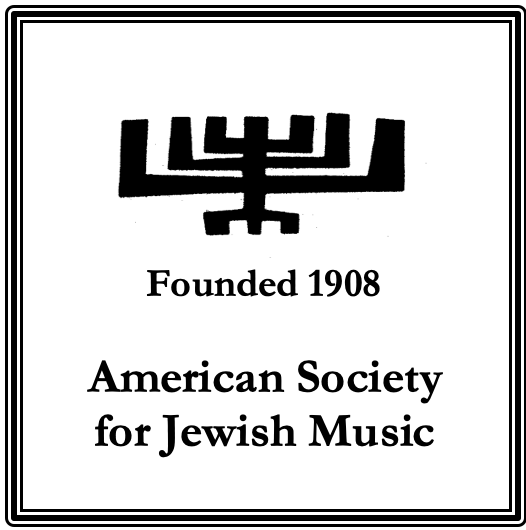



concert
virtual tour
Museum Mondays: A Hanukkah Tour Through Ancient Greece – Greek Exhibits in Museums around the World
Join us for this Hanukkah special! Explore Greek memorabilia in museums around the world from the comfort of your own home with Nachliel Selavan, the Museum Guy.
About your tour guide
Nachliel Selavan created and delivered an integrated learning and museum tour program for both school and adult educational settings at the Metropolitan Museum of Art, and has hosted similar pilot visits to a dozen museums in North America, and a few museums in Europe and in Jerusalem. He also teaches and engages audiences through virtual tours and social media. He has recently completed a year long Tanach Study podcast called Parasha Study Plus, delivering a weekly episode of Archaeology on the Parasha, and is now on his second podcast and a new video series reviewing every book in Tanach, called Archaeology Snapshot.
Ticket Info: $10; register at us02web.zoom.us for a Zoom link
Presented by:

virtual tour
lecture
No hay boda sin tanyedera: Ladino Music Salon
Are there “right” instruments to accompany Sephardic songs? People often remark on the instruments in the background of Judith’s online lectures and concerts. Here, Judith will use the online format to invite you to this background, her living-room, and all the stringed, wind and hand percussion instruments in it. Rather than background, the instruments, most of them hand-crafted, will be protagonists. Each one has songs and stories associated with it, and your questions and comments will help shape the order in which they’re presented.
About the Speaker:
Dr. Judith Cohen is a Canadian ethnomusicologist, medievalist, singer and storyteller specialized in Sephardic music, music among the Portuguese Crypto-Jews, and related traditions. Her presentations are based on both academic research and many years of fieldwork in Spain, Portugal, Morocco, the Balkans, Turkey, French Canada and wherever else her work and curiosity take her. She teaches part-time at York University in Toronto and is the consultant for the Alan Lomax Spain 1952 recordings.
Ticket Info: $10; register at us02web.zoom.usfor a Zoom link
Presented by:

lecture
conversation
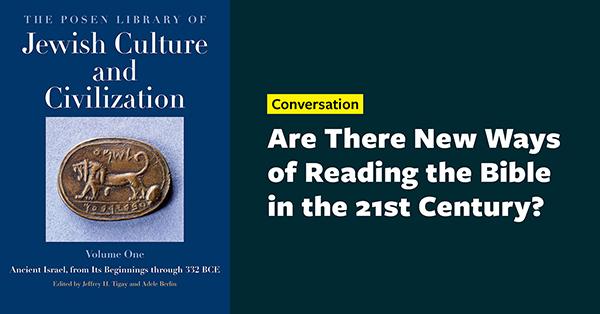
This program will focus on The Posen Library of Jewish Culture and Civilization, Volume 1: Ancient Israel, from Its Beginnings through 332 BCE, edited by Jeffrey H. Tigay and Adele Berlin, and will feature Alison Joseph in conversation with Deborah Dash Moore.
For two thousand years, Jews and Christians have been reading the Hebrew Bible. Are there new ways to read it in the 21st century? To uncover what's new in this ancient document, join the discussion with The Posen Library of Jewish Culture and Civilization Editor and Biblical Scholar Alison Joseph in conversation with Professor Deborah Dash Moore, Editor in Chief of The Posen Library.
What do you learn about the Torah laws when you set them alongside non-biblical legal documents of the period? How does reading Miriam's song next to Deborah's song change how we understand these pieces of poetry? What can artifacts of this period show us about daily life in ancient Israel—its religious practices, household tasks, architecture, and art? Explore how we can read the Bible today in relation to the development of Judaism from ancient times to the present.
About the Speakers:
Alison L. Joseph is Senior Editor of The Posen Library of Jewish Civilization and Culture. She brings her academic expertise in Hebrew Bible and ancient Judaism to the management of the ancient volumes of The Posen Library. Dr. Joseph earned a Ph.D. in Near Eastern Studies from the University of California, Berkeley and a M.A. in Jewish Studies from Emory University. Her first book Portrait of the Kings: The Davidic Prototype in Deuteronomistic Poetics, received the 2016 Manfred Lautenschlaeger Award for Theological Promise. She has previously taught at Swarthmore College, The Jewish Theological Seminary, Towson University, Villanova University, Haverford College, and Ursinus College.
Deborah Dash Moore is the Frederick G. L. Huetwell Professor of History and Judaic Studies at the University of Michigan. An American Jewish historian, her work focuses on urban Jews. She is the editor in chief of The Posen Library of Jewish Culture and Civilization. She also served as co-editor of The Posen Library of Jewish Culture and Civilization, Volume 10: Late Twentieth Century, 1973–2005.
Ticket Info: Pay what you wish; register at programs.cjh.org/tickets/new-in-the-bible-2021-11-04 for a Zoom link
Presented by:


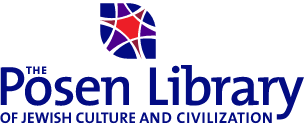

conversation
virtual tour
Tapestry Tour with Ted Comet: An Interactive Virtual Experience
Ted Comet is a New York Jewish community leader and husband of the late artist, psychotherapist, and Holocaust survivor, Shoshana Comet. With no prior art training, Shoshana brought a loom into their home and taught herself the art of weaving as a means of expressing and overcoming the trauma that she experienced during the war. Join Ted for an inspiring virtual tour of Shoshana’s tapestries, as he lovingly recounts the story of her survival and the redemptive power of art.
Ticket Info: Free; register at dorotusa-org.zoom.us for a Zoom link
Presented by:
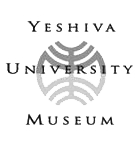

virtual tour
concert
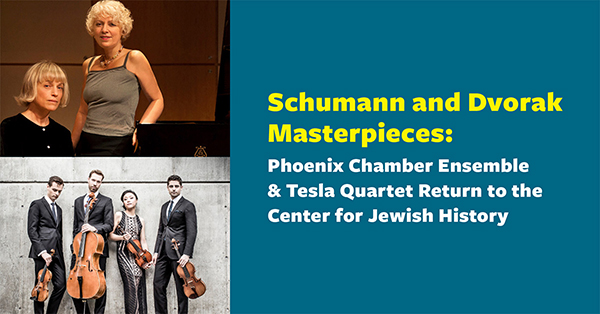
The Phoenix Chamber Ensemble cordially invites you to a performance of two great piano quintets -- Schumann's Piano Quintet Op. 44 and Dvorak's Piano Quintet, Op 81. Pianists Vassa Shevel and Inessa Zaretsky are joined by the Tesla Quartet in this happy comeback to the Center!
Auditorium seating is available for 100. This concert will also be live-streamed for those who cannot attend in person.
To ensure compliance with local health and safety guidelines, proof of full COVID-19 vaccination (at least 14 days after your final vaccine dose) with matching ID is required for all visitors 12 and older. You can provide proof of vaccination by displaying it on your smartphone, by presenting a physical copy, or by using the New York State Excelsior Pass or NYC COVID Safe App (Android | iOS). Other acceptable forms of COVID-19 vaccination proof are the CDC Vaccination Card or NYC Vaccination Record. Mask wearing is mandatory throughout the building.
Ticket Info:
In person: $15 general; $10 members, seniors, students – ADVANCE TICKETS ONLY; NO SALES AT THE DOOR
Reserve In-Person Tickets
On YouTube: Pay what you wish
Reserve YouTube Tickets
Presented by:

concert
lecture
At the Crossroads: Provencal Jewish Culture in the Middle Ages
The medieval Jewish community of Provence sat at the crossroads of Ashkenaz and Sefarad, a meeting place of diverse ideas and a center of innovative thought. Provençal Jews were renowned for their masterpieces of Talmudic learning as well as groundbreaking works of philosophy and science. It was in Provence that the treasures of Judeo-Arabic learning were translated into Hebrew, from which they were handed down to us today. This distinct blend of traditional and worldly knowledge characterized Provence. Its denizens saw themselves as belonging to a unique regional culture and proudly recorded its customs in books of minhagim and its version of the liturgy. With the French expulsions of the fourteenth century, Provençal Jewish culture was dispersed, but it did not come to a halt. Everywhere that members of this community went, they carried with them their distinctive approach to Jewish life, and their influence is felt into modernity.
About the speaker:
Dr. Tamar Marvin is a scholar of medieval Jewish intellectual history and a semikha student at Yeshivat Mahrat. She holds a Ph.D. in Jewish Studies from the Jewish Theological Seminary and a B.A. in Literature and Journalism from New York University. Dr. Marvin has taught and developed curricula in a variety of academic and Jewish settings, including American Jewish University and Hebrew Union College-JIR, Los Angeles. She has published her work in academic journals as well as writing for broader media. Dr. Marvin’s research centers on questions of how medieval Jews reacted to and creatively adapted new forms of meaning-making in the world they encountered around them, including both philosophical reflection and Kabbalistic speculation.
Ticket Info: $10; register at us02web.zoom.usfor a Zoom link
Presented by:

lecture
book talk
The Yiddish Historians and the Struggle for a Jewish History of the Holocaust
Historians began writing the history of the Holocaust in Yiddish from a distinctly Jewish perspective in the years immediately after World War II. These Yiddish historians studied the Holocaust from the perspective of its Jewish victims, rather than that of the Nazi perpetrators, examining daily life in the ghettos and camps, and stressing the importance of survivor testimonies, eyewitness accounts, and memoirs. Above all, they redefined “resistance” to include the many ways Jews struggled to remain alive under Nazi occupation. Mark Smith chronicles and contextualizes this largely overlooked yet significant set of scholars in his recently published work, The Yiddish Historians and the Struggle for a Jewish History of the Holocaust.
Join Mark Smith and Samuel Kassow for this important, eye-opening conversation on Holocaust historiography.
About the Participants
Mark L. Smith is the author of The Yiddish Historians and the Struggle for a Jewish History of the Holocaust (Wayne State University Press, 2019), which was named a National Jewish Book Award finalist and is now in paperback. He has taught Jewish history at UCLA, where he received his PhD in Jewish history in 2016. He writes and lectures on East European Jewish history and culture, with a special interest in Holocaust historiography and Yiddish scholarly writing. His work has also been featured and reviewed in the Yiddish-language Forverts. He is currently Resident Scholar at American Jewish University, Los Angeles.
Samuel D. Kassow is the Charles H. Northam Professor of History at Trinity College, and is recognized as one of the world’s leading scholars on the Holocaust and the Jews of Poland. He is widely known for his 2007 book, Who Will Write Our History? Emanuel Ringelblum, the Warsaw Ghetto, and the Oyneg Shabes Archive (Indiana University Press). He was elected a Fellow of the American Academy for Jewish Research, has won numerous awards, and has lectured widely.
Ticket Info: Free; register at yivo.org/The-Yiddish-Historians for a Zoom link
Presented by:

book talk
book club
LBI Book Club, Vol. XV: The Oppermanns
The three Oppermann brothers and their sister lead comfortable, upper-class lives in Berlin. For a long while, they choose to ignore the rising tide of antisemitism around them. The Oppermanns by Lion Feuchtwanger follows the members of the family from November 1932 until the late summer of 1933, as their bourgeoise existence as owners of a Berlin department store is increasingly threatened and begins to deteriorate. Feuchtwanger's contemporary novel was first printed by the Dutch Querido publishing house in 1933 — at a time when the author had already left Germany to live in exile in Sanary-sur-Mer, France. The Leo Baeck Institute Book Club is pleased to have Professor Peter Jelavich returning to lead us in a discussion of the novel.
About the Author<
Lion Feuchtwanger (1884 – 1958), was born in Munich and raised Jewish. Growing up, his family reportedly placed equal emphasis on the religious rites and traditional aspects of his Jewish heritage as they did on German culture, which they considered themselves to be part of. Feuchtwanger suffered immensely under the Nazi reign of terror himself. After Hitler's seizure of power, copies of his novels were destroyed during the Nazi book burnings in Berlin and elsewhere across Germany on May 10, 1933, as they dealt with themes such as Jewish emancipation. His house and personal estate were also later confiscated.
Feuchtwanger went into exile in France, where he was eventually captured in 1940 after the Nazis invaded the country. He managed to then escape to the United States, where he spent the rest of his life. Feuchtwanger died in Los Angeles in 1958.
Getting the Book
The Oppermanns can be read for free in the Internet Archive here. It is also available on Amazon here.
About our Guest
Peter Jelavich is a Professor of History at the Johns Hopkins University. Previously, Jelavich was professor of history and chair of the Department of Germanic Studies at the University of Texas at Austin. He was a Junior Fellow in the Harvard Society of Fellows (1979-1981) and he received his PhD from Princeton University in 1982. Jelavich specializes in the cultural and intellectual history of Europe since the Enlightenment, with emphasis on Germany. He is the author of Munich and Theatrical Modernism: Politics, Playwriting, and Performance, 1890-1914 (1985), Berlin Cabaret (1993), and Berlin Alexanderplatz: Radio, Film, and the Death of Weimar Culture (2006).
Ticket Info: Free; register at lbi.org for a Zoom link
Presented by:

book club
lecture
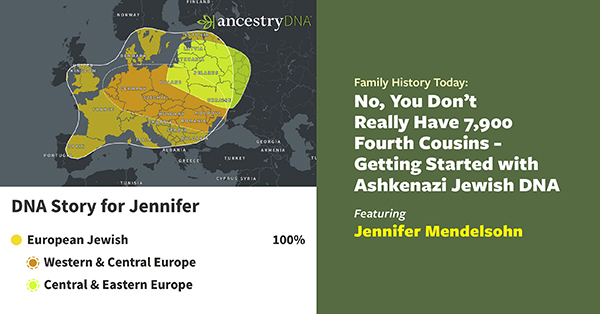
DNA has the potential to be an essential and exciting genealogical tool. But many Eastern European Jewish testers find their DNA results completely overwhelming and unnavigable. In this talk, Jennifer Mendelsohn, an internationally renowned journalist and professional genealogist, will help those with Ashkenazi heritage learn how to make sense of their DNA results. She’ll cover the basics of DNA testing, including why our match lists are so large, (hello, endogamy!) why all our matches seem to match each other (endogamy, again!), and how to spot the meaningful matches and separate them from the faux ones. Using real-life examples of DNA success, you’ll learn techniques that will help you work effectively with DNA to expand your tree.
This program is funded, in part, by public funds from the New York City Department of Cultural Affairs in partnership with the City Council.
Ticket Info: Pay what you wish; register at programs.cjh.org/tickets/family-history-today-2021-10-28 for a Zoom link
Presented by:

lecture
book talk
New Works Wednesdays: Jews and Muslims in Morocco: Their Intersecting Worlds
Join us for a discussion with three researchers featured in the book Jews and Muslims in Morocco: Their Intersecting Worlds.
About the Book
Multiple traditions of Jewish origins in Morocco emphasize the distinctiveness of Moroccan Jewry as indigenous to the area, rooted in its earliest settlements and possessing deep connections and associations with the historic peoples of the region. The creative interaction of Moroccan Jewry with the Arab and Berber cultures was noted in the Jews’ use of Morocco’s multiple languages and dialects, characteristic poetry, and musical works as well as their shared magical rites and popular texts and proverbs. In Jews and Muslims in Morocco: Their Intersecting Worlds historians, anthropologists, musicologists, Rabbinic scholars, Arabists, and linguists analyze this culture, in all its complexity and hybridity. The volume’s collection of essays span political and social interactions throughout history, cultural commonalities, traditions, and halakhic developments. As Jewish life in Morocco has dwindled, much of what is left are traditions maintained in Moroccan ex-pat communities, and memories of those who stayed and those who left. The volume concludes with shared memories from the perspective of a Jewish intellectual from Morocco, a Moroccan Muslim scholar, an analysis of a visual memoir painted by the nineteenth-century artist, Eugène Delacroix, and a photo essay of the vanished world of Jewish life in Morocco.
To purchase the book: Rowman.com/Lexington
About the Speakers
André Elbaz is a professor emeritus of French at Carleton University.
Edwin Seroussi is a professor of musicology and director of the Jewish Music Research Centre at Hebrew University of Jerusalem.
Michal Ben Ya'akov is an associate professor of history at Efrata College of Education.
Ticket Info: Free; register at us02web.zoom.usfor a Zoom link
Presented by:

book talk
lecture & class
Mizrahi Dance Series with Jackie Barzvi
Join the ASF Institute of Jewish Experience and Jackie Barzvi, creator of the Mizrachi Dance Archive, for a three-part series highlighting the history and movements of Mizrahi dance! Jackie will focus on three different Mizrahi styles: Moroccan, Bukharian, and Yemenite dances. Each session will be both a lecture and dance class and participants will learn about the history of each community, gain insight into how dance was included in their traditions, listen to Jewish music from each region, practice traditional movements, and so much more!
The workshops will be held via Zoom and all are welcomed. No previous dance experience required.
About the Speaker:
Jackie Barzvi is a professional raqs sharqi (belly dance) performer and instructor. She recently created the first ever Mizrachi Dance Archive to highlight specific Jewish dances from the Middle East and North African regions. Jackie was also the IACT Israel Programs Coordinator at Northeastern University Hillel in Boston and has led over a dozen organized trips to Israel. Jackie is passionate about helping others find their unique Jewish identity and creating environments where people can dance, connect, and build community. To learn more about her work visit the archive at mizrachidancearchive.com
Ticket Info: $10 per session; register at us02web.zoom.us for a Zoom link
Presented by:

lecture & class
workshop
The World Should Know: First Steps in Writing your Memoir
Each of us has a story to tell, we just need the impetus to get started!
Join award-winning author Gila Green in a hands on workshop to begin writing yours or your family’s story. Writing a memoir is both for you and for future generations.
Begin today!
*Note: this is a 2-hour workshop
About the Speaker:
Canadian author Gila Green is an Israel-based writer, editor, and EFL teacher
Ticket Info: $25; register at us02web.zoom.usfor a Zoom link
Presented by:

workshop
conversation
At Lunch with Josh Seftel
Julie Salamon (Wall Street Journal and NY Times) sits down with Emmy-winning filmmaker Joshua Seftel. He is known for directing the breakthrough series Queer Eye for the Straight Guy, the feature film War, Inc., and as a contributor to CBS Sunday Morning where he often interviews his 84-year-old mother about current events and popular culture. We are thrilled to welcome Joshua to the show and can’t wait to hear about his current projects, the stories he is passionate about, and what it’s like to work with his mom!
Ticket Info: Free; register at ajhs-org.zoom.us for a Zoom link
Presented by:

conversation
book launch
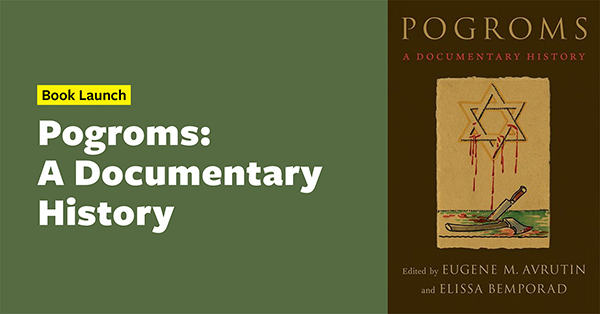
From the 1880s to the 1940s, an upsurge of explosive pogroms caused much pain and suffering across the eastern borderlands of Europe. Rioters attacked Jewish property and caused physical harm to women and children. During World War I and the Russian Civil War, pogrom violence turned into full-blown military actions. In some cases, pogroms wiped entire Jewish communities out of existence. More generally, they were part of a larger story of destruction, ethnic purification, and coexistence that played out in the region over a span of some six decades. Pogroms: A Documentary History surveys the complex history of anti-Jewish violence by bringing together archival and published sources--many appearing for the first time in English translation. This landmark volume and its distinguished roster of scholars provides an unprecedented view of the history of pogroms. Speakers include co-editors Elissa Bemporad(CUNY) and Eugene Avrutin (University of Illinois) as well as Darius Staliunas (Lithuanian Institute of History) and David Myers (UCLA).
About the Speakers:
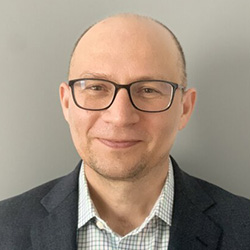 Eugene Avrutin is the Tobor Family Endowed Professor of Modern European Jewish History at the University of Illinois, Urbana-Champaign, USA. He is the author and co-editor of several award-winning books, including Jews and the Imperial State: Identification Politics in Tsarist Russia (2010) and The Velizh Affair: Blood Libel in a Russian Town (2018). His most recent book, Racism in Modern Russia: From the Romanovs to Putin, will be published in the Russian Shorts series by Bloomsbury in 2022.
Eugene Avrutin is the Tobor Family Endowed Professor of Modern European Jewish History at the University of Illinois, Urbana-Champaign, USA. He is the author and co-editor of several award-winning books, including Jews and the Imperial State: Identification Politics in Tsarist Russia (2010) and The Velizh Affair: Blood Libel in a Russian Town (2018). His most recent book, Racism in Modern Russia: From the Romanovs to Putin, will be published in the Russian Shorts series by Bloomsbury in 2022.
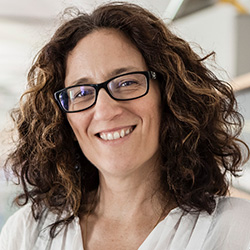 Elissa Bemporad, is Professor of History and Ungar Chair in East European Jewish History and the Holocaust at Queens College and CUNY Graduate Center. She is a two-time winner of the National Jewish Book Award. She is the author of Becoming Soviet Jews: The Bolshevik Experiment in Minsk (2013 IUP), and Legacy of Blood: Jews, Pogroms, and Ritual Murder in the Lands of the Soviets (2019 OxfordUP). Elissa is the co-editor of two volumes: Women and Genocide: Survivors, Victims, Perpetrators (2018 IUP); and Pogroms: A Documentary History (Oxford University Press, 2021). She is currently completing the first volume of the Comprehensive History of Soviet Jews (forthcoming with New York University Press), and at work on a biography of Ester Frumkin. She is co-editor of Jewish Social Studies.
Elissa Bemporad, is Professor of History and Ungar Chair in East European Jewish History and the Holocaust at Queens College and CUNY Graduate Center. She is a two-time winner of the National Jewish Book Award. She is the author of Becoming Soviet Jews: The Bolshevik Experiment in Minsk (2013 IUP), and Legacy of Blood: Jews, Pogroms, and Ritual Murder in the Lands of the Soviets (2019 OxfordUP). Elissa is the co-editor of two volumes: Women and Genocide: Survivors, Victims, Perpetrators (2018 IUP); and Pogroms: A Documentary History (Oxford University Press, 2021). She is currently completing the first volume of the Comprehensive History of Soviet Jews (forthcoming with New York University Press), and at work on a biography of Ester Frumkin. She is co-editor of Jewish Social Studies.
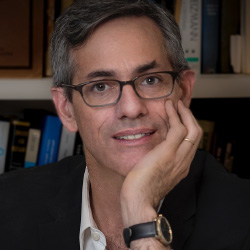 David N. Myers is the Sady and Ludwig Kahn Professor of Jewish History at UCLA, where he serves as the director of the UCLA Luskin Center for History and Policy. He is the author or editor of more than fifteen books in the field of Jewish history, including the forthcoming American Shtetl: The Making of Kiryas Joel, a Hasidic Village in Upstate New York (Princeton) with Nomi Stolzenberg. Myers also serves as President of the New Israel Fund.
David N. Myers is the Sady and Ludwig Kahn Professor of Jewish History at UCLA, where he serves as the director of the UCLA Luskin Center for History and Policy. He is the author or editor of more than fifteen books in the field of Jewish history, including the forthcoming American Shtetl: The Making of Kiryas Joel, a Hasidic Village in Upstate New York (Princeton) with Nomi Stolzenberg. Myers also serves as President of the New Israel Fund.
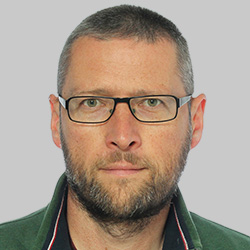 Darius Staliunas is the author of Making Russians. Meaning and Practice of Russification in Lithuania and Belarus after 1863 (Amsterdam/New York, NY: Rodopi, 2007); Enemies for a Day: Antisemitism and Anti-Jewish Violence in Lithuania under the Tsars (Budapest/New York: CEU Press, 2015); and Lithuanian Nationalism and the Vilnius Question, 1883-1940 (Marburg: Herder-Institut, 2015; co-author – Dangiras Maciulis). He is the editor of Lithuanian studies series at Academic Studies Press (Boston, USA). His research interests include issues of Russian confessional policy in the so-called Northwestern Region (Lithuania and Belarus), ethnic conflicts as well as problems of places of memory in East Central Europe.
Darius Staliunas is the author of Making Russians. Meaning and Practice of Russification in Lithuania and Belarus after 1863 (Amsterdam/New York, NY: Rodopi, 2007); Enemies for a Day: Antisemitism and Anti-Jewish Violence in Lithuania under the Tsars (Budapest/New York: CEU Press, 2015); and Lithuanian Nationalism and the Vilnius Question, 1883-1940 (Marburg: Herder-Institut, 2015; co-author – Dangiras Maciulis). He is the editor of Lithuanian studies series at Academic Studies Press (Boston, USA). His research interests include issues of Russian confessional policy in the so-called Northwestern Region (Lithuania and Belarus), ethnic conflicts as well as problems of places of memory in East Central Europe.
Ticket Info: Pay what you wish; register at programs.cjh.org/tickets/pogroms-2021-10-21 for a Zoom link
Presented by:


book launch
book talk
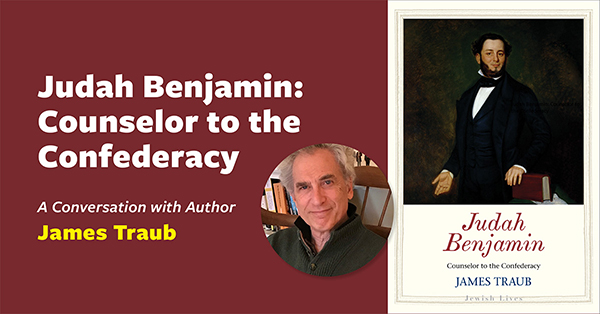
Judah P. Benjamin (1811–1884) was a brilliant and successful lawyer in New Orleans, and one of the first Jewish members of the U.S. Senate. He then served in the Confederacy as secretary of war and secretary of state, becoming the confidant and alter ego of Jefferson Davis. In this new biography in the Jewish Lives series at Yale University Press, journalist and scholar James Traub grapples with the difficult truth that Benjamin, who was considered one of the greatest legal minds in the United States, was a slave owner who deployed his oratorical skills in defense of slavery.
Program registrants will receive a code for 25% off and free shipping on the book.
This program is funded, in part, by public funds from the New York City Department of Cultural Affairs in partnership with the City Council.
Ticket Info: Pay what you wish; register at programs.cjh.org/tickets/judah-benjamin-2021-10-20 for a Zoom link
Presented by:


book talk
sidney krum young artists concert series
10 Hebrew Folk Songs and Folk Dances by Lazare Saminsky - Live on Facebook and YouTube
Join us for a performance of Lazare Saminsky's Ten Hebrew Folk Songs and Folk Dances Op. 22 (c. 1924). This collection of 10 works for solo piano features arrangements of Yiddish and Hebrew folk melodies, wordless nigunim, and instrumental dance melodies.
Born in Vale-Gotzulovo, Ukraine in 1882, Saminsky was one of the earliest members of the Society for Jewish Folk Music in St. Petersburg – a group of composers committed to forging a new national style of Jewish classical music infused with Jewish folk melodies and liturgical music. Saminsky immigrated to the United States in 1920 where he co-founded the League of Composers in 1923, and was the music director of Temple Emanu-El in New York City from 1924-1958. Saminsky’s musical oeuvre represents a broad cross section of Jewish music ranging from sacred to secular.
This collection of 10 pieces will be performed by pianist Thomas Kotcheff.
The Sidney Krum Young Artists Concert Series is made possible by a generous gift from the Estate of Sidney Krum.
Ticket Info: Free; registration required at https://www.yivo.org/Saminsky2021
Presented by:

sidney krum young artists concert series
panel discussion
The Jewish Renaissance in Weimar Germany
As the Shared History Project enters its chapter on the Weimar Republic and the beginning of National Socialism, our panelists will discuss how German-speaking Jews seized on the era of cultural freedom ushered in by the Weimar Republic to rediscover, revitalize, and transform Jewish culture and identity in a modern context. Michael Brenner (American University/Munich), Rachel Seelig (University of Toronto), and Kerry Wallach (Gettysburg College) will discuss how diverse strains of Jewish culture – religious and secular, Zionist and non-Zionist, speaking German, Yiddish, and Hebrew – found expression in arts, literature, society, and politics. Miriam Rürup (Moses Mendelssohn Center Potsdam) will chair.
About the Panelists
Michael Brenner is the Seymour and Lillian Abensohn Chair in Israel Studies at American University and Director of AU’s Center for Israel Studies. Since 1997 he has been Professor of Jewish History and Culture at the Ludwig-Maximilians University of Munich. He is the International President of the Leo Baeck Institute for the Study of German-Jewish History and serves on many academic boards, including the Jewish Museum of Berlin, the Israel Institute, the Center for European Studies of the University of Haifa and is board chair of the Franz Rosenzweig Research Center of the Hebrew University in Jerusalem. His nine books have been translated into ten languages and include The Renaissance of Jewish Culture in Weimar Germany; A Short History of the Jews; and his forthcoming In Hitler’s Munich: Jews, Revolution, and the Rise of Nazism. He is co-author of the four-volume German-Jewish History in Modern Times, for which he was awarded a National Jewish Book Award.
Rachel Seelig is a literary scholar, teacher and writer based in Toronto, Canada. Her research focuses on migration, multilingualism, and cross-cultural exchange in German, Hebrew, and Yiddish literatures. She is the author of Strangers in Berlin: Modern Jewish Literature between East and West, 1919–1933 (University of Michigan Press, 2016) and the co-editor, with Amir Eshel, of The German-Hebrew Dialogue: Studies of Encounter and Exchange (De Gruyter Press, 2017). Rachel received her B.A. in Comparative Literature from Stanford University and her M.A. and Ph.D. in Jewish Studies from the University of Chicago. She has held research and teaching appointments at Harvard University, Columbia University, the University of Michigan, the Hebrew University of Jerusalem, and the University of Toronto. Together with her partner, Erol Boran, she writes children's books.
Kerry Wallach is Associate Professor of German at Gettysburg College. Her research focuses on twentieth-century Germany and German-Jewish culture. She is the author of Passing Illusions: Jewish Visibility in Weimar Germany (University of Michigan Press, 2017). In her courses, students learn about Germans, Jews, gender, sexuality, literature, history, film, art, and visual and consumer culture. Currently, Wallach is completing a book about Jewish artist Rahel Szalit-Marcus. Wallach serves on the editorial board of the German Jewish Cultures book series published by Indiana University Press, and on the Academic Advisory Board of the Leo Baeck Institute – New York | Berlin. At Gettysburg, Professor Wallach is an Affiliate of the Jewish Studies Program and also contributes to the Women, Gender, and Sexuality Studies Program.
About the Chair
Miriam Rürup is the Director of the Moses Mendelssohn Center for European-Jewish Studies. Her research interests include German-Jewish history, contemporary history (especially the history and post-history of National Socialism) as well as migration and gender history. In a current research project, she is dealing with the history of statelessness. Rürup is co-editor of the academic journals WerkstattGeschichte (since 2002), Aschkenas (since 2013) and the Leo Baeck Year Book (since 2014) as well as the online source edition “Key Documents on German-Jewish History.” She is also a member of the Bergen-Belsen International Advisory Board, the Human Rights in the 20th Century Working Group of the Fritz Thyssen Foundation, the Special Commission for the Promotion and Further Development of Memorial Work in Lower Saxony of the Lower Saxony Memorial Foundation and the Scientific Advisory Board of the Minerva Institute for Germans History at Tel Aviv University. Since January 2020 she has been chairwoman of the scientific working group of the Leo Baeck Institute in Germany.
Ticket Info: Free register at eventbrite.com for a Zoom link
Presented by:

panel discussion
virtual tour
Museum Mondays: The Museum for Islamic Art, Jerusalem
Tour the Museum for Islamic Art in Jerusalem from the comfort of your own home with Nachliel Selavan, the Museum Guy.
About your tour guide
Nachliel Selavan created and delivered an integrated learning and museum tour program for both school and adult educational settings at the Metropolitan Museum of Art, and has hosted similar pilot visits to a dozen museums in North America, and a few museums in Europe and in Jerusalem. He also teaches and engages audiences through virtual tours and social media. He has recently completed a year-long Tanach Study podcast called Parasha Study Plus, delivering a weekly episode of Archaeology on the Parasha, and is now on his second podcast and a new video series reviewing every book in Tanach, called Archaeology Snapshot.
The Museum for Islamic Arts: http://www.islamicart.co.il/english/
Ticket Info: $10; register at us02web.zoom.us for a Zoom link
Presented by:

virtual tour
lecture & class
Mizrahi Dance Series with Jackie Barzvi
Join the ASF Institute of Jewish Experience and Jackie Barzvi, creator of the Mizrachi Dance Archive, for a three-part series highlighting the history and movements of Mizrahi dance! Jackie will focus on three different Mizrahi styles: Moroccan, Bukharian, and Yemenite dances. Each session will be both a lecture and dance class and participants will learn about the history of each community, gain insight into how dance was included in their traditions, listen to Jewish music from each region, practice traditional movements, and so much more!
The workshops will be held via Zoom and all are welcomed. No previous dance experience required.
About the Speaker:
Jackie Barzvi is a professional raqs sharqi (belly dance) performer and instructor. She recently created the first ever Mizrachi Dance Archive to highlight specific Jewish dances from the Middle East and North African regions. Jackie was also the IACT Israel Programs Coordinator at Northeastern University Hillel in Boston and has led over a dozen organized trips to Israel. Jackie is passionate about helping others find their unique Jewish identity and creating environments where people can dance, connect, and build community. To learn more about her work visit the archive at mizrachidancearchive.com
Ticket Info: $10 per session; register at us02web.zoom.us for a Zoom link
Presented by:

lecture & class
symposium
Confronting Antisemitism: Activating Archives, Libraries, Museums, and Cultural Institutions in the Fight Against Antisemitism
Confronting Antisemitism’s unprecedented, public, international gathering of cultural leaders, scholars, and experts will offer cutting-edge analysis and strategies; identify a landscape of possible initiatives and actions; and galvanize the community. Distinguished speakers’ insights and experiences will catalyze cultural institutions to take a new, crucial role in empowering members of the public to confront antisemitism and, ultimately, to achieve new understanding.
As trusted public institutions with diverse audiences, how can archives, libraries, museums, and cultural institutions use their unique strengths to combat antisemitism and create lasting change? This critical question will be at the core of the Confronting Antisemitism symposium.
Symposium topics range from museum perspectives on modern-day antisemitism, Holocaust denial and revisionism in public institutions to examining the sources of antisemitism and the dangers it poses to a free society. Nearly 20 experts from universities, archives, libraries, and museums around the world will participate in the symposium and help encourage a global conversation about the impact and lasting relevance of antisemitism.
Click here for a schedule, list of speakers and tickets to the Zoom symposium
Presented by:


symposium
yiddish club
YIVO Yiddish Club: Ashkenazi Yiddish Humor Today With Yidlife Crisis
Nu, vilst redn a bisele yidish? An event for Yiddish enthusiasts the world over, the YIVO Yiddish club is an informal monthly gathering to celebrate mame-loshn. Hosted by Shane Baker, sessions take place in English, and are liberally peppered with Yiddish. Each month Baker is joined by a different guest who discusses their work and a related Yiddish cultural theme. In the spirit of a club, sessions are held as interactive zoom meetings in which participants can see and hear one another. Each session includes ample time for audience questions, group discussion, and, time permitting, knock-down, drag-out arguments. Attendees need not know any Yiddish to attend, though some familiarity with the language is highly recommended.
This session features co-stars of the Yiddish-language comedy web series YidLife Crisis, Eli Batalion and Jamie Elman. Paying homage to the yiddishkayt of their upbringing, YidLife Crisis is a love letter about modern Jewish identity and has been viewed over 3 million times.
Ticket Info: Free; register at yivo.org/YiddishClub7 for a Zoom link
Presented by:

yiddish club
book talk
New Works Wednesdays: Reappraising the History of the Jews in the Netherlands
About the Book
The two decades since the last authoritative general history of Dutch Jews was published have seen such substantial developments in historical understanding that a new assessment has become an imperative. This volume offers an indispensable survey from a contemporary viewpoint that reflects the new preoccupations of European historiography and allows the history of Dutch Jewry to be more integrated with that of other European Jewish histories. Historians from both older and newer generations shed significant light on all eras, providing fresh detail that reflects changed emphases and perspectives.
In addition to such traditional subjects as the Jewish community's relationship with the wider society and its internal structure, its leaders, and its international affiliations, new topics explored include the socio-economic aspects of Dutch Jewish life seen in the context of the integration of minorities more widely; a reassessment of the Holocaust years and consideration of the place of Holocaust memorialization in community life; and the impact of multiculturalist currents on Jews and Jewish politics. Memory studies, diaspora studies, and postcolonial studies all play their part in providing the fullest possible picture.
Available at liverpooluniversitypress.co.uk
About the Editors
Bart T. Wallet is Professor of Jewish History at the University of Amsterdam.
David J. Wertheim is the director of the Menasseh ben Israel Institute for Jewish Social and Cultural Studies, Amsterdam.
Ticket Info: Free; register at us02web.zoom.usfor a Zoom link
Presented by:

book talk
lecture
The Business of Jewish History
Join us to mark the launch of the LBI's newest virtual exhibition, Business of Emancipation, with a lecture from Jonathan Zatlin.
Jonathan Zatlin's lecture will employ the history of the Wickrather Lederfabrik AG to tell the story of German-Jewish entrepreneurship between 1855 and 1955. The Wickrather’s history began as a rags-to-riches story. The gradual relaxation of legal restrictions on Jewish commercial activity during the nineteenth century made it possible for Zacharias Spier, a journeyman tanner, to transform a small tannery outside of Mönchengladbach into one of Germany’s leading exporters of quality leather goods. Despite racially inflected conflicts with municipal authorities, labor tensions, the disruptions of the First World War, and the economic chaos of the Weimar Republic, the firm continued to prosper under the stewardship of Zacharias’s sons.
All of this changed after 1933, however, as it did for all German Jewish commercial activity. The Spiers were arrested by the Gestapo in 1936 and forced to surrender ownership of the firm; the family members who had fled to the Netherlands together with those remaining in Germany were deported to various concentration camps, where most were murdered. But if the Spier family’s fate is similar to that which befell so many German Jews, the postwar restitution of their company is remarkable for its singularity. Where most German Jews who survived the dictatorship spent years seeking the restitution of their businesses, often in vain, the Spier family recovered their company without delays, conditions, or even lawyers – thanks to Friedrich Carl von Oppenheim of the Bankhaus Sal. Oppenheim, jr.
About the Speaker
Jonathan Zatlin came to BU in 2002, where he has been an active teacher and scholar. He has written widely on the history of German communism, from Marxist economic theory, Soviet-style economic planning, socialist consumer policy, the East German automobile industry, and the treatment of women to popular opinion under communism, the East German secret police, racism in Soviet-style regimes, and the politics of German unification. Zatlin is the author of The Currency of Socialism: Money and Political Culture in East Germany (Cambridge University Press, 2007), which was named a finalist for the President’s Book Award of the Social Science History Association in 2006, and co-edited Selling Modernity: German Advertising in the Twentieth Century (Duke University Press, 2007) with Pamela E. Swett and S. Jonathan Wiesen.
Zatlin’s current research investigates the link between race and economy in modern European history, focusing on the experience of German Jews. He is completing a book entitled Fantasies of Jewish Wealth in Germany, 1790-1990 (under contract with Chicago University Press), which analyzes how economic racism inspires violent assaults on the rights of ownership and citizenship. It aims to provide an alternative account of the Jewish experience in German history by focusing on the economy as a field for the production of violent fantasies about Jews. Through a series of interconnected case studies, it demonstrates that these fantasies did not simply emerge out of an opposition to material reality, but increasingly shaped both economic practice and symbolic understanding of that practice.
Ticket Info: Free register at eventbrite.com for a Zoom link
Presented by:

lecture
panel discussion
European Jews in the 21st Century
What is the status of Jews in Europe in the 21st century? How do they maintain vital communities? Do they desire to remain in Europe? To remain Jewish? Where are the trendlines headed? A mere 0.1% of Europe's population is Jewish. Proportionally, this figure is at its lowest since the turn of the first millennium. European Jews' numbers have continued to decline even after the Holocaust. Once a major center of world Jewry, Europe often goes largely unmentioned in conversations about the global Jewish community.
K., the European Jewish Review, is a new magazine founded in March 2021 to document and analyze the current situation of the 1.3 million Jews living in Europe. The magazine is devoted to reporting from and fostering dialogue across all the various communities of European Jewry.
Daniel Solomon, the English-language editor of K. will lead a discussion with members of the editorial board of K.: Stéphane Bou (Editor of chief of K., European Jewish Review), Bruno Karsenti (Distinguished Professor, EHESS), and Danny Trom (Senior Researcher, EHESS). The conversation will focus on issues that loom over the Jewish future in Europe, including antisemitism, immigration and integration.
About the Participants
Stéphane Bou is a veteran of the French media, having served as the oped editor of the magazine Marianne, reporter for Charlie Hebdo, reviewer for the Le Canard Enchaîné and a senior producer for Radio France. Bou, in addition to serving as editor-in-chief of K., now leads journalism seminars at École Normale Supérieure/Paris Saclay and France’s national audiovisual archive. He has directed several national television documentaries in Russia, and co-written books with Saul Friedlander and Elisabeth de Fontenay.
Bruno Karsenti is distinguished professor and former vice-president of the École des Hautes Études en Sciences Sociales. He has published research on Emile Durkheim and Marcel Mauss. His most recent volume is La question juive des modernes. Philosophie de l'émancipation.
Daniel Solomon, senior editor of K., runs the magazine’s English-language edition. He is a doctoral student in history at the University of California-Berkeley and received his bachelor’s degree from Harvard. He is a former reporter at the Forward. His studies center on French and European Jews.
Danny Trom is a senior researcher for France’s Centre National de la Recherche Scientifique based at Paris’ École des Hautes Études en Sciences Sociales. Trom, a sociologist, has published influential works on the current state of the French Jewish community, including La France sans les Juifs et La perseverance du fait Juif. He is a frequent commentator in the French press, appearing in such outlets as France Culture and Le Figaro.
Ticket Info: Free; register at yivo.org/21st-Century-Europe for a Zoom link
Presented by:

panel discussion
lecture & class
Mizrahi Dance Series with Jackie Barzvi
Join the ASF Institute of Jewish Experience and Jackie Barzvi, creator of the Mizrachi Dance Archive, for a three-part series highlighting the history and movements of Mizrahi dance! Jackie will focus on three different Mizrahi styles: Moroccan, Bukharian, and Yemenite dances. Each session will be both a lecture and dance class and participants will learn about the history of each community, gain insight into how dance was included in their traditions, listen to Jewish music from each region, practice traditional movements, and so much more!
The workshops will be held via Zoom and all are welcomed. No previous dance experience required.
About the Speaker:
Jackie Barzvi is a professional raqs sharqi (belly dance) performer and instructor. She recently created the first ever Mizrachi Dance Archive to highlight specific Jewish dances from the Middle East and North African regions. Jackie was also the IACT Israel Programs Coordinator at Northeastern University Hillel in Boston and has led over a dozen organized trips to Israel. Jackie is passionate about helping others find their unique Jewish identity and creating environments where people can dance, connect, and build community. To learn more about her work visit the archive at mizrachidancearchive.com
Ticket Info: $10 per session; register at us02web.zoom.us for a Zoom link
Presented by:

lecture & class
book talk
Sholem Aleichem Rediscovered: the Newly Translated Moshkeleh Ganev
Sholem Aleichem's Moshkeleh Ganev was a first for Yiddish literature in featuring as its hero a rowdy, uneducated horse thief. The novel is unique for its focus on the underclass and portrayal of Jews interacting with non-Jews in the Russian Pale of Settlement. Breaking norms, it centers on characters on the fringe of respectability.
Originally written in 1903 and published three times, in Poland and in the Soviet Union in the first half of the 20th century, the novel was for some unknown reason not included in Sholem Aleichem’s collected works. Upon encountering the forgotten novel a few years ago, the lauded Sholem Aleichem translator Curt Leviant has brought the text into the light with its first translation into English.
Join Curt Leviant, in conversation with Dvora Reich, about Sholem Aleichem and this newly re-discovered novel.
Buy the book.
Save 40% with code 6AS21 (United States and Canada only. To order outside of North America, call Combined Academic Publishers in the United Kingdom at +44 (0)1423 526350 and use the discount code CS40UNP.)
About the Author
Besides Moshkeleh the Thief, Curt Leviant has translated five other collections of Sholom Aleichem’s works. Among his fifteen volumes of translations from the Yiddish are novels by Chaim Grade, a memoir by Isaac Bashevis Singer, and collections of stories by Avraham Reisen and Lamed Shapiro.
Some of Leviant’s 12 novels have been published in nine European languages, in Israel, and in South America. His novel, Diary of an Adulterous Woman, was an international best seller and was cited in France in 2008 as one of the “Seven Best Novels of the Year”.
His most recent novels are the critically acclaimed King of Yiddish and Kafka’s Son. Critics have hailed the French translation of Kafka’s Son and called Leviant “a worthy heir to Kafka.” A Turkish version appeared in 2020.
A new novel, a love story set in the Jewish Ghetto of Venice, is titled, Me, Mo, Ma, Mu & Mod; or, Which Will It Be, Me and Mazal or Gilah and Me? will appear in Fall, 2021.
Curt Leviant’s books have been praised by two Nobel Laureates, Saul Bellow and Elie Wiesel, and critics have compared his imaginative fiction to that of Tolstoy, Flaubert, Italo Calvino, Borges and Kafka.
Ticket Info: Free; register at yivo.org/Moshkeleh-Ganev for a Zoom link
Presented by:

book talk
book talk
New Works Wednesdays: Jews and Muslims in Morocco: Their Intersecting Worlds
Join Professor Jane S. Gerber and Dr. Noam Sienna as they discuss their research from the new bookJews and Muslims in Morocco: Their Intersecting Worlds.
Multiple traditions of Jewish origins in Morocco emphasize the distinctiveness of Moroccan Jewry as indigenous to the area, rooted in its earliest settlements and possessing deep connections and associations with the historic peoples of the region. The creative interaction of Moroccan Jewry with the Arab and Berber cultures was noted in the Jews’ use of Morocco’s multiple languages and dialects, characteristic poetry, and musical works as well as their shared magical rites and popular texts and proverbs. In Jews and Muslims in Morocco: Their Intersecting Worlds historians, anthropologists, musicologists, Rabbinic scholars, Arabists, and linguists analyze this culture, in all its complexity and hybridity. The volume’s collection of essays span political and social interactions throughout history, cultural commonalities, traditions, and halakhic developments. As Jewish life in Morocco has dwindled, much of what is left are traditions maintained in Moroccan ex-pat communities, and memories of those who stayed and those who left. The volume concludes with shared memories from the perspective of a Jewish intellectual from Morocco, a Moroccan Muslim scholar, an analysis of a visual memoir painted by the nineteenth-century artist, Eugène Delacroix, and a photo essay of the vanished world of Jewish life in Morocco.
To purchase the book: https://Rowman.com/Lexington
About the Speakers:
Jane S. Gerber is Professor Emerita of History and director of the Institute for Sephardic Studies at the Graduate Center of the City University of New York.
Dr. Noam Sienna is a scholar of Jewish culture and history, a Jewish educator, and a Hebrew calligrapher and book artist.
Ticket Info: Free; register at us02web.zoom.usfor a Zoom link
Presented by:

book talk
class
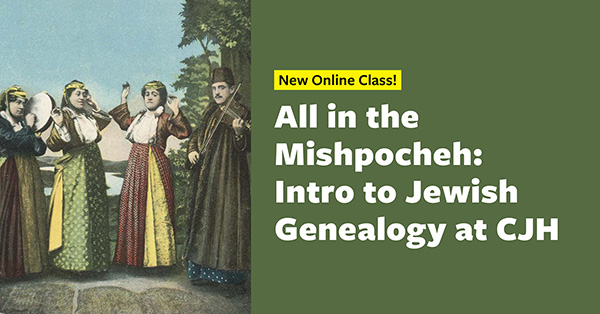
10 classes: Wednesdays, October 6, 13, 20, 27; November 3, 10, 17; December 1, 8 & 15 - 4:30-5:45 pm ET
Ready to take a deep dive into your family history? Join the staff of the Center for Jewish History for this 10-week online genealogy course, suitable for beginner and intermediate researchers. You will benefit from the expertise of our genealogy librarians and enjoy access to digitized archival material found in the collections of our onsite partner organizations, which include the YIVO Institute for Jewish Research, American Jewish Historical Society, Leo Baeck Institute, and American Sephardi Federation. This course will be relevant and applicable to all areas of the Jewish diaspora—Sephardi, Mizrahi, and Ashkenazi—and will touch on numerous topics, including family tree building, DNA and endogamy, search strategies, common genealogy myths, Holocaust records, Landsmanshaftn, Jewish orphanages, and much more, with a particular focus on collections housed at the Center. By the end of the 10 weeks, you will have compiled a basic family history portfolio and will be equipped with a strong foundation for further explorations.
This class is sold out.
Presented by:

class
lecture
Translating History Through Poetry: The Mexican Inquisition & Crypto-Jewish Memory
Rachel Kaufman's first poetry collection, Many to Remember (Dos Madres Press, 2021), enters the archive’s unconscious to reveal the melodies hidden within the language of the past. The collection unravels Kaufman's historical research on New Mexican crypto-Judaism and the Mexican Inquisition alongside the poet’s own family histories. This presentation will explore questions of history, memory, mythology, and translation. How can poetry translate history and the rhythms and form of the archive? What are the possibilities and limitations of the poetic line in holding overlapping but distinct histories at once?
About the Speaker:
Rachel Kaufman is currently pursuing a PhD in Latin American and Jewish History at UCLA. Her poetry has appeared on poets.org and in the Harvard Review, Southwestern American Literature, Western Humanities Review, JuxtaProse, and elsewhere, and her prose has appeared in The Yale Historical Review and Rethinking History. Her poetry chapbook, And After the Fire, received the 2020 JuxtaProse Chapbook Prize. She received a BA in English and History from Yale University.
Ticket Info: Free; register at ajhs-org.zoom.us for a Zoom link
Presented by:

lecture
conversation
At Lunch with Gemma Birnbaum
Author and journalist Julie Salamon (Wall Street Journal and NY Times) sits down with Gemma Birnbaum, the new Executive Director of AJHS. To kick off season 2 of our popular interview series, we thought it would be the perfect opportunity for our community to get to know Gemma! Join us to hear from her about growing up in Queens, her work at the The National WWII Museum in New Orleans, what it was like to produce a hit podcast series at the height of the pandemic, her vision for AJHS, and her puppy Boggle.
Ticket Info: Free; register at ajhs-org.zoom.us for a Zoom link
Presented by:

conversation
book club
LBI Book Club, Vol. XIV: Yellow Street
Set in Vienna in the 1930s, Yellow Street is a novel in “five scenes” that captures the despair, poverty, enforced idleness, and crumbling moral values of those years just before the political catastrophes that led to World War II. With an astute eye for irony and a sardonic humor, Veza Canetti weaves together stories about the people of Yellow Street, the home of the leather-merchants in the Leopoldstadt district. Living cheek by jowl on the bustling thoroughfare, crabbed merchants, impoverished bourgeois, canny profiteers, and out-and-out criminals alike find no privacy respected and no secrets possible. Canetti’s concern, however, is the victims–in the main seemingly helpless women and children, perhaps poor and exploited but grown streetwise and cagey, each protecting a core of integrity and dignity.
About the Author
Veza Canetti, born Venetiana Tauber-Calderon, was born in Vienna in 1897 to a Sephardi mother and Jewish-Hungarian father. Following World War I, she worked as an English teacher until meeting her future husband, the writer Elias Canetti. She served as his muse and his literary assistant, while also writing and translating, frequently under the name Vera Magd. She died in London in May 1963.
Getting the Book
Yellow Street is available here or here.
About our Guest
Ruth Franklin is a book critic and former editor at The New Republic. Her first biography, Shirley Jackson: A Rather Haunted Life (Liveright/W.W. Norton, 2016) won the National Book Critics Circle Award for Biography and was named a New York Times Notable Book of 2016, a Time magazine top nonfiction book of 2016, and a “best book of 2016” by The Boston Globe, the San Francisco Chronicle, NPR, and others. In The Washington Post, Elaine Showalter called it “a sympathetic and masterful biography that both uncovers Jackson’s secret and haunting life and repositions her as a major artist.”
Franklin’s work appears in many publications, including The New Yorker, The New York Times Book Review, The New York Review of Books, and Harper’s. She is the recipient of a Guggenheim Fellowship in biography, a Cullman Fellowship at the New York Public Library, a Leon Levy Fellowship in biography, and the Roger Shattuck Prize for Criticism. Her first book, A Thousand Darknesses: Lies and Truth in Holocaust Fiction (Oxford University Press, 2011), was a finalist for the Sami Rohr Prize for Jewish Literature. She lives in Brooklyn, New York.
Ticket Info: Free; register at eventbrite.com for a Zoom link
Presented by:

book club
book talk
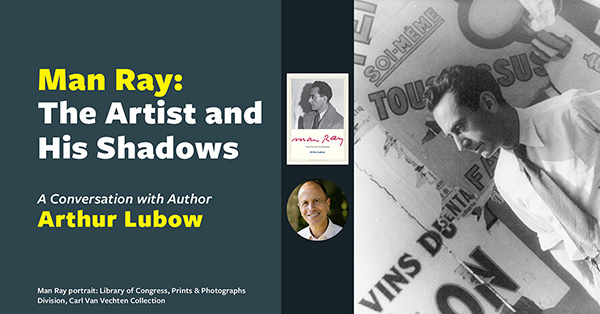
Man Ray (1890–1976), a founding father of Dada and a key player in French Surrealism, is one of the central artists of the 20th century. He is also one of the most elusive. In this new biography in the Jewish Lives series at Yale University Press, journalist and critic Arthur Lubow uses Man Ray’s Jewish background as one filter to understand his life and art. How did this son of Russian Jewish immigrants become one of the most radically original maverick artists of his time?
Program registrants will receive a code for 25% off and free shipping on the book.
This program is funded, in part, by public funds from the New York City Department of Cultural Affairs in partnership with the City Council.
Ticket Info: Pay what you wish; register at programs.cjh.org/tickets/man-ray-2021-09-23 for a Zoom link
Presented by:

book talk
commemoration
Nusakh Vilne Memorial
The annual Nusakh Vilna event commemorates the Jewish community of Vilna through poetry and music. 2021’s commemoration features a remembrance of Chayele Palevesky and a conversation reflecting on the overlooked agency of women as resistance fighters with a particular focus on Vilna and its Jewish and political culture. Chaired by Elye Palevsky, the conversation will be moderated by YIVO's Academic Advisor Eddy Portnoy and will also feature Judy Batalion, author of The Light of Days: The Untold Story of Women Resistance Fighters in Hitler's Ghettos, and Rivka Augenfeld.
Ticket Info: Free; registration required at yivo.org/NusakhVilne2021
Presented by:

commemoration
lecture
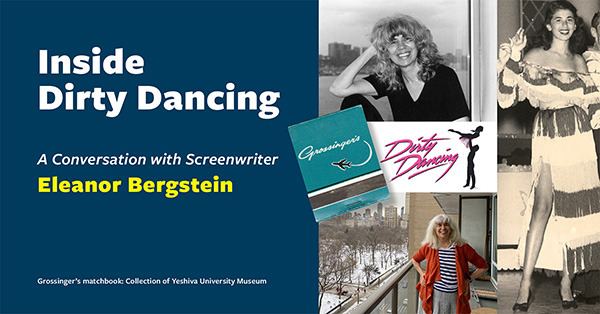
Eleanor Bergstein was a teenage mambo queen whose family summers at Grossinger’s inspired her screenplay for Dirty Dancing, the 1987 film set in a Catskills resort in the summer of 1963. The first film to sell more than a million copies on home video and the source of two multi-platinum albums, Dirty Dancing is beloved by multiple generations of fans, and still resonates with contemporary audiences some 34 years later. Eleanor Bergstein will share stories from her life and behind-the-scenes anecdotes from the creation of the film and stage musical, as well as insights into Dirty Dancing’s enduring popularity.
This program is funded, in part, by public funds from the New York City Department of Cultural Affairs in partnership with the City Council.
Ticket Info: Pay what you wish; register at programs.cjh.org/tickets/inside-dirtydancing-2021-09-14 for a Zoom link
Presented by:

lecture
panel discussion
The Jewish Press Today
Join us for a conversation with editors of today's major American Jewish publications about the role they play in the Jewish world. Moderated by Gal Beckerman (The New York Times Book Review) this panel will feature Alana Newhouse (Tablet Magazine), Jodi Rudoren (The Forward), and Philissa Cramer (Jewish Telegraphic Agency). This panel will explore questions including: Now that American Jews have so clearly assimilated into American society what is the need for a Jewish press? What audience do the editors of these publications target? How do they serve the American Jewish community as it grows diverse and diffuse?
Ticket Info: Free; register at yivo.org/The-Jewish-Press-Today for a Zoom link
Presented by:


panel discussion
yiddish club
YIVO Yiddish Club: Ashkenazi High Holiday Foods With Liz Alpern and Jeffrey Yoskowitz
Nu, vilst redn a bisele yidish? An event for Yiddish enthusiasts the world over, the YIVO Yiddish club is an informal monthly gathering to celebrate mame-loshn. Hosted by Shane Baker, sessions take place in English, and are liberally peppered with Yiddish. Each month Baker is joined by a different guest who discusses their work and a related Yiddish cultural theme. In the spirit of a club, sessions are held as interactive zoom meetings in which participants can see and hear one another. Each session includes ample time for audience questions, group discussion, and, time permitting, knock-down, drag-out arguments. Attendees need not know any Yiddish to attend, though some familiarity with the language is highly recommended.
This session features co-founders of the Gefilteria Liz Alpern and Jeffrey Yoskowitz for a delectable discussion on Ashkenazi dishes traditionally eaten around the Jewish High Holidays.
Alpern and Yoskowitz will bring honik-lekekh (honey cake) and tsimes. While optional, all attendees are invited to bring their own favorite holiday dish to the Zoom meeting to show off and eat. Some interested attendees will be chosen at random to unmute and share their own stories about the dishes they have brought.
Ticket Info: Free; register at yivo.org/YiddishClub6 for a Zoom link
Presented by:

yiddish club
cooking show
Sephardic Culinary History with Chef and Scholar Hélène Jawhara-Piñer
Episode 12: Fruits and Spiced Round Challah for Rosh Hashana
Final episode of the show – get ready to cook Sephardic history! Sephardi Culinary History is a show that combines chef and scholar Hélène Jawhara-Piñer’s fascination with food studies and flair for creating delicious cuisine. Join along as she cooks Sephardic history! ASF Broome & Allen Fellow Piñerearned her Ph.D in History, Medieval History, and the History of Food from the University of Tours, France.
Ticket Info: Free; register at us02web.zoom.us for a Zoom link
Presented by:

cooking show
book club
LBI Book Club, Vol. XIII: The Golem
First published in serial form in 1914 in the periodical Die Weißen Blätter, The Golem was published in book form in 1915 by Kurt Wolff, Leipzig. The novel centers on the life of Athanasius Pernath, a jeweler and art restorer who lives in the ghetto of Prague. But his story is experienced by an anonymous narrator, who, during a visionary dream, assumes Pernath's identity—but as he thirty years before. This dream was perhaps induced because he inadvertently swapped his hat with the real (older) Pernath's. While the novel is generally focused on Pernath's own musings and adventures, it also chronicles the lives, the characters, and the interactions of his friends and neighbors. The Golem, though rarely seen, is central to the novel as a representative of the ghetto's own spirit and consciousness, brought to life by the suffering and misery that its inhabitants have endured over the centuries. Through the novel, the narrator's own mental health and memories come into question. If you are a fan of the dark, atmospheric works of Kafka or Poe, The Golem is likely for you!
About Gustav Meyrink
Gustav Meyrink (1868 - 1932) was the pen name of Gustav Meyer. An Austrian author, novelist, dramatist, translator, and banker, he is most famous for his novel The Golem. He has been described as the "most respected German language writer in the field of supernatural fiction". He studied theosophy, Kabbala, Christian Sophiology and Eastern mysticism. Until his death Meyrink practiced yoga and meditation. Results of these studies and practices are found in Meyrink's works, which almost always deal with various occult traditions. He was also a member of the Hermetic Order of the Golden Dawn, a spirituality and occult movement, in London. Fired from his job in banking after it was discovered he was consulting the spirit world to make financial decisions, he moved full time into translating and writing—The Golem came out only a few years after he was arrested and imprisoned for his behavior at the bank. During his life Meyrink lived in a number of places in German-speaking Europe, most notably spending 20 years in Prague. In 1927 he converted to Buddhism. Meyrink was not Jewish, but was assumed to be so by many of his readers and even close associates. During the Nazi period his work was banned as being "Jewish" or "Jewish influenced."
Ticket Info: Free; register at eventbrite.com for a Zoom link
Presented by:

book club
book talk
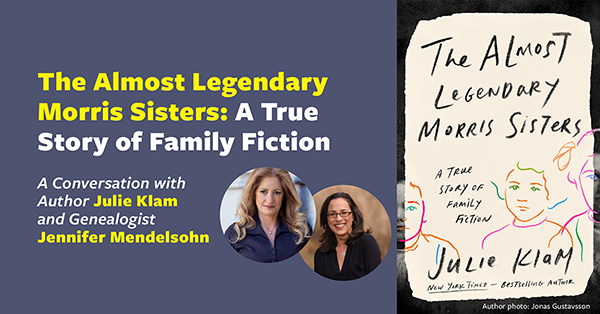
Ever since she was young, author Julie Klam has been fascinated by the Morris sisters, cousins of her grandmother. According to family lore, early in the 20th century the sisters' parents moved the family from Eastern Europe to Los Angeles so their father could become a movie director. On the way, their pregnant mother went into labor in St. Louis, where the baby was born and where their mother died. The father left the children in an orphanage and promised to send for them when he settled in California--a promise he never kept. One of the Morris sisters later became a successful Wall Street trader and advised Franklin Roosevelt. The sisters lived together in New York City, none of them married or had children, and one even had an affair with J. P. Morgan.
The stories of these independent women intrigued Klam, but as she delved into them to learn more, she realized that the tales were almost completely untrue. The Almost Legendary Morris Sisters is the revealing account of what Klam discovered about her family--and herself--as she dug into the past. Part memoir and part confessional and told with the wit and honesty that are hallmarks of Klam's books, The Almost Legendary Morris Sisters is the fascinating and funny true story of one writer's journey into her family's past, the truths she brings to light, and what she learns about herself along the way.
Julie will be in conversation with journalist and Jewish genealogist Jennifer Mendelsohn, founder of #resistancegenealogy, a project that uses genealogical and historical records to fight disinformation and honor America's immigrant past.
Co-sponsored by Shakespeare & Co. Booksellers. Pre-order the book here and get a copy signed by the author.
This program is funded, in part, by public funds from the New York City Department of Cultural Affairs in partnership with the City Council.
Ticket Info: Pay what you wish; register at programs.cjh.org/tickets/almost-legendary-2021-08-18 for a Zoom link
Presented by:

book talk
lecture
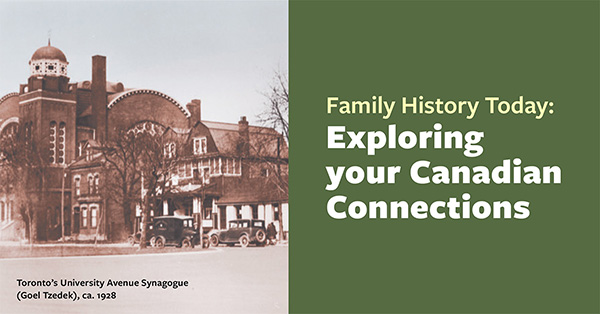
Did your ancestors pass through Canada on their way to the U.S., or did a branch of your family settle in Canada? It’s fairly common for American Jews to have some Canadian connections in their family. Bill Gladstone, a professional genealogist, publisher, and author based in Toronto, will provide an overview of major resources for Jewish genealogy research in Canada, including censuses, naturalizations, immigration records, border crossings, and city directories.
This program is sponsored by the Ackman & Ziff Family Genealogy Institute at the Center for Jewish History. It is funded, in part, by public funds from the New York City Department of Cultural Affairs in partnership with the City Council.
Ticket Info: Pay what you wish; register at programs.cjh.org/tickets/family-history-today-2021-08-12 for a Zoom link
Presented by:

lecture
book talk
Once We Were Slaves: The Extraordinary Story of a Multiracial Jewish Family
Author Laura Arnold Leibman discusses her new book with Gender and Jewish Studies Professor Samira K. Mehta.
An obsessive genealogist and descendent of one of the most prominent Jewish families since the American Revolution, Blanche Moses firmly believed her maternal ancestors were Sephardic grandees. Yet she found herself at a dead end when it came to her grandmother's maternal line. Using family heirlooms to unlock the mystery of Moses's ancestors, Once We Were Slaves overturns the reclusive heiress's assumptions about her family history to reveal that her grandmother and great-uncle, Sarah and Isaac Brandon, actually began their lives as poor Christian slaves in Barbados. Tracing the siblings' extraordinary journey throughout the Atlantic World, Leibman examines artifacts they left behind in Barbados, Suriname, London, Philadelphia, and, finally, New York, to show how Sarah and Isaac were able to transform themselves and their lives, becoming free, wealthy, Jewish, and--at times--white. While their affluence made them unusual, their story mirrors that of the largely forgotten population of mixed African and Jewish ancestry that constituted as much as ten percent of the Jewish communities in which the siblings lived, and sheds new light on the fluidity of race--as well as on the role of religion in racial shift--in the first half of the nineteenth century.
Ticket Info: Free; register at forms.office.com for a Zoom link
Presented by:

book talk
book club
LBI Book Club, Vol. XII: Job by Joseph Roth
Job: The Story of a Simple Man was published in 1930. The novel tells the story of an orthodox Jew shoe faith is challenged after a series of misfortunes that result in him immigrating from Tsarist Russia to New York City's Lower East Side. Harriet Porter of The Guardian reviewed the book in 2000: "Roth captures essential truths about faith, hope and despair within his reworking of a Biblical story. His writing is rich without being dense, and has a fable-like directness."
Joseph Roth is one of the best-known of European Jewish novelists. Originally from Brody in Austrian Galicia, he lived in Vienna, Berlin, and Paris working largely as a newspaper columnist and correspondent. His work Radetzky March is considered by many to be a classic of 20th century literature. A common theme in his work is the passing of the "old world" and the danger of the political and social forces that emerge following the First World War. In 1933 he moved to Paris as a refugee from the Nazi regime. Roth died in Paris of poor health related to alcoholism six years later, in 1939. The Leo Baeck Institute is pleased to hold a large body of original, handwritten manuscripts and personal photographs kept by the author, now found in our archives.
Guest
Joining us for this session is Keiron Pim, British journalist and author, whose much-anticipated biography of Joseph Roth will be published by Granta books in 2022. A writer on a wide-variety of subjects, from pop culture history to medieval Hebrew Poetry, his book Jumpin’ Jack Flash: David Litvinoff and the Rock’n’Roll Underworld, was named the best debut biography of 2016 in the Guardian. You can learn more about Keiron Pim and his other work on his website here.
Where to Purchase the Book
You can purchase the book here. You may read whichever translation works best/most accessible to you.
You can prepare in advance by listening to Keiron Pim discussing Roth’s novel Job: the Story of a Simple Man and other Roth works in an online panel discussion here.
Ticket Info: Free; register at eventbrite.com for a Zoom link
Presented by:

book club
lecture
Enroll Your Children in a Secular Jewish School! The New Jewish School and Its Role in Educating a New Generation of Jews in Poland
This lecture will be delivered in Yiddish.
One hundred years ago, the Central Jewish School Organization (TSYSHO) was established in Warsaw, uniting a number of secular Jewish schools and using Yiddish as its language of instruction. A compromise made between different school and community activists associated with various political parties, mostly the Bund, the Left Poale Zion, the Folkspartei and the supporters of democratic school, they shared the same dream – to create a unified, secular school where children from the Yidishe gas, or the Jewish Street, would receive instruction in their native language. The creation of TSYSHO was only the beginning. But the new school organization lacked everything it needed: educated teachers, premises, textbooks and pedagogical literature, even the educational vocabulary required to teach particular subjects in Yiddish. It also had no money and did not even have the right to exist. All of the above had to be fought for, and this was the role of TsYSHO, and precisely what the party's activists did during the nearly twenty years of its existence in Poland.
Only a small percentage of Jewish children in Poland attended the TSYSHO schools. But should one believe the numbers? Many children in eastern Poland were students at a secular Jewish school and described it as their second home. It was there that they first became acquainted with secular subjects, secular literature and culture, Jewish history and the natural environment surrounding them. They learned to discuss all manner of things and make decisions on their own. They also discovered and developed their skills and abilities, for example, by preparing exhibits for three large school exhibitions devoted to the life and work of Mendele-Moykher Sforim (1936), Sholem Aleykhem (1937) and Jews in Poland (1939).
What was so special about TSYSHO schools and what impact did they have on their students? During this lecture, we will look for answers to these questions based on the activity of the secular school in Pruzhany, which was described by both the teacher Noach Tsukerman in his letters to Abraham Golomb, the director of the Jewish Teachers' Seminary in Vilna, and his student Velvel Kaplanski, who wrote about it in his autobiography submitted to the YIVO competition.
About the Speaker:
Anna Szyba has studied both Cultural Studies and Yiddish Studies and worked in the Center for Yiddish Culture in Warsaw. Currently she is a PhD candidate in the Institute for East European Studies at the Free University of Berlin, where she conducts a research about pedagogical methods used in schools of the Central Yiddish School Organization (TSYSHO).
Ticket Info: Free; register at yivo.org/The-New-Jewish-School for a Zoom link
Presented by:

lecture
lecture
Standardization in Contemporary Yiddish: Case Studies From Hasidic Jews and Yiddishists
Isaac Bleaman | Delivered in Yiddish.
Although Hasidic Jews and Yiddishists share a commitment to Yiddish as a living language, the two communities differ in their stance toward standardization: Hasidim promote the use of Yiddish as a community vernacular, but without the standards of "correctness" that have come to be associated with Yiddishists. This talk explores standardization in contemporary Yiddish, through two case studies in quantitative (variationist) sociolinguistics. The first case study, drawing on interviews with Hasidim and Yiddishists in the New York area, finds that Yiddishists have significantly higher rates of number agreement than Hasidim do. This difference in their spoken Yiddish is also reflected in their responses to a text-editing task, showing that Yiddishists are likelier than Hasidim to correct number agreement "errors" in a written text, and to concur with one another in their corrections. The second case study, analyzing data from the Hasidic discussion forum KaveShtiebel.com, demonstrates that language standards can still spread implicitly among Hasidic writers.
About the Speaker:
Isaac L. Bleaman is Assistant Professor of Linguistics at UC Berkeley. His research interests include sociolinguistic variation, multilingualism, language maintenance, and language change. He addresses these broad areas by analyzing how individuals and communities speak and write in Yiddish. Bleaman is also an experienced language teacher, having taught Yiddish at the YIVO Summer Program, the Yiddish Farm, and the Worker's Circle/Arbeter-Ring in New York. He holds a Ph.D. and M.A. in Linguistics from New York University, an M.St. in Yiddish Studies from the University of Oxford, and a B.A. in Linguistics and Comparative Literature from Stanford University.
Ticket Info: Free; register at yivo.org/YCLS2021-Bleaman for a Zoom link
Presented by:

lecture
yiddish club
Yiddish Theater Music With Miryem-Khaye Seigel
Nu, vilst redn a bisele yidish? A new event for Yiddish enthusiasts the world over, the YIVO Yiddish club is an informal monthly gathering to celebrate mame-loshn. Hosted by Shane Baker, sessions will take place in English, though will be liberally peppered with Yiddish. Each month Baker will be joined by a different guest who will discuss their work and a related Yiddish cultural theme. In the spirit of a club, sessions will be held as interactive zoom meetings in which participants can see and hear one another. Each session will include ample time for audience questions, group discussion, and, time permitting, knock-down, drag-out arguments. Attendees need not know any Yiddish to attend, though some familiarity with the language is highly recommended.
This session features Yiddish singer, songwriter, actor, and researcher in the field of Yiddish culture Miryem-Khaye Seigel for a discussion of her cultural work with Yiddish, and research in Yiddish theater music.
Ticket Info: Free; register at yivo.org/YiddishClub5 for a Zoom link
Presented by:

yiddish club
book talk
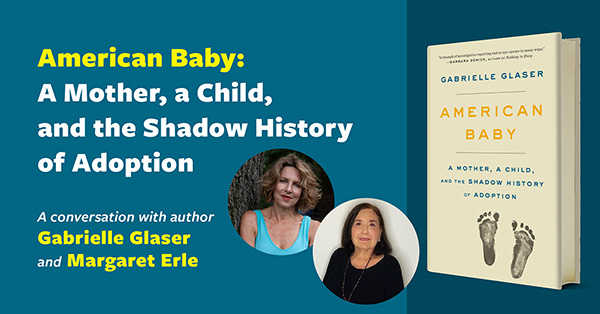
During the Baby Boom in 1960s America, women were encouraged to stay home and raise large families, but sex and childbirth were taboo subjects. Premarital sex was common, but birth control was hard to get, and abortion was illegal. In 1961, Margaret Erle, a 16-year-old daughter of German-Jewish immigrants in Washington Heights, became pregnant after her first sexual encounter with her high school sweetheart. Her scandalized family sent her away to a maternity home run by Louise Wise Services, a prominent Jewish adoption agency in New York City, which was tasked with placing Jewish adoptees. After she gave birth, Margaret wasn't allowed to hold her own son, and social workers threatened her with jail until she signed away her parental rights. Though Margaret went on to marry and raise a large family with the baby’s father, she never stopped longing for and worrying about her firstborn. Adopted by Holocaust survivors, the child spent his early life mere blocks from his biological parents, later became a renowned cantor, and finally found his birth mother mere months before his own death from cancer.
Claiming to be acting in the best interests of all, the adoption business was founded on secrecy and deception. Louise Wise and the other agencies that purported to help pregnant women struck unethical deals with doctors and researchers for pseudoscientific "assessments," and shamed millions of young women into surrendering their children. In American Baby: A Mother, a Child, and the Shadow History of Adoption, author Gabrielle Glaser dramatically demonstrates the power of the expectations and institutions that Margaret faced. Gabrielle and Margaret will discuss this story of loss, love, and the search for identity.
Ticket Info: Pay what you wish; register at programs.cjh.org/tickets/american-baby-2021-07-22 for a Zoom link
Presented by:



book talk
lecture
"My Heart Is in the East" - How Yiddish Speakers Moved to the East
Shaul Stampfer | Delivered in English.
The question of origins is often difficult to study because originators do not always leave a paper trail. Therefore, uncovering origins can be challenging – and the story of the background of Yiddish-speaking Jews in Eastern Europe is no exception. It is complicated by the fact that in the recent past the Jewish population of the area was in the millions and it is not obvious where they came from. It is tempting for some to see them as having come from the Rhineland in search of safety and security but there are many reasons to be dubious about this. What is much more likely, as we shall see, is that the basis for the Yiddish-speaking Jewish population of Eastern Europe was the Jewish population of what is now the Czech Republic, Slovakia and Austria. They came in dribs and drabs because of economic pressures. We will examine various pieces of evidence that support this picture. While not dramatic, it was pragmatic and successful. Economic changes in the Polish-Lithuanian lands offered new opportunities to Jews and this in turn, led to conditions of rapid population growth – rapid enough to create a massive population within several centuries.
About the Speaker:
Shaul Stampfer is Rabbi Edward Sandrow Professor of Soviet and East European Jewry at the Hebrew University of Jerusalem (emeritus).
Ticket Info: Free; register at yivo.org/YCLS2021-Stampfer for a Zoom link
Presented by:

lecture
lecture
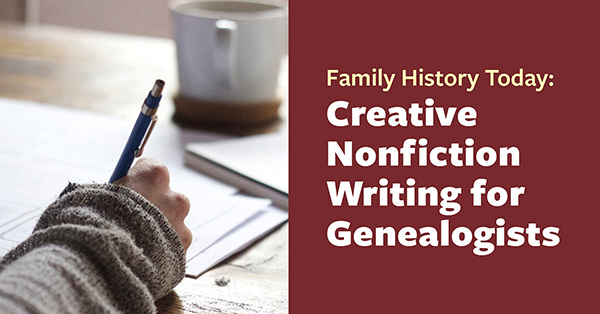
As genealogists, we often focus on facts and undertake research that produces nothing but boring lists. But do you really know what happened between the dashes of your ancestors’ lives? How can you share that information in a compelling way? Lisa Alzo, an acclaimed author and instructor who specializes in family history writing, will teach you how to use creative nonfiction writing techniques to produce a family history page-turner.
This program is sponsored by the Ackman & Ziff Family Genealogy Institute at the Center for Jewish History. It is funded, in part, by public funds from the New York City Department of Cultural Affairs in partnership with the City Council.
Ticket Info: Pay what you wish; register at programs.cjh.org/tickets/family-history-today-2021-07-20 for a Zoom link
Presented by:

lecture
lecture
Yiddish Women Writers (Part 2)
Avraham Novershtern | Delivered in Yiddish.
Any analysis of Yiddish poetry by women must take into consideration the interrelationship of many cultural factors: on the one hand, the difficulties met by women who chose to leave the traditional Jewish world and embrace modern secular culture; on the other hand, the structure of modern Yiddish culture in its manifold expressions — theater, press, literature.
The exposure of Jewish women in Eastern Europe to secular culture at the turn of the 20th century demanded the knowledge of non-Jewish languages, mainly Russian, Polish, or German. Jewish writers and cultural activists watched this phenomenon with concern. They embraced enthusiastically the beginnings of Yiddish literature written by women as a very welcome phenomenon of women returning to the fold of the Jewish cultural realm and taking part in the shaping of a Jewish cultural renaissance.
Yiddish women writers became prominent after World War I, mainly through poetry, the main dynamic factor in Yiddish literature in those days. But the 'target audience' of these works, the Yiddish literary establishment, was almost completely male. They expected women’s poetry to be 'soft', intimate', to deal with love, and to a certain extant with sex. Did Yiddish women poets accept or reject this view? One of the main features of Yiddish poetry by women is indeed its stubborn and dramatic struggle, whether open or tacit, with these expectations.
About the Speaker:
Avraham Novershtern is professor emeritus from the Yiddish Program at the Hebrew University of Jerusalem. He has taught at the Uriel Weinreich Summer Program for many years. He currently serves as the director of Beit Sholem Aleichem in Tel Aviv, a cultural center devoted to Yiddish and the Eastern European Jewish Heritage.
Ticket Info: Free; register at yivo.org/YCLS2021-Novershtern2 for a Zoom link
Presented by:

lecture
conversation
At Lunch with Mara Wilson
Author and journalist Julie Salamon (Wall Street Journal and NY Times) sits down with writer and actor Mara Wilson. Mara, known for her childhood roles in Mrs. Doubtfire and Matilda, is a writer and actor living in Los Angeles. Recently, she has appeared on Welcome to Night Vale, Broad City and Bojack Horseman. Her writing has appeared on Elle.com, McSweeney’s, Reductress, and Cracked. She also publishes a newsletter of her writing with Substack, 'Shan't We Call the Vicar?' her first book, Where Am I Now?: True Stories of Girlhood and Accidental Fame is available from Penguin Random House.
Ticket Info: Free; register at forms.office.com for a Zoom link
Presented by:

conversation
lecture
Yiddish and Zionism
Rachel Rojanski | Delivered in English.
The Hebrew language has always been the Jewel in the Crown of the Zionist movement, with its revival and development one of the movement’s fundamental goals, especially in pre-state Palestine and the state of Israel. However, Jews in Eastern Europe (and, in fact, the vast majority of the Jews in the world) during the first half of the 20th century not only spoke Yiddish, but viewed it as a Jewish national language. Yiddish became, then, not only an ideological mainstay of Jewish national movements that opposed Zionism, but also the language of a vibrant and trans-national Jewish culture. For that reason, the Zionists themselves not only used Yiddish but also supported its development. This lecture will focus on the dialectical tensions between the Hebrew ideology of Zionism and the reality that forced it to play a significant role in the development of Yiddish culture. In particular, it will ask how the Zionist movement negotiated these tensions in Eastern Europe, in the US, in pre-state Palestine and, briefly even in the State of Israel.
About the Speaker:
Rachel Rojanski is Associate Professor of Judaic Studies at Brown University. She is a cultural and political historian of the east European Yiddish-speaking Jewish diaspora from the late 19th century to the end of the 20th century, with a special interest in American Jewish history, Zionism, and Israel Studies. Her research also encompasses Jewish Socialism, Gender studies, and the history of Yiddish. Her publications include: Conflicting Identities: Labor Zionism in North America 1905-1931 (Hebrew, Ben-Gurion University Press, 2004); Yiddish in Israel: A History (Indiana University Press, 2020) as well as numerous articles on Jewish Socialism, the Yiddish press, and Jewish gender. Her current book project focuses on Holocaust survivor, historian, Yiddish writer and public activist, Rachel Auerbach.
Ticket Info: Free; register at yivo.org/YCLS2021-Rojanski for a Zoom link
Presented by:

lecture
lecture
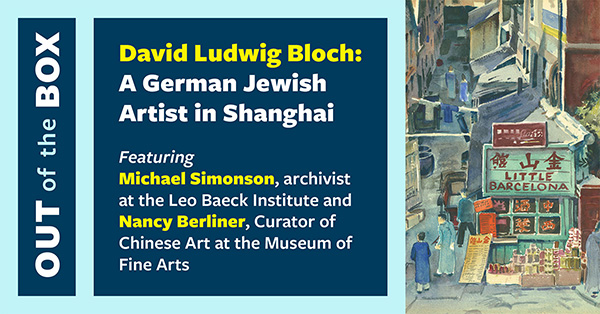
David Ludwig Bloch was a deaf Jewish artist from Bavaria who found refuge in Shanghai following his flight from Nazi Europe in 1940. There he joined a population of 20,000 other German and Austrian Jewish refugees, who found themselves living in relative safety in a place they had only imagined. A painter, illustrator, and lithographer, Bloch captured the daily life of Shanghai in the 1940s, a thriving metropolis of rich and poor, city natives, European exiles, and a vast population of Chinese refugees fleeing the Japanese invasion and chronic civil war. Through Bloch’s work, we meet the everyday people of Shanghai—the rickshaw drivers, small business owners, the homeless, and the street beggars—as well as an artist who made a new life for himself in China and then, finally, in the United States.
Michael Simonson, archivist at the Leo Baeck Institute, will be joined by Nancy Berliner, Wu Tung Senior Curator of Chinese Art at the Museum of Fine Arts in Boston, who will provide an analysis of the work in the context of Chinese art history, including Chinese art contemporary to Bloch's time in Shanghai.
About the Series
At the Center for Jewish History, there are tens of thousands of boxes in our partners’ archival collections. Boxes filled with photographs, journals, letters, and documents. We take these treasures Out of the Box in our series. Join us!
Ticket Info: Pay what you wish; register at programs.cjh.org/tickets/out-of-the-box-2021-07-12 for a Zoom link
Presented by:


lecture
lecture
Yiddish Women Writers (Part 1)
Avraham Novershtern | Delivered in Yiddish.
Any analysis of Yiddish poetry by women must take into consideration the interrelationship of many cultural factors: on the one hand, the difficulties met by women who chose to leave the traditional Jewish world and embrace modern secular culture; on the other hand, the structure of modern Yiddish culture in its manifold expressions — theater, press, literature.
The exposure of Jewish women in Eastern Europe to secular culture at the turn of the 20th century demanded the knowledge of non-Jewish languages, mainly Russian, Polish, or German. Jewish writers and cultural activists watched this phenomenon with concern. They embraced enthusiastically the beginnings of Yiddish literature written by women as a very welcome phenomenon of women returning to the fold of the Jewish cultural realm and taking part in the shaping of a Jewish cultural renaissance.
Yiddish women writers became prominent after World War I, mainly through poetry, the main dynamic factor in Yiddish literature in those days. But the 'target audience' of these works, the Yiddish literary establishment, was almost completely male. They expected women’s poetry to be 'soft', intimate', to deal with love, and to a certain extant with sex. Did Yiddish women poets accept or reject this view? One of the main features of Yiddish poetry by women is indeed its stubborn and dramatic struggle, whether open or tacit, with these expectations.
About the Speaker:
Avraham Novershtern is professor emeritus from the Yiddish Program at the Hebrew University of Jerusalem. He has taught at the Uriel Weinreich Summer Program for many years. He currently serves as the director of Beit Sholem Aleichem in Tel Aviv, a cultural center devoted to Yiddish and the Eastern European Jewish Heritage.
Ticket Info: Free; register at yivo.org/YCLS2021-Novershtern1 for a Zoom link
Presented by:

lecture
cooking show
Sephardic Culinary History with Chef and Scholar Hélène Jawhara-Piñer
Episode XI: Two Fresh Sephardic Salads with Foods from the New World
Sephardi Culinary History is a show that combines chef and scholar Hélène Jawhara-Piñer’s fascination with food studies and flair for creating delicious cuisine. Join along as she cooks Sephardic history! ASF Broome & Allen Fellow Piñer earned her Ph.D in History, Medieval History, and the History of Food from the University of Tours, France.
Ticket Info: $2.99; register at us02web.zoom.us for a Zoom link
Presented by:

cooking show
lecture
Yiddish Ethnography and An-ski
Gabriella Safran | Delivered in English.
Sh. An-ski (Shloyme-Zanvl Rappoport, 1863-1920), was a writer in Russian and Yiddish, a revolutionary, a wartime relief worker, and an ethnographer who studied the Jews of the Russian empire. During his 1911-1914 expeditions to shtetls in Ukraine, he would report, he and his co-workers took 1000 photographs, recorded 1000 Yiddish songs and 1500 stories, and purchased 400 objects for a Jewish museum. The expedition also inspired An-ski to write his signature play, The Dybbuk. Although East European Jews used ethnographic tools to study themselves both before and after An-ski’s expeditions, he retains an outsize status in the field of Yiddish ethnography, strongly tied to the success of his play. This talk explores the connections between An-ski’s ethnographic work, his play, and the Russian politics of his era.
About the Speaker:
Gabriella Safran, the Eva Chernov Lokey Professor in Jewish Studies at Stanford University, teaches in the Department of Slavic Languages and Literatures. She is the author and editor of prize-winning books on how Russian novels describe Jewish assimilation and on the relation between Jewish literature and anthropology; her biography of a pioneering Russian-Jewish writer, ethnographer, and revolutionary, Wandering Soul: The Dybbuk’s Creator, S. An-sky, came out with Harvard University Press in 2010. Safran is now finishing a book on listening, transcription, and verbal imitation across class lines in the mid-19th-century Russian Empire, and beginning another book about the international pre-history of the Jewish joke.
Ticket Info: Free; register at yivo.org/YCLS2021-Safran for a Zoom link
Presented by:

lecture
lecture
Jewish Life in the Arab World: A New Chapter?
Rabbi Elie Abadie will discuss his personal journey and the significance of creating a rabbinic community on the Arabian Peninsula. The discussion will be held once in English (June 6) and once in Spanish (July 7).
Rabbi Abadie, M.D. was born in Lebanon, lived in Mexico and New York, trained and works as a physician and a rabbi. He is now the Senior Rabbi of the UAE and has launched the ASF Council of Sephardi Scholars.
Ticket Info: $6; register at us02web.zoom.us for a Zoom link
Presented by:

lecture
lecture
The Yiddish Folk Song: A Survey
Mark Slobin | Delivered in English.
This talk will situate the “Yiddish folksong” in the context of the general European folksong world as well as the world of the performed expressive culture of ‘Yiddishland’, from prayer through popular song. The lecture will then consider the stability of the song tradition, despite the widespread mobility, dislocation, and destruction of the singers and their communities, down to today’s resurgence of new Yiddish singer-songwriters.
About the Speaker:
Mark Slobin is the Winslow-Kaplan Professor of Music Emeritus at Wesleyan University and the author or editor of many books, on Afghanistan and Central Asia, eastern European Jewish music, film music, and ethnomusicology theory, two of which have received the ASCAP-Deems Taylor Award: Fiddler on the Move: Exploring the Klezmer World and Tenement Songs: Popular Music of the Jewish Immigrants. His current project is on the musical life of Detroit, 1940s-60s. He has been President of the Society for Ethnomusicology and the Society for Asian Music.
Ticket Info: Free; register at yivo.org/YCLS2021-Slobin for a Zoom link
Presented by:

lecture
lecture
Original Ladino Music with Nani Noam Vazana
Nani Noam Vazana is the world’s first original Ladino artist. She will be discussing her new Ladino album on Zoom and Facebook Live!
During the pandemic, Nani decided to do a resurrection project of a very old language called Ladino, a Jewish-Spanish dialect from the middle ages that her grandmother used to speak. One of her 1st and best memories is of her and her grandmother together in the kitchen, speaking Ladino & singing songs about aubergine recipes.
Nani represented the NL at the EU Music Festival VN, performed at the Kennedy Center USA, Jodhpur RIFF festival IN, Jazzahead DE, North Sea Jazz NL, Roccella Jazz IT, TEDx NL & hosted 3 WOMEX panels. The Dutch NPO network released a mini documentary about her musical work in 2018. Nani also composed music for BBC4 and NPO documentaries. Nani is a professor at the London Performing Academy of Music, she chairs of the Amsterdam Artist Collective and founded Why DIY Music and Nova Productions.
For more about Nani: https://nanimusic.com/home/
Ticket Info: Free; register at us02web.zoom.us for a Zoom link
Presented by:

lecture
lecture
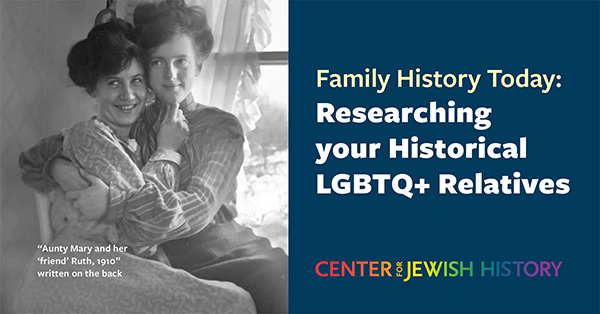
You may have heard family rumors about the “bachelor uncle” or the aunt and her “roommate.” Perhaps, you identify as LGBTQ+ and want to know if there were others like you in your family tree. Professional genealogist Janice Sellers will show you how to pursue this avenue of family history research. In addition, she will discuss ethical concerns you should consider, and why an understanding of gay history is critical to finding and understanding information about your LGBTQ+ forebears.
This program is sponsored by the Ackman & Ziff Family Genealogy Institute at the Center for Jewish History. It is funded, in part, by a Humanities New York CARES Grant, with support from the National Endowment for the Humanities and the federal CARES Act, and by public funds from the New York City Department of Cultural Affairs in partnership with the City Council.
Ticket Info: Pay what you wish; register at programs.cjh.org/tickets/family-history-today-2021-06-28 for a Zoom link
Presented by:

lecture
lecture
The Ashkenazi Jews of Mexico
Adina Cimet | Delivered in Yiddish.
The Ashkenazi Jews of Mexico are a relatively small community through which one can observe the Jewish ideological battles of the 20th and 21st centuries. This talk will feature a description of the birth of the Jewish Ashkenazi community in Mexico in the 20th century; a discussion of the community’s structural development and expansion; and an exploration of the ideological variety, richness, and effervescence of its communal life. The lecture will include a particular focus on Jewish-educational efforts within the community as well as the Yiddish language as a marker of identity and communal affiliation.
About the Speaker:
Adina Cimet was born in Mexico City to Eastern European parents. Cimet grew up in a Yiddish speaking home and attended Jewish Day school receiving a trilingual education in Yiddish, Hebrew, and Spanish. Cimet has degrees in Sociology from UNAM University in Mexico City, the London School of Economics, and Columbia University. Cimet has written a variety of academic articles on power differentials, language fights, cultural asymmetries, and political tensions. She is the author of Ashkenazi Jews in Mexico; Ideologies in the Structuring of a Community (SUNY Press) and Jewish Lublin, A Cultural Monograph (Marie-Curie Sklodowska University Press). Cimet has also served as a docent for The Jewish Museum in New York, Director of the EPYC (Educational Program of Yiddish Culture) for YIVO, Director of web page "When these streets heard Yiddish", for YIVO, and Director Consultant (temporary) for Yiddish Pop. Cimet has lectured at UNAM Mexico, Drexel University, and served as an instructor at Columbia University for their Contemporary Civilization Course.
Ticket Info: Free; register at yivo.org/YCLS2021-Cimet for a Zoom link
Presented by:

lecture
conversation
Heinrich Heine: Revolution and Music
In Heinrich Heine, Writing the Revolution, a vividly imagined exploration of Heinrich Heine’s life and work for the Yale Jewish Live Series, author George Prochnik contextualizes Heine’s biography within the different revolutionary political, literary, and philosophical movements of his age. He also explores the insights Heine offers contemporary readers into issues of social justice, exile, and the role of art in nurturing a more equitable society.
Prochnik is also the author of a forthcoming essay on Heine and his relationship to Karl Marx for LBI's Shared History Project. In it, he explores the productive tension between Heine's political commitment to the cause of human freedom and his belief in the paramount importance of aesthetic self-expression.
Alex Ross, author of a recent essay on Heine for the New Yorker will engage Prochnik in a conversation about Heine's revolutionary aesthetics and politics with a special focus the musical settings of the poet's verse that became enduring landmarks of German-language culture.
About the Panelists
George Prochnik is the author of Stranger in a Strange Land: Searching for Gershom Scholem and Jerusalem. His previous book, The Impossible Exile: Stefan Zweig at the End of the World, received the 2014 National Jewish Book Award for Biography/Memoir.
Alex Ross has been the music critic of The New Yorker since 1996. He is the author of The Rest Is Noise: Listening to the Twentieth Century (2007), Listen to This (2010), and Wagnerism: Art and Politics in the Shadow of Music (2020). In 2008 he was named a MacArthur Fellow.
Ticket Info: Free; register at lbi.org/events/heinrich-heine-poetry-revolution-and-music/ for a Zoom link
Presented by:

conversation
lecture
Under the Tenement Rooftops: Immigrant and Migrant Families in New York
Annie Polland | Delivered in English.
The Tenement Museum preserves and interprets the personal stories of residents of two buildings on the Lower East Side of Manhattan. Ninety-seven Orchard Street opened in 1863 and housed a succession of European immigrants until the double blow of the Great Depression and the impact of the 1924 Johnson Reed Act forced the landlord to evict the tenants. Down the block,103 Orchard, built in 1888, kept its doors open throughout the twentieth century, hosting Jewish and Italian immigrants in its early years, and Holocaust refugees, Puerto Rican migrants and Chinese immigrants in its later years. This program traces how immigration law impacted the residents of these buildings, and how they carved out new lives once they arrived. Census records, newspaper articles and oral histories—with a focus on YIVO primary sources—will be used to bring the families’ situations to life and situate them in their contexts.
About the Speaker:
Annie Polland is a public historian, author and President of the Lower East Side Tenement Museum, where she served as Vice President for Programs & Education from 2009 to 2017. Prior to her return to the Tenement Museum she served as Executive Director of the American Jewish Historical Society. She is the co-author, with Daniel Soyer, of Emerging Metropolis: New York Jews in the Age of Immigration, winner of the 2012 National Jewish Book Award. She received her Ph.D. in History from Columbia University, and served as Vice President of Education at the Museum at Eldridge Street, where she wrote Landmark of the Spirit (Yale University). Polland has taught at New York University and serves as an educator for the Bronfman Fellowship. She grew up in Milwaukee, WI and lives in Brooklyn with her husband and daughter.
Ticket Info: Free; register at yivo.org/YCLS2021-Polland for a Zoom link
Presented by:

lecture
lecture
New Works Wednesdays – Garden of Eden: Plants of the Hebrew Bible
Join us for New Works Wednesdays with Gloria Abella Ballen as she discusses her book Garden of Eden: Plants of the Hebrew Bible.
Historically the plants of the Bible have been of great interest for botanical studies, for their medicinal qualities, for cooking, for building gardens, for inspiration, and as metaphors for teaching.
The Bible often provides both social and symbolic meanings for plants, but sometimes the ambiguity of language means that the species mentioned cannot be specifically identified. The Bible was written in Aramaic and Hebrew, it was first translated into Greek in the second century B.C.E., into Latin in the fourth century C.E., and later into the many languages of the world. As we will see, the story of those translations has affected our understanding of the plants.
In this book I include the Hebrew name and the Latin scientific name for each of the plants, as well as the common name in English. Along with the images, I include a biblical reference to the plant with my interpretation of the verse, focusing on the five most mentioned plants: fig, grape vine, olive, date palm and pomegranate.
About the Speaker:
Gloria Abella Ballen is an artist and author creating award-winning art books such as The Power of the Hebrew Alphabet and The New World Haggadah, the latter with Ilan Stavans. Both titles won Best Book Awards with The Power of the Hebrew Alphabet winning multiple awards. Abella Ballen has graduate degrees in art from SUNY-Buffalo and the National University in Mexico City and has done specialized studies on studio art and theory with Larry Rivers and John Cage. She has exhibited in individual and group shows in the US, Israel, Japan, Latin America, and Europe, and has received a number of awards, including the UNESCO prize in painting, the Latin American Graphics Biennial, National Endowment for the Arts, and the Pan American Graphics Portfolio Award among others. Abella Ballen currently lives in Santa Fe, NM.
Ticket Info: $6; register at us02web.zoom.us for a Zoom link
Presented by:

lecture
book talk
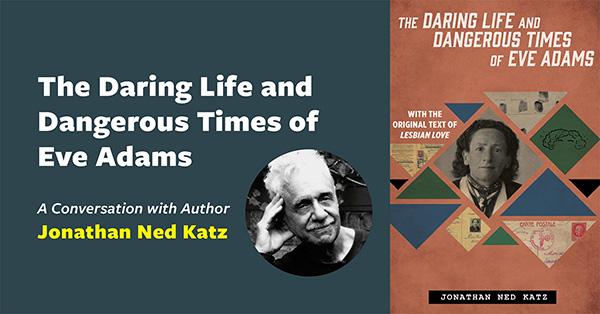
Eve Adams was a rebel. Born Chawa Zloczewer into a Jewish family in Poland, Adams emigrated to the United States in 1912. The young woman took a new name, befriended anarchists, sold radical publications, and ran lesbian- and-gay-friendly speakeasies in Chicago and New York. Then, in 1925, Adams risked all to write and publish a book titled Lesbian Love. In a repressive era, long before today’s gay liberation movement, when American women had just gained the right to vote, Adams’s association with notorious anarchists caught the attention of the young J. Edgar Hoover and the US Bureau of Investigation, leading to her surveillance and arrest. In a case that pitted immigration officials, the New York City police, and a biased informer against her, Adams was convicted of publishing an obscene book and of attempted sex with a policewoman sent to entrap her. Adams was jailed and then deported back to Europe and experienced the Nazis’ reign of terror.
In The Daring Life and Dangerous Times of Eve Adams, acclaimed historian Jonathan Ned Katz has recovered the extraordinary story of an early, daring activist. Drawing on startling evidence, carefully distinguishing fact from fiction, Katz presents the first biography of Adams, and the publisher reprints the long-lost text of Adams’s rare, unique book Lesbian Love.
Program registrants will receive a code for 30% off (print only) valid June 1-July 31.
This program is funded, in part, by a Humanities New York CARES Grant, with support from the National Endowment for the Humanities and the federal CARES Act, and by public funds from the New York City Department of Cultural Affairs in partnership with the City Council.
Ticket Info: Pay what you wish; register at programs.cjh.org/tickets/life-of-eve-2021-06-23 for a Zoom link
Presented by:


book talk
symposium
Jewish Children's Literature in Russian and Yiddish
Join scholars, archivists, and curators to explore the rich world of Jewish children’s literature in pre-WWII Europe. This webinar outlines the contours of this body of work and discusses its features through the collections of the Bodleian Library and the YIVO Institute for Jewish Research.
Scholar Miriam Udel (Emory) speaks about children's literature written in Yiddish which flourished in the early 20th century as a variety of new Yiddish language school systems educated a generation of Jewish children in Yiddish. Scholar Catriona Kelly (Oxford) presents work by important Russian Jewish authors and illustrators in the Bodleian Library’s Opie Collection, including Samuil Marshak, Natalia Sats, Nina Simonovich-Efimova, and David Shterenberg. YIVO's Director of Archives Stefanie Halpern and the Bodleian's Curator César Merchan-Hamann will close the program by showing colorful and handsomely illustrated examples from the two collections.
Ticket Info: Free; register at yivo.org/Jewish-Childrens-Literatures for a Zoom link
Presented by:


symposium
conversation
Queer Healing
Gregg Drinkwater and Rabbi Jane Litman will discuss the history and practice of how gay and lesbian Jewish leaders and their synagogues helped reshape the relationship to healing, spirituality, and personal prayer among American Jews.
Dr. Gregg Drinkwater’s research focuses on sexuality, gender, and Judaism in the modern United States. His work has appeared in the journals Jewish Social Studies and American Jewish History, as well as the Journal of Modern Jewish Studies. He is currently working on a book on the history of gay and lesbian synagogues and their role in incubating queer Jewish space. For the 2021-2022 academic year, he will be a visiting professor in Jewish History at the University of Colorado, Boulder, where he completed his PhD in U.S. history in 2020. Prior to entering academic life, Drinkwater worked for 10 years as a researcher and advocate for LGBTQ inclusion and social justice in the Jewish community through the organizations Jewish Mosaic and Keshet. He is the co-editor of the book Torah Queeries: Weekly Commentaries on the Hebrew Bible (NYU Press, 2009).
Rabbi Jane Rachel Litman supervises the Jewish Roundtable at the Pacific School of Religion’s Center for LGBTQ and Gender Studies (CLGS), which sponsors cutting edge speakers on queer and Jewish issues, and convenes conferences and strategic summits for groups such as trans Jews, LGBTQ rabbis, and Jewish queerspawn. Jane works closely with Pacific Asian, African American and Latinx colleagues addressing interfaith issues such as Religious Liberty and Trans Inclusivity using an intersectional approach. Widely published in the fields of Jewish women's history, queer theory and contemporary theology, Jane’ss book, Lifecycles 2: Jewish Women on Scriptural Themes in Contemporary Life, co-edited with Rabbi Debra Orenstein, won prestigious academic and community awards. Jane’s most recent work includes Krovai Elohim: All in God’s Family for the National Gay and Lesbian Task Force and the essay on Judaism in the anthology Struggling in Good Faith. Jane is currently working on Transkeit: Expanding Jewish Gender Diversity with Reverend Jakob Hero-Shaw.
Ticket Info: Free; register at forms.office.com for a Zoom link
Presented by:

conversation
book talk
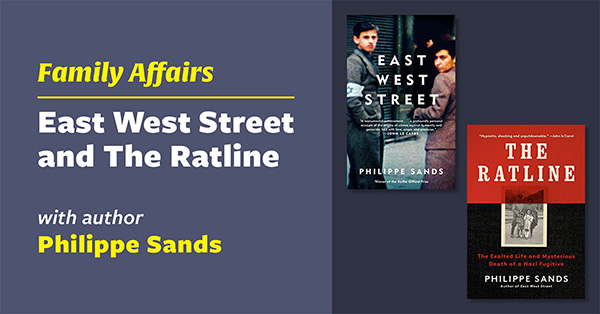
In the fifth and final program in the series, Philippe Sands, distinguished international lawyer and professor of law and author of East West Street and The Ratline: Love, Lies and Justice on the Trail of a Nazi Fugitive, will discuss with Natalia Aleksiun the family links that launched his quests in both books, and how personal, professional, and family interests intersected in his research and writing. Weaving together family, legal, social, and political history, Sands offers two complementary yet diverging perspectives, of Jewish intellectual crossroads in Lwow and the Nazi officeholders who came to destroy Jewish Lwow. The underlying motive of the legal conceptualization of genocide and crimes against humanity follow the discussion of the legal traditions forged in Lwow. The more surprising search for the fate of the Nazi governor of Lwow, his family, and the changing realities of the postwar years offers an unusual angle for a familial quest.
Ticket Info: Pay what you wish; registration required at /tickets/family-affairs-2021-06-22 to receive a link to the Zoom webinar
Presented by:

book talk
panel discussion
Talent, Ambition, Wealth: Jewish Women in the Arts in the 19th Century
Fanny Mendelssohn Hensel was a gifted composer who led a rich creative life but never achieved the fame of her brother Felix. Marie Barkany made her way from a provincial Habsburg town to the stages of Berlin and Paris as an actress in classic German dramas. And as a patron of the avant-garde, Adele Bloch-Bauer literally became an icon of fin-de-siècle Vienna in the works of Gustav Klimt.
For these three women born into Jewish families, the arts were a passion and a calling, but art also offered them an agency in shaping society and culture that was otherwise denied them as women and Jews. In the nineteenth century, many German-Jewish families improved their economic position dramatically. However, many elite occupations and social circles remained closed to even very acculturated Jews. Thus art and literature became important ways that talented Jewish men and women could both express themselves creatively and perform German culture for themselves and the wider society.
Each woman is represented in Leo Baeck Institute's Shared History Project through an object: an ornate wooden cross that once decorated Fanny's music room, a sumptuous costume worn by Barkany on stage in Paris, and the iconic portrait of Adele that became known as the “Woman in Gold.” These three artefacts offer entry points for exploring the freedom that the arts offered Jewish women in the 19th century, as well as the limits of that freedom. At this panel discussion, historians Marsha Rozenblit (University of Maryland), Deborah Hertz (UC San Diego), Lisa Silverman (University of Wisconsin, Milwaukee), and Stefan Hofmann (Saxonian Academy of Sciences and Humanities, Leipzig) will discuss the stories of each woman and link them to the larger social transformations of the 19th century.
About the Panelists
Marsha L. Rozenblit is a social historian of Jews in Central Europe. She is the author of The Jews of Vienna, 1867–1914: Assimilation and Identity (1983) and Reconstructing a National Identity: The Jews of Habsburg Austria During World War I (2001). In addition, she has co-edited Constructing Nationalities in East Central Europe (2005) and World War I and the Jews: Conflict and Transformation in Europe, the Middle East, and America (2017). She has published 35 scholarly articles on such topics as Jewish religious reform in 19th-century Vienna, synagogue affiliation in 19th-century Baltimore, and Austrian Jewish women during World War I. She is currently completing work on “Identifying as German: The Jews of Moravia, 1848–1938.” She is a member of the Academic Advisory Board of Leo Baeck Institute – New York | Berlin and an advisor to the Shared History Project.
Deborah Hertz is the Herman Wouk Chair in Modern Jewish Studies and a professor in the Department of History at UC San Diego. Hertz is the author of How Jews Became Germans: The History of Conversion and Assimilation in Berlin and Jewish High Society in Old Regime Berlin (both of which have been translated into German). She has published over 30 articles in the field of German-Jewish history and the history of Jewish women. She is currently working on a new book with the working title “Visionaries, Lovers and Mothers: Radical Jewish Women from Conspiracy to Kibbutz” that covers women in anarchist, terrorist, socialist, Yiddishist, feminist and Zionist movements from New York City to Vilna to Odessa to the kibbutzim in Palestine.
Lisa Silverman is Associate Professor of History and Jewish Studies at UWM. She is the author of Becoming Austrians: Jews and Culture between the World Wars (Oxford, 2012) and co-author (with Daniel H. Magilow) of Holocaust Representations in History: an Introduction (Bloomsbury, 2015; second edition 2019). She has also co-edited several volumes, most recently Austrian Studies 24: Jews, Jewish Difference and Austrian Culture: Literary and Historical Perspectives (2016), with Deborah Holmes. Her other co-edited volumes include, with Arijit Sen, Making Place: Space and Embodiment in the City (Indiana, 2014) and, with Deborah Holmes, Interwar Vienna: Culture between Tradition and Modernity (Camden House, 2009). She serves as Contributing Editor of the Leo Baeck Institute Year-Book for German-Jewish history and is a member of the editorial board of Shofar: an Interdisciplinary Journal of Jewish Studies.
Stefan Hofmann is Research Associate at the Project “European Traditions – Encyclopedia of Jewish Cultures” of the Saxonian Academy of Sciences and Humanities in Leipzig. He served in the editorial staff of the seven-volume Enzyklopädie jüdischer Geschichte und Kultur (Encyclopedia of Jewish History and Culture; 2011–2017) which is currently being translated into English. Additionally, he is copy-editor of two series of critical editions of sources in Jewish history (Archive of Jewish History and Culture; Library of Jewish History and Culture). His main areas of research are the cultural history of the Jews, the history of theater, and the history of antisemitism. He co-edited a special issue of the Dubnow-Institute Yearbook on Holocaust memory in theater and film (together with Jörg Deventer; 2015). Currently, he is writing a dissertation with the working-title “Of Masks and Mimicry. Jewish Acculturation on German Stages 1815–1918.”
Ticket Info: Free; register at eventbrite.com for a Zoom link
Presented by:

panel discussion
lecture
The Oyneg Shabes Archive and the Ethos of YIVO
Samuel Kassow | Delivered in Yiddish.
In the fall of 1940 the Polish Jewish historian and communal organizer Emanuel Ringelblum convened a meeting to found a secret archive in the Warsaw Ghetto. The archive bore the code name Oyneg Shabes, Yiddish for “Joy of the Sabbath”. Of the 60 people that Ringelblum gathered for the project there were only three survivors.
The Oyneg Shabes reflected to a certain degree the ethos of the YIVO, founded in Vilna in 1925 to promote the interdisciplinary study, in Yiddish, of modern Jewish life in Eastern Europe. Long before the outbreak of World War II Ringelblum and other East European Jewish intellectuals had seen the gathering of documents and archives as a major instrument of nation building and national self-defense. From its very inception the Oyneg Shabes became a major center of cultural resistance. The Germans believed that they would decide how the history of the Jews would be written. The Oyneg Shabes did all it could to thwart this and to ensure that even if its members did not live to see the day of final victory over the Nazis, historians would use Jewish and not just German or Polish sources.
About the Speaker:
Samuel D. Kassow is the Charles H. Northam Professor of History at Trinity College, and is recognized as one of the world’s leading scholars on the Holocaust and the Jews of Poland. He is widely known for his 2007 book, Who Will Write Our History? Emanuel Ringelblum, the Warsaw Ghetto, and the Oyneg Shabes Archive (Indiana University Press). He was elected a Fellow of the American Academy for Jewish Research, has won numerous awards, and has lectured widely.
Ticket Info: Free; register at yivo.org/YCLS2021-Kassow for a Zoom link
Presented by:

lecture
lecture
The Lost World of African American Cantors 1915-1953
Histories of Black-Jewish cultural interaction often focus on how Jews adopted and adapted Black vernacular music—ragtime, jazz, swing, R&B, blues—as performers, promoters, managers, club owners, and record labels. The phenomenon of African American musicians who performed Yiddish and cantorial music in and for the Jewish community in theaters, on record, on radio, and in concert between the World Wars deserves such scholarly inquiry. This talk will honor the memory of now forgotten Black cantors – Mendele der Shvartser Khazn, Reb Dovid Kalistrita, Abraham Ben Benjamin Franklin, Thomas LaRue Jones, and Goldye di Shvartse Khaznte, the first known Black woman cantor. This talk by award winning producer, author, and ethnomusicologist Henry Sapoznik will feature dozens of historic graphics, translations of period Yiddish newspaper previews, ads, and reviews, and the playing of the one known 1923 Yiddish and Hebrew recording of Thomas Jones LaRue.
About the Speaker:
Henry Sapoznik is an award winning record and radio producer, author, and ethnomusicologist in the fields of Yiddish and American popular and traditional culture. Sapoznik, a native Yiddish speaker and child of Holocaust survivors, helped jump-start the klezmer “revival” with “Kapelye” in 1979, was the founding director of the YIVO Sound Archives 1982-1995, and created “KlezKamp: The Yiddish Folk Arts Program” in 1985. Sapoznik, a five-time Grammy nominated producer, won the 2002 Peabody award for his 13-part NPR series “The Yiddish Radio Project” the collection of which was acquired by the American Folklife Center of the Library of Congress in 2011. Sapoznik was also the final on-air host (1990-1995) of the long-running Yiddish radio show “The Forward Hour” on radio station WEVD. Sapoznik’s 2015 reissue of the earliest Yiddish sound recordings, “Attractive Hebrews: The Lambert Yiddish Cylinders 1901-1905,” won the coveted Certificate of Merit from The Association for Recorded Sound Collections. Sapoznik is currently working on a book about African American cantors of the 1920s.
Ticket Info: Free; register at yivo.org/African-American-Cantors for a Zoom link
Presented by:

lecture
conversation
At Lunch with Judy Heumann
Author and journalist Julie Salamon (Wall Street Journal and NY Times) sits down with disability rights activist and author, Judith Heumann. Since the 1970's Judy has worked with a wide range of activist organizations, NGOs, and government agencies directly contributing to the development of human rights legislation and policy benefiting disabled people. Over the past year Judy was featured in the award winning documentary, Crip Camp and published a critically acclaimed memoir, Being Heumann. We are honored to welcome Judy!
Ticket Info: Free; register at forms.office.com for a Zoom link
Presented by:

conversation
lecture
Jewish Anarchist Women 1920-1950: the Politics of Sexuality
Anarchist theory includes the belief in freedom for all - that no one person, nor group of people, should have power over any others; that individuals can best decide how to live (and love). In this presentation Elaine Leeder will discuss eight Jewish women who identified as anarchists, active during the 1920s to 1950s. Through analysis of in-depth interviews Leeder explores the complete sexual freedom that these women sought at a time when conventionality and conformity was the norm. These women attempted to create equality in the public and private spheres, some living communally and raising their children in progressive schools. They also sought to maintain complete equality of the sexes through economic independence and maintaining non-conformist sexual relationships. This talk will place a particular focus on the way that ethnicity played a role in these women’s identities, emphasizing their atheism, while still maintaining Jewish values and traditions.
About the Speaker:
Elaine Leeder is a retired dean and professor at Sonoma State University; she is the author of six books, two of which are being used at universities around the country. Her first book The Gentle General: Rose Pesotta, Anarchist and Labor Organizer, was published by SUNY PRESS. She was the author of a number of articles on Anarchist-Feminism in the 1980s. Currently she works in prisons doing restorative justice facilitating dialogues between victims and those who committed the crimes in California prisons. She is the recipient of the Real Hero Award from the American Red Cross for her work in prisons, is listed in Who’s Who of American Teachers, and Who’s Who in America, and was a visiting scholar at the US Holocaust Memorial Museum.
Ticket Info: Free; register at yivo.org/Jewish-Anarchist-Women for a Zoom link
Presented by:

lecture
concert
Joel Engel: Jewish Folksongs Volume III - Premiere on Facebook and YouTube
Join us for a performance of Joel Engel's Jewish Folksongs Volume III (c. 1920): 10 Yiddish folksongs, dances, and Hasidic nigunim in virtuosic piano arrangements. Together with volumes I and II (featured by YIVO in November 2020), Engel's arrangements were the first classical compositions to feature Yiddish folksongs. His use of Yiddish folk music in his compositions proved to be influential and inspired the Society for Jewish Folk Music and the composers affiliated with it to create a vast oeuvre of similar work. Engel's work also provided a source for a variety of other composers who used Yiddish folksongs in their music including, famously, Prokofiev's Overture on Hebrew Themes, whose second theme is taken from the second song of Volume I from this collection.
This collection of 10 pieces will be performed by pianist Thomas Kotcheff.
About the Performer
Thomas Kotcheff (b. 1988) is a Los Angeles based composer and pianist. His music has been described as “truly beautiful and inspired” (icareifyoulisten.com) and “explosive” (Gramophone magazine). His compositions have been performed internationally by The Riot Ensemble, New York Youth Symphony, wild Up, Sandbox Percussion, Trio Appassionata, Argus Quartet, Lyris Quartet, Alinde Quartett, USC Thornton Edge, The Oberlin Contemporary Music Ensemble, HOCKET, Peabody Percussion Group, Latitude 49, and the Aspen Contemporary Ensemble amongst others.
As a new music pianist, Thomas has dedicated himself to commissioning and premiering new piano works. His playing has been described as “dazzling” by Mark Swed of the Los Angeles Times and “outstanding” by Steve Smith of Night after Night. In 2020, Thomas released the world premiere recording of Frederic Rzewski’s 75-minute solo piano work Songs of Insurrection in which Rzewski hailed his performance as “magnificent.” He is the pianist and founding member of the Los Angeles based piano duo HOCKET.
Ticket Info: Free; register at yivo.org/Engel-Volume-III for a Zoom link
Presented by:

concert
two-part lecture series
The Jews of the Caucasus: The Multifaceted History of Kavkazi and Georgian Jews
Jewish history runs very deep in the Caucasus—an ethnically, linguistically, and religiously diverse region at the crossroads of Europe and Asia. Jewish communities have existed continuously in Georgia, Azerbaijan and the North Caucasus (including Dagestan and Chechnya) for centuries, if not millenia. Join us in exploring the histories and cultures of this region’s oldest Jewish communities. Our first session will focus on Kavkazi Jews (also known as Mountain Jews, Gorsky Jews, or Juhuro), and the second session will highlight the story of Georgian Jews.
About the Speakers:
Part two of a two-part series
Born in Uzbekistan and currently based in Seattle, Ruben Shimonov is an educator, community builder, and social entrepreneur with a passion for Jewish diversity. He previously served as Director of Community Engagement and Education at Queens College Hillel. Currently, Ruben is the Founding Executive Director of the Sephardic Mizrahi Q Network, an organization that is building a supportive and much-needed community for LGBTQ+ Sephardic and Mizrahi Jews. He also serves as Vice President of Education & Community Engagement on the young leadership board of the American Sephardi Federation (ASF), Director of Educational Experiences & Programming for the Muslim-Jewish Solidarity Committee, and Director of ASF’s Sephardi House Fellowship—a new year-long learning and enrichment program for college student leaders. He is an alumnus of the COJECO Blueprint and Nahum Goldmann Fellowships for his work in Jewish social innovation, and has been listed among The Jewish Week's "36 Under 36" young Jewish community leaders and changemakers. Ruben has lectured extensively throughout the world on the histories and cultures of various Sephardic and Mizrahi communities. He is also a visual artist specializing in multilingual calligraphy that interweaves Arabic, Hebrew and Persian. He uses his artistry to deepen Muslim-Jewish interfaith learning and community building.
Ticket Info: $10 each session; register at us02web.zoom.us for a Zoom link
Presented by:

two-part lecture series
panel discussion
The Jewish Enlightenment in the Era of Absolutism
As LBI's yearlong exploration of 1700 years of German-Jewish History concludes its chapter on the era of Absolutism (1648–1806), three scholars will discuss how the intellectual and social developments of the age impacted Jews, and how Jews contributed to those developments.
After the Peace of Westphalia in 1648, territorial states began to centralize power over the numerous small and fractious polities in German-speaking Europe, and they built bureaucracies that rationalized the relationship between the state and its subjects – including Jews. This held both the promise of greater toleration and inclusion, but also the threat of persecution by even more powerful despots.
In the same period, the ideals of the Enlightenment began to change ideas about the proper role of religion in society and the relationship of the individual to religion. The Jewish Enlightenment offered new answers to old questions about whether Jewishness was primarily a nationality or a religion, especially in the context of the Protestant conception of religion as a private matter of individual faith. The ways in which thinkers like Moses Mendelssohn theorized the complex relationship between individuals, religions, and the state paved the way for Jewish participation in secular German society, but they also have implications for our own diverse societies.
About the Panelists
Elisheva Carlebach, Salo Wittmayer Baron Professor of Jewish History, Culture, and Society
Elisheva Carlebach specializes in the cultural, intellectual, and religious history of the Jews in Early Modern Europe. Areas of particular interest include the intersection of Jewish and Christian culture and its effect on notions of tolerance, religious dissent, conversion, messianism, and communal governance. Her books include The Pursuit of Heresy (1990), awarded the National Jewish Book Award, Divided Souls: Converts from Judaism in Early Modern Germany (2000) and Palaces of Time: Jewish Calendar and Culture in Early Modern Europe (2011), winner of the Association for Jewish Studies Schnitzer Prize.
Michah Gottlieb, Associate Professor of Hebrew and Judaic Studies, New York University
Michah Gottlieb’s main field of research is modern Jewish thought and philosophy. His interests include: the faith-reason debate and its political ramifications, modern Bible translation and interpretation, ethical education and character development, and bourgeois piety. His books include: Faith and Freedom: Moses Mendelssohn’s Theological Political Thought (2011); Faith, Reason, Politics: Essays on the History of Jewish Thought (2013) and most recently: The Jewish Reformation: Bible Translation and Middle-Class German Judaism as Spiritual Enterprise (2021).
David J. Sorkin, Professor of Modern Jewish History, Yale University
David Sorkin’s work is situated at the intersection of Jewish history and European history since the 16th century. His first book, The Transformation of German Jewry, 1780–1840 (1987), examined the formation of Jewish culture in the German states, which he came to understand as a “subculture.” Sorkin's latest book is Jewish Emancipation: A History Across Five Centuries (2019), in which he argues that the attainment of civil and political rights or equality is the principal event of modern Jewish history. He is currently at work on a study of the practice of Jewish politics since the sixteenth century.
Ticket Info: Free; register at eventbrite.com for a Zoom link
Presented by:

panel discussion
book club
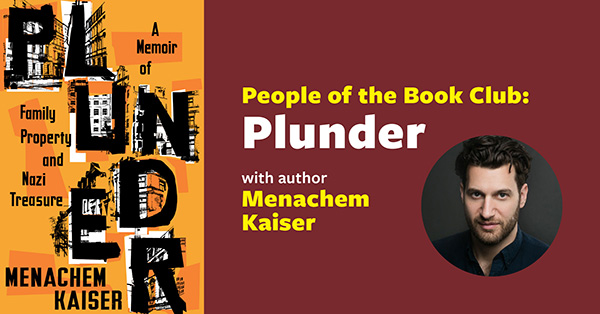
Go behind the stories and peer inside the archives at the CJH book discussion, led by Lauren Gilbert, Senior Manager for Public Services at the Center for Jewish History. This session will feature a discussion of Plunder by Menachem Kaiser, the story of the author’s quest to reclaim his family’s apartment building in Poland—and of the astonishing entanglement with Nazi treasure hunters that follows. This debut from Kaiser has received rave reviews and was described by the New York Times as “a twisting and reverberant and consistently enthralling story…a weird story that gets weirder.” We will be joined by the author for a Q&A after the discussion.
Participants will need to obtain their own copy to read before the discussion.
NOTE: This is a book discussion, not a lecture, so space is limited.
Ticket Info: Pay what you wish; register at programs.cjh.org/tickets/people-book-club-2021-06-02 for a Zoom link
Presented by:

book club
concert
To Bigotry No Sanction
A magnificent new cantata, composed by Jonathan Comisar, based on George Washington’s historic Letter to the Hebrew Congregation of Newport, Rhode Island. Commissioned by Congregation Keneseth Israel in the Philadelphia suburb of Elkins Park, PA, the piece embodies touchstones of Jewish and American music in a choral-orchestral setting. The pre-recorded, streamed performance, conducted by Kensho Watanabe, features members of The Philadelphia Orchestra and a multicultural choir representing 17 languages.
The program includes introductory readings by renowned historical interpretive actor Dean Malissa, as “George Washington,” and a post-performance discussion with composer Jonathan Comisar and Congregation Keneseth Israel Rabbi Lance J. Sussman, Ph.D., a professor of American Jewish History. The conversation will be moderated by Emmy Award-winning documentary filmmaker Sam Katz of History Making Productions.
Promotional partners for the June 2nd performance of Comisar’s To Bigotry No Sanction are the Center for Jewish History, the American Society for Jewish Music, YIVO, the American Sephardi Federation, the American Jewish Historical Society, the Leo Baeck Institute, and the Lowell Milken Center for the Music of American Jewish Experience, American Conference of Cantors, the Cantors Assembly, the Debbie Friedman School of Sacred Music, Hebrew Union College-Jewish Institute of Religion, the American Jewish Archives, and the American Jewish Committee.
Ticket Info: Free; no registration required. To learn more and to watch the event click here
Presented by:






concert
two-part lecture series
The Jews of the Caucasus: The Multifaceted History of Kavkazi and Georgian Jews
Part one of a two-part series
Jewish history runs very deep in the Caucasus—an ethnically, linguistically, and religiously diverse region at the crossroads of Europe and Asia. Jewish communities have existed continuously in Georgia, Azerbaijan and the North Caucasus (including Dagestan and Chechnya) for centuries, if not millenia. Join us in exploring the histories and cultures of this region’s oldest Jewish communities. Our first session will focus on Kavkazi Jews (also known as Mountain Jews, Gorsky Jews, or Juhuro), and the second session will highlight the story of Georgian Jews.
About the Speaker:
Born in Uzbekistan and currently based in Seattle, Ruben Shimonov is an educator, community builder, and social entrepreneur with a passion for Jewish diversity. He previously served as Director of Community Engagement and Education at Queens College Hillel. Currently, Ruben is the Founding Executive Director of the Sephardic Mizrahi Q Network, an organization that is building a supportive and much-needed community for LGBTQ+ Sephardic and Mizrahi Jews. He also serves as Vice President of Education & Community Engagement on the young leadership board of the American Sephardi Federation (ASF), Director of Educational Experiences & Programming for the Muslim-Jewish Solidarity Committee, and Director of ASF’s Sephardi House Fellowship—a new year-long learning and enrichment program for college student leaders. He is an alumnus of the COJECO Blueprint and Nahum Goldmann Fellowships for his work in Jewish social innovation, and has been listed among The Jewish Week's "36 Under 36" young Jewish community leaders and changemakers. Ruben has lectured extensively throughout the world on the histories and cultures of various Sephardic and Mizrahi communities. He is also a visual artist specializing in multilingual calligraphy that interweaves Arabic, Hebrew and Persian. He uses his artistry to deepen Muslim-Jewish interfaith learning and community building.
Ticket Info: $10 each session; register at us02web.zoom.us for a Zoom link
Presented by:

two-part lecture series
book talk
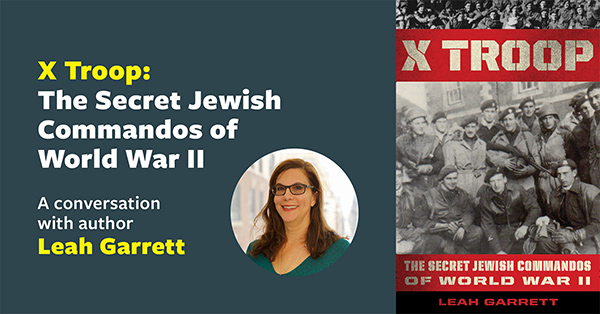
In June of 1942, amid Third Reich victories everywhere, Winston Churchill and his chief of staff form an unusual plan: a new commando unit made up of Jewish refugees who escaped to Britain. The resulting volunteers are a motley group of intellectuals, artists, and athletes, most from Germany and Austria. Many have been interned as enemy aliens, and have lost their families, their homes—their whole worlds. They will stop at nothing to defeat the Nazis. Trained in counterintelligence and advanced combat, this top-secret unit becomes known as X Troop.
Drawing on extensive original research, including interviews with the last surviving members, author and historian Leah Garrett, Professor and Director of Jewish Studies at Hunter College, follows this unique band of brothers from Germany to England and back again, with stops at British internment camps, the beaches of Normandy, the battlefields of Italy and Holland, and the hellscape of Terezin concentration camp—the scene of one of the most dramatic, untold rescues of the war. For the first time, X Troop: The Secret Jewish Commandos of World War IItells the astonishing story of these secret shock troops and their devastating blows against the Nazis.
This program is funded, in part, by a Humanities New York CARES Grant, with support from the National Endowment for the Humanities and the federal CARES Act, and by public funds from the New York City Department of Cultural Affairs in partnership with the City Council.
Ticket Info: Pay what you wish; registration required at /tickets/x-troop-2021-05-27 to receive a link to the Zoom webinar
Presented by:


book talk
book talk
Salomea Perl & Women Yiddish Prose Writers
Warsaw based writer Salomea Perl was one of the rare women publishing literary Yiddish texts at the same time as the klasikers of Yiddish literature, Sholem Aleichem, Mendele Moykher Sforim and Y. L. Peretz. Ruth Murphy's new translation of Perl's work, The Canvas and other stories, is a cause for celebration and reflection. The last thirty years has seen many previously ignored or lost female authors, like Salomea Perl, finally brought into the Yiddish canon. Join us for a discussion of The Canvas, exploring the rediscovery and translation of her work and placing it into its literary context. Moderated by Rokhl Kafrissen (Tablet Magazine) the conversation will feature translator Ruth Murphy alongside Yiddish scholars Anna Fishman Gonshor and Justin Cammy.
About the Speakers:
Rokhl Kafrissen is a journalist and playwright in New York City. Her ‘Rokhl’s Golden City’ column began appearing in Tablet in 2017, the only regular feature in the world dedicated to new Yiddish culture in all its iterations. Her op-eds on feminism, sociology and Jewish life appear in newspapers all over the world. She was a 2019-2020 14th Street Y LABA fellow, for which she wrote Shtumer Shabes (Silent Sabbath), a black comedy about the dangers of ethnography and human experimentation.
Ruth Murphy is a published and peer-reviewed professional translator specializing in the research and translation of Yiddish literature, historical documents and yizkor (memorial) books. Murphy’s translations have been featured in the Jewish Review of Books, Metamorphoses, and Pakn Treger. Murphy has also served as a translator for the Ellis Island Discography Project where she transcribed and translated multiple early 20th-century Yiddish songs relating to the Jewish Yiddish-speaking immigrant experience.
Justin Cammy is chair and associate professor of Jewish Studies and World Literatures at Smith College, and senior fellow of the Goldreich Institute for Yiddish at Tel Aviv University. He is the author of the introduction to The Full Pomegranate, a recent volume of Sutzkever poetry translated by Richard Fein. Cammy's own translation of Sutzkever's memoir Vilna Ghetto will appear with McGill-Queens University Press in 2021.
Anna Fishman Gonshor is Faculty Lecturer of Yiddish Studies in the Department of Jewish Studies at McGill University (retired). She has been guest lecturer for several university Yiddish programs and various institutions across North America. As a translator her work includes film, articles for academic publications and archival materials. In addition, she is a longstanding faculty member of the YIVO Uriel Weinreich Summer Program in Yiddish Language, Literature, and Culture.
Ticket Info: Free; register at yivo.org/Salomea-Perl for a Zoom link
Presented by:

book talk
book club
LBI Book Club, Vol. XI: Heinrich Heine
For our next two book clubs, held on May 25 and June 29, we are going to read a variety of both prose and poetry by Heinrich Heine. If you wish to attend both sessions, please register for both occurrences of the event on Eventbrite. There is one book to read from, Heinrich Heine: The Harz Journey and Selected Prose. The rest of the readings are provided, free of charge, at the links below and in the sidebar.
We will be reading for our next meeting:
- From the book: Ideas: The Book of Le Grand (Page 89 of the Penguin Classics edition advertised) and Memoirs (Page 295 in the Penguin Classics edition advertised)
- The next readings are poems. You need only read the poems that are marked with an X–all are quite short. They can be found here. Finally, please read this poem, Heine's "Lorelei", found here.
These versions have all purposely been chosen by George Prochnik, who will be leading us through Heine's work for the next two sessions.
Author
Heinrich Heine (1797-1856) is perhaps the best known of Germany's poets. Born into a Jewish family in Düsseldorf, he made a name for himself in the world of literature, but he was more than poems and poetry. His life also involved philosophy and what was considered at the time radical political thought. Heine moved to Paris and remained there, exiled from a Germany he both loved and despised.
Guest Scholar
We are happy to have George Prochnik return to us for our next two book club meetings. Prochnik's latest work, published last November, is Heinrich Heine: Writing the Revolution. His biography of of Stefan Zweig, The Impossible Exile: Stefan Zweig at the End of the World, received the National Jewish Book Award for Biography/Memoir in 2014 and was short-listed for the Wingate Prize in the United Kingdom. Prochnik is also the author of In Pursuit of Silence: Listening for Meaning in a World of Noise (2010), and Putnam Camp: Sigmund Freud, James Jackson Putnam, and the Purpose of American Psychology (2006). He has written for The New Yorker, New York Times, Bookforum, and Los Angeles Review of Books, and is editor-at-large for Cabinet magazine.
Where to Purchase the Book
George Prochnik recommends this text for reading the two prose pieces.
Ticket Info: Free; register at eventbrite.com for a Zoom link
Presented by:

book club
panel discussion
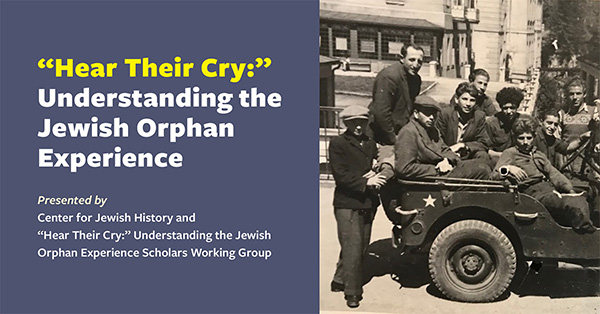
To conclude two years at the Center for Jewish History, the Scholars Working Group “Hear Their Cry:” Understanding the Jewish Orphan Experience presents scholarship from four members on the following topics:
Natalia Aleksiun: Survival Strategies and Jewish Orphans during the Holocaust in Eastern Europe
Joshua C. Andy: Remembrance and Resistance: The Testimony and Memoir of Rachel Pinchsowitz Litwak
Emily Bengels: Rescue of Unaccompanied Children from Vichy France to the US: How Past Struggles Can Inform Present Efforts
Katharina Menschick: The Kindertransports from Austria — Findings from Ten Oral Histories in the Leo Baeck Institute’s Austrian Heritage Collection
About the Speakers:
Natalia Aleksiun, Ph.D., is a Professor of Modern Jewish History at Touro College, Graduate School of Jewish Studies, New York. She has published widely on Polish Jewish issues. She is the author of Where to? The Zionist Movement in Poland, 1944-1950, which appeared in 2002 in Polish, and the co-editor, with Antony Polonsky and Brian Horowitz, of Writing Jewish History in Eastern Europe( 2016). She is currently working on a book about the so-called cadaver affair at European Universities in the 1920s and 1930s and on a project dealing with daily lives of Jews in hiding in Galicia during the Holocaust.
Joshua C. Andy, Ph.D., is an Upper School History Teacher at Winchester Thurston School in Pittsburgh, Pennsylvania, where he specializes in non-US history and teaches a class entitled “Genocide: A Global History on Crimes Against Humanity.” For the past eight years, he has traveled with and worked as a scholar and historian for Classrooms Without Borders; in that work he has guided students, teachers, and university educators in Holocaust education. Dr. Andy has been a partipant for the past two years in the Scholars Working Group ‘Hear their Cry: Understanding the Jewish Orphan Experience’ at the Center for Jewish History. His latest publication, ‘When Ghosts Roam the Streets: Historical Memory in Starachowice,’ appeared in February 2020 in In Context and describes how one Polish town grapples with its own history and the larger historical narratives of the Holocaust. He earned his BA with honours from Washington & Jefferson College and an MA and Ph.D. from the University of Birmingham (UK).
Emily Bengels is a doctoral candidate at Gratz College in Philadelphia, Pennsylvania. She was a JDC Fellow in 2020 and was selected to be part of the USC Shoah Foundation’s Past is Present commemoration of the liberation of Auschwitz and to attend the Yad Vashem Advanced Echoes and Reflections seminar. She leads music for the First Unitarian Universalist Fellowship of Hunterdon County and for Congregation Kehilat Shalom, and teaches in Hunterdon County, NJ.
Katharina Menschick received an MA in history and literature from the CUNY Graduate Center in 2019. After working in the archives of the Leo Baeck Institute in New York, she is now is a research associate at the Arolsen Archives – International Center on Nazi Persecution.
Ticket Info: Pay what you wish; registration required at /tickets/hear-their-cry-2021-05-25 to receive a link to the Zoom webinar
Presented by:

panel discussion
lecture
Sephardi Thought and Modernity: Rabbi Yosef Knafo’s Struggle for Democratization of Knowledge in Fin de Siècle Essaouira
The intention of this series is to spark the interest in processes of Jewish modernization not exclusively mediated by Europeanization. The questions we will be dealing with are related to non-dichotomic identities, multiplicity and loss of language, colonization, social transformation, and intellectual responses to it. We will approach these questions by looking at Jewish-Arab influences, the Sephardi response to European modernization, the responses of the rabbinic leadership and the work of Sephardi intellectuals.
May 20th: Gabriel Abensour (Hebrew University of Jerusalem): Rabbi Yosef Knafo’s Struggle for Democratization of Knowledge in Fin de Siècle Essaouira
Ticket Info: Free; register at ucalgary.zoom.us for a Zoom link
Presented by:

lecture
conversation
At Lunch with Muzzy Rosenblatt
Author and journalist Julie Salamon (Wall Street Journal and NY Times) sits down with influential cultural leaders in the Jewish American Community; we'll hear their thoughts about working in this present moment, current projects, and what they have to say about their Jewish identity. Grab your lunch and tune in for our conversation with Muzzy Rosenblatt, CEO and President of the Bowery Residents’ Committee.
Our Guest This Month
Muzzy Rosenblatt is CEO and President of BRC (the Bowery Residents’ Committee, Inc.), one of the most successful and innovative nonprofits working in service to New Yorkers experiencing homelessness. BRC’s 30 programs with nearly 3,000 units of shelter and housing provide an integrated continuum of comprehensive services to 10,000 individuals it annually serves, offering a caring and effective path from homelessness to home. In 2017, Muzzy was honored by the Nonprofit Times as one of the country’s Top 50 influential nonprofit leaders. Prior to BRC, Muzzy held several positions in NYC government, including First Deputy Commissioner and Acting Commissioner of the NYC Department of Homeless Services. A native New Yorker he grew up in Manhattan, attending PS 158 and Hunter College High School, before earning and MPA from NYU Wagner and a BA from Wesleyan University. He now resides in “the hills of the forest” in the county of Queens.
Interviewed By
Julie Salamon is an American author, critic and storyteller. She worked at The Wall Street Journal for five years first as a commodities and banking reporter before spending eleven years as the paper's film critic. Later she became a staff journalist at The New York Times where she was a TV critic and arts reporter. Later she gained fellowships at the MacDowell Colony and became a Kaiser Media Fellow. She has written both fiction and non-fiction books for adults and children-- and produced articles for magazines that include The New Yorker, Vanity Fair, Vogue, Bazaar, and The New Republic. Her books have received wide critical and popular attention, she has just completed "Unlikely Friends," a memoir for Audible Original, scheduled for release in 2021.
Ticket Info: Free; register at forms.office.com for a Zoom link
Presented by:

conversation
book talk
A Fortress in Brooklyn: Race, Real Estate and the Making of Hasidic Williamsburg
Nathaniel Deutsch and Michael Casper discuss their new book, which sheds light on the history of one of New York's Hasidic neighborhoods.
Hasidic Williamsburg is famous as one of the most separatist, intensely religious, and politically savvy communities in the entire United States. Less known is how the community survived in one of New York City’s toughest neighborhoods during an era of steep decline, only to later oppose and also participate in the unprecedented gentrification of Williamsburg, Brooklyn.
Nathaniel Deutsch and Michael Casper unravel the fascinating history of how a community of determined Holocaust survivors encountered, shaped, and sometimes fiercely resisted the urban processes that transformed their gritty neighborhood, from white flight and the construction of public housing to rising crime, divestment of city services, and, ultimately, extreme gentrification. By showing how Williamsburg’s Hasidim avoided assimilation, Deutsch and Casper present both a provocative counter-history of American Jewry and a novel look at how race, real estate, and religion intersected in the creation of a quintessential, and yet deeply misunderstood, New York neighborhood.
About the Speakers:
Nathaniel Deutsch is professor of history at the University of California, Santa Cruz.
Michael Casper received his Ph.D. in history from UCLA and has contributed to American Jewish History and the New York Review of Books.
Ticket Info: Free; register at hforms.office.com for a Zoom link
Presented by:

book talk
conversation
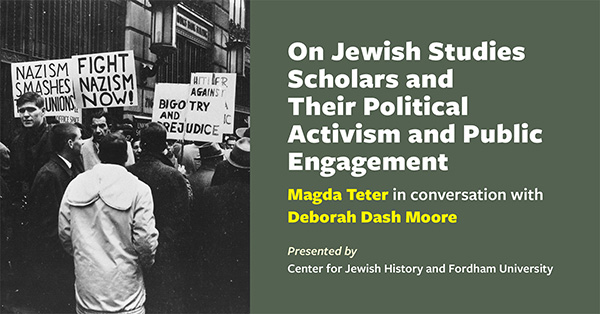
Modern ideals of scholarly detachment and objectivity have always existed in tension with political and public engagement. In 1895, for example, Theodore Reinach, the President of the Société des études juives in France, wrote: "The Society of Jewish Studies need not concern itself with the present trials of Judaism, however poignant the interest may be. It dwells in the quieter sphere of history, and it is only by dispelling the accumulated errors about ancient Judaism that it can indirectly contribute to rehabilitating or consoling Judaism today.” Magda Teter (Fordham University, NEH Scholar-in-Residence 2020-21), in conversation with Deborah Dash Moore (University of Michigan), will explore the role political concerns and specific events have played not only in the lives of Jewish studies scholars but also in their scholarship.
Ticket Info: Pay what you wish; registration required at /tickets/on-jewish-studies-2021-05-13 to receive a link to the Zoom webinar
Presented by:

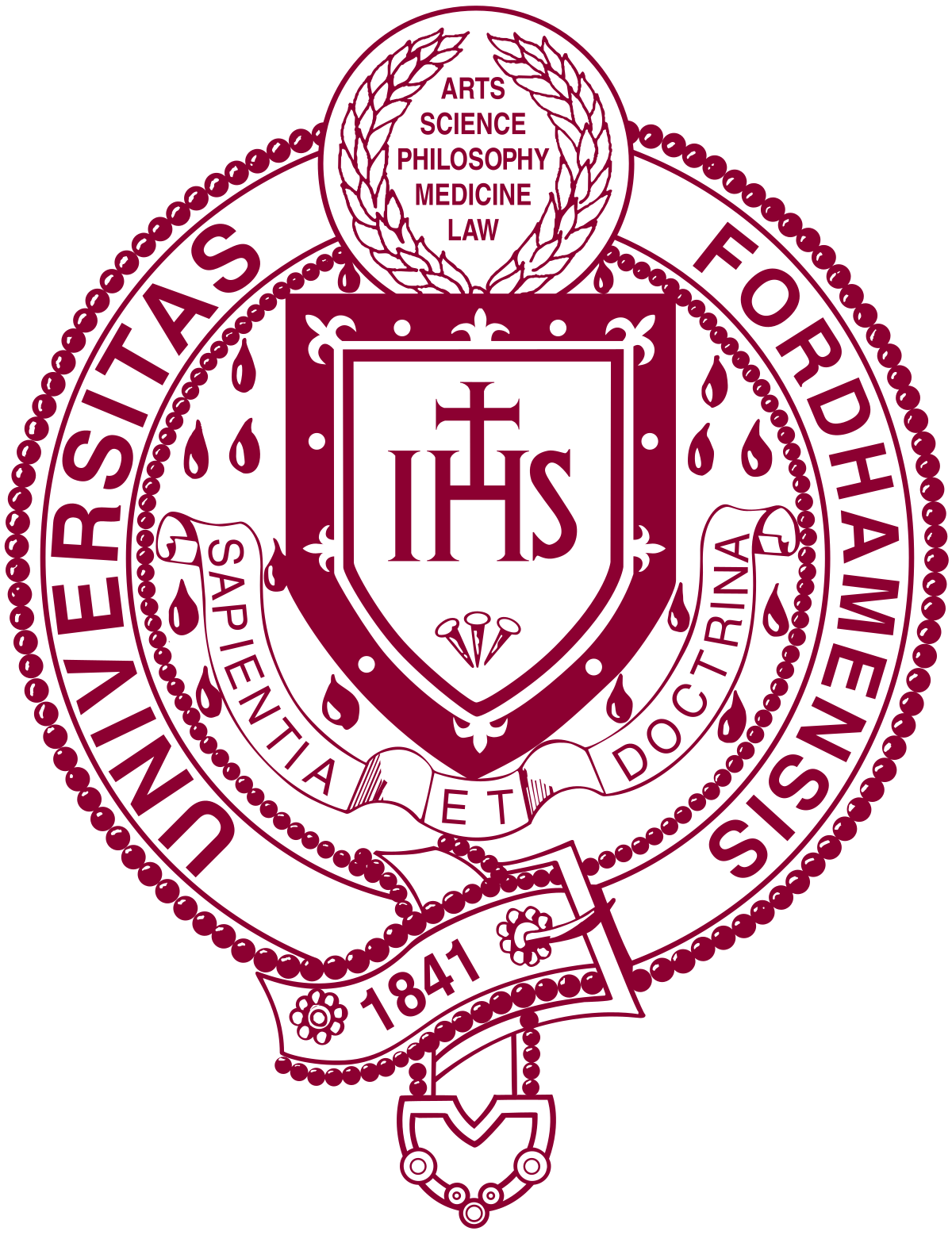
conversation
cooking show
A Taste of Rome's Historic Jewish Cuisine
Rome is home to one of Europe's oldest and most delicious Jewish cuisines. Shaped by centuries of hardship and tightly-bound community, la cucina Ebraica Romana (the Roman Jewish kitchen) is defined by its elegant approach to vegetables, saucy braised meats, love of small and briny fishes, and masterclass level of skill for frying foods in olive oil. Join celebrated cookbook author Leah Koenig for an online cooking demonstration highlighting some of Rome's best dishes. The recipe for concia, a bright and silky marinated zucchini dish, will be made available before the event, so students may pick up ingredients and cook along.
About the Speaker:
Leah Koenig's writing and recipes have appeared in The New York Times, New York Magazine, The Wall Street Journal, The Washington Post, Food & Wine, Epicurious, Food52, and Tablet, among other publications. Leah is the author of six cookbooks including The Jewish Cookbook (Phaidon, 2019) and Modern Jewish Cooking (Chronicle Books). In addition to writing, Leah also leads cooking demonstrations and workshops around the country and world. She lives in Brooklyn, New York with her husband and two children.
Ticket Info: Free; register at yivo.org/Rome-Jewish-Cuisine for a Zoom link
Presented by:

cooking show
book talk
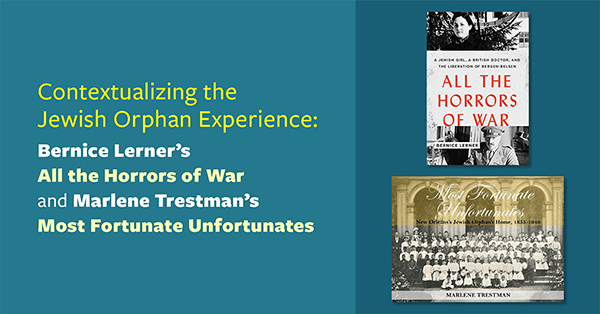
After two years at the Center for Jewish History, the Scholars Working Group “Hear Their Cry:” Understanding the Jewish Orphan Experience presents a talk with two group members about their new books.
Bernice Lerner is a senior scholar at Boston University’s Center for Character and Social Responsibility. She is the author of The Triumph of Wounded Souls: Seven Holocaust Survivors’ Lives and coeditor of Happiness and Virtue beyond East and West: Towards a New Global Responsibility. Dr. Lerner will present on her new book, All the Horrors of War: A Jewish Girl, a British Doctor, and the Liberation of Bergen-Belsen (2020), in which she focuses on the life of her mother, Rachel Genuth. Michael Berenbaum writes, “All the Horrors of War is a powerful and poignant tale that traces both the arc of the war and the history of the Holocaust. In this meticulously researched and detailed account, Lerner never lets the reader forget the humanity of the victims or their liberators.”
Marlene Trestman is an attorney and author of Fair Labor Lawyer: The Remarkable Life of New Deal Attorney and Supreme Court Advocate Bessie Margolin. With exhaustive research and engaging prose, Trestman’s Fair Labor Lawyer recounts Margolin’s inspirational journey from New Orleans Jewish Orphans Home through the New Deal to the nation’s highest courts, where she shepherded the Fair Labor Standards Act of 1938 and the Equal Pay Act of 1963. Prompted by her research on Margolin’s early life and by her own childhood in New Orleans as a Jewish orphan, Trestman’s latest work is Most Fortunate Unfortunates: New Orleans Jewish Orphans’ Home, 1855-1946, forthcoming from Louisiana State University Press.
Followed by a Q&A with both authors.
Ticket Info: Pay what you wish; registration required at /tickets/contextualizing-2021-05-10 to receive a link to the Zoom webinar
Presented by:

book talk
workshop
Multigenerational Family Storytelling Workshop (Teens & Up)
Bring multiple generations of your family together, no matter the distance, for a lively evening of guided storytelling. Participants will learn the importance and how-to’s of family storytelling before breaking off into family groups to explore a list of fun, meaningful questions together. Be prepared to learn surprising new details about your relatives - you may have more in common than you think!
This program is presented by the Center for Jewish History, in collaboration with and with funding from Culture Pass. Culture Pass is a program for cardholding patrons of New York City’s public libraries, the Brooklyn Public Library, New York Public Library, and Queens Public Library. Support for Culture Pass is provided by The New York Community Trust, Charles H. Revson Foundation, Stavros Niarchos Foundation, and the New York City Department of Cultural Affairs. To learn more, visit www.culturepass.nyc.
Ticket Info: Free; registration required at eventbrite.com to receive a link to the Zoom program
Presented by:

workshop
book talk
New Works Wednesdays with José Alberto R. Silva Tavim
In this edition of New Works Wednesday, José Alberto R. Silva Tavimwill discuss his new book "The Diasporas of Jews and New Christians of Iberian Origin between the Mediterranean Sea and the Atlantic Ocean."
This book consists of a set of contributions, with different themes and chronologies, on the general theme of Jews of Iberian origin after the late 15th century conversions, that is, with an official Christian identity; and also about welcoming others, of remote Portuguese origin or not, in contemporary Portugal, but also in other longitudes, such as Egypt and Brazil, in different and sometimes even adverse circumstances.
In the light of the dispersion between the Mediterranean and the Atlantic, one can visit, as an example, the fortunes of some of these New Christians in Portugal, and their presence, assuming again a Jewish identity, in Diaspora lands, in Europe and in the New World. Modernity reveals the resistance in Portugal of an awareness of being Jewish; and also that, alongside this phenomenon, the arrival of other Jews, especially from the Maghreb, is more than just a return, it is actually another stage of permanence in completely different contexts with regard to people's origins, their activities, acceptance and respect for its identity.
About the Speaker:
Editor José Alberto R. Silva Tavim will share insights into the book along with some of the contributors: Hugo Martins, who is in Potsdam with a German research grant, published an article in English about the Jews of Hamburg in the 17th century; Angela Benoliel Coutinho (Portuguese-Cape Verdean) wrote about the migration of Jews from Morocco to Portugal and Cape Verde in the 19th and 20th centuries; and Luís Filipe Meneses, from the University of Belo Horizonte (Brazil), wrote an article about a Brazilian Jewish writer of Moroccan origin - Leão Pacífico Esaguy.
Ticket Info: $8; register at us02web.zoom.us for a Zoom link
Presented by:

book talk
book talk
Information Hunters
Information Hunters examines the unprecedented American effort to acquire foreign publications and information in World War II Europe. An unlikely band of librarians, scholars, soldiers, and spies went to Europe to collect books and documents to aid the Allies’ cause. They traveled to neutral cities to find enemy publications for intelligence analysis and followed advancing armies to capture records in a massive program of confiscation. After the war, they seized Nazi works from bookstores and schools and gathered countless looted Jewish books. Improvising library techniques in wartime conditions, they contributed to Allied intelligence, preserved endangered books, engaged in restitution, and participated in the denazification of book collections. Information Hunters explores what collecting meant to the men and women who embarked on these missions and how the challenges of a total war led to an intense focus on books and documents. Book and document acquisition became part of the apparatus of national security, military planning, and postwar reconstruction. These efforts also spurred the development of information science and boosted research libraries’ ambitions to be great national repositories for research and the dissemination of knowledge that would support American global leadership, politically and intellectually.
About the Speaker:
Kathy Peiss is the Roy F. and Jeannette P. Nichols Professor of American History at the University of Pennsylvania. Her work explores modern American cultural history, gender and sexuality, consumer culture, and the history of books, libraries, and information. Other books include Cheap Amusements: Working Women and Leisure in Turn-of-the-Century New York (1986), Hope in a Jar: The Making of America's Beauty Culture (1998), and Zoot Suit: The Enigmatic Career of an Extreme Style (2011). She has also served as a consultant to museums, archives, and public history projects, and appeared in the documentary films New York, Miss America, and The Powder and the Glory.
Ticket Info: Free; register at forms.office.com for a Zoom link
Presented by:

book talk
lecture
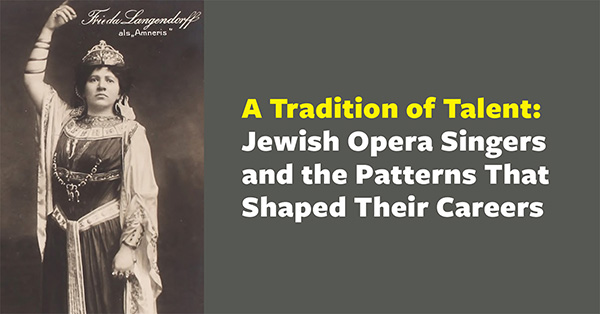
Due to their unique mediation between the score, the stage, and their audiences, singers are one of the most indispensable elements of opera’s performance and reception. Although opera singers have often inspired scholarship about their geographical, social, and ethnic backgrounds, few studies have designed methods for comparing the experiences of large numbers of singers at the same time. What is more, beyond biographies of individual performers, Jews are rarely understood as significant contributors to the American opera scene. Yet examination of their presence in the Center for Jewish History’s archives confirms that there is merit in undertaking devoted study of their vocal careers.
In this talk, Samantha M. Cooper (CJH Dr. Sophie Bookhalter Graduate Fellow in Jewish Culture 2020-2021, NYU Ph.D. Candidate in Historical Musicology) presents the first extended investigation into the patterns that shaped the trajectories of numerous men and women of Jewish descent who pursued careers as opera singers in New York between 1880 and 1940. Drawing on a wealth of archival resources, she unearths over 50 European- and American-born singers from Jewish families who sang in the citadel of America’s opera scene: New York City. Specifically, she attends to how the outsized frequency of name-changing, connections with the synagogue cantorate, performances for Jewish organizations, recordings in Jewish languages, networking with other Jewish musicians, impact of the Holocaust, and dedication to the State of Israel shaped these singers’ professional lives in particularly Jewish ways. Ultimately, Cooper finds that the statistically significant presence of extraordinarily talented Jewish performers in the American opera industry constituted a much more ordinary reality than scholars of American Jewish history have previously realized.
Ticket Info: Pay what you wish; registration required at /tickets/tradition-of-talent-2021-05-05 to receive a Zoom link
Presented by:


lecture
panel discussion
Leftists on Left-Wing Antisemitism
There is a robust discussion inside the Left about antisemitism in its own ranks. This is not just related to Zionism, Israel, and Palestine, but also involves questions about conspiracy theories, notions of secret elites, and critiques of financial capital—as well as how to deal with openly antisemitic actors. This unique panel will bring together four scholars and activists on the Left, who have a range of different views to discuss this. What does antisemitism on the Left actually consist of? Where do different parts of the Left stand in relation to this issue? How is it addressed or ignored? And what are constructive ways the Left can better deal with antisemitism?
Moderated by Spencer Sunshine, this panel will feature Sina Arnold, Shane Burley, Keith Kahn-Harris, and Joshua Leifer.
Ticket Info: Free; register at https://www.yivo.org/Leftists for a Zoom link
Presented by:

panel discussion
lecture
Letters to Jozef Tiso, President of the Slovak State 1939-1945
“…From hour to hour, the most threatening news arrives from every corner of Slovakia about the most threatening measures and deportation of the destroyed, impoverished Jewish population to the former Poland and Russia. Please, I beg of you, Your Honor Mr. President, take steps and stop it… Dear Mr. President, they are sending us to a ready-made slaughter…” Jozef M. Bratislava, March 30, 1942
Between 1939 and 1944, thousands of ordinary people wrote to then President Jozef Tiso of the Slovak State about the so-called “Jewish question.” Some wanted mercy from anti-Jewish persecution, others coveted Jewish property. Why did these individuals write to Tiso? How did the President’s Office process the letters? What fates awaited the Jews who wrote to him? In her talk, Madeline Vadkerty will respond to these questions and describe her research at the Slovak National Archive. She will also read some letters to Tiso and discuss their outcomes, as well as discuss the fates of the letter writers. She will describe what the contents of the letters reveal about the scope and nature of anti-Jewish persecution in the Slovak wartime state.
About the Speaker:
Madeline Vadkerty is a Samuel P. Mandell Fellow in the Holocaust and Genocide Studies Program at Gratz College in Philadelphia, Pennsylvania, where she is pursuing her PhD. She is the author of the book published in March 2020 entitled Slovutný pán president: Listy Jozefovi Tisovi (Your Honor Mr. President: Letters to Jozef Tiso). She is from the United States, but is currently living in Bratislava in order to carry out her research. Her work has appeared in several Slovak and US journals and her book is currently in its second printing.
Ticket Info: Free; register at lbi.org/events/letters-to-jozef-tiso/ for a Zoom link
Presented by:

lecture
panel discussion
Samson Schames and the Art of Exile
The German-Jewish painter Samson Schames represents a generation of artists who were forced to leave their homes due to Nazi persecution and yet demonstrated perseverance and resilience in their newly adopted lands. During his internment in an enemy aliens camp near Liverpool and later during the aerial bombardment of London by Nazi Germany, Schames continued to create art using improvised materials and the detritus of war. He created collages and mosaics of broken glass, nails, and wiring, held together by cement. For paintbrushes he used his own hair. Out of the rubble, Schames produced works of great power which captured the pain and suffering around him.
Using Schames’ life story and examples of his work, our panelists will provide a window into the history of exiled artists during the Nazi period and the impact of exile on their art. William Weitzer, Executive Director of the Leo Baeck Institute, will moderate a discussion about Schames with Annika Friedman from the Jewish Museum Frankfurt and Miriam Bistrovic, Leo Baeck Institute's Berlin Representative.
More about Samson Schames
The painter Samson Schames was born to an Orthodox Jewish family in Frankfurt Germany in 1898, and studied art at the Städelschule. He was an Expressionist and endowed his work with explosive spontaneity displayed through stark, spiky strokes, evoking a closer resemblance to applied arts than classical fine arts of his times. He also designed stage sets for the German theater and for the Jewish theater in Germany which in turn influenced his artworks that had an almost scenic quality.
After the Nazis came to power, life became far more difficult. His art was classified as Degenerate Art by the Nazis. In contrast to other artists, his artworks were not only confiscated, but often destroyed by the Nazi expropriators. He and his wife were forced to flee to London in 1939.
With the start of World War II, England interned German-born men as enemy aliens, ironically including German Jews who had escaped Nazi Germany. During his internment, he remained productive despite having access neither to paint nor brushes. He created collages and mosaics using the debris he found as a result of the Nazi bombings. After the war, Schames lived and continued his career as an artist in the U.S.
Ticket Info: Free; register at eventbrite.com for a Zoom link
Presented by:

panel discussion
book talk
New Works Wednesday and Global Nacao: Chocolate Around the World
Around the globe today, chocolate is embraced not only by enthusiastic consumers but also by truly passionate creators who pour their hearts into their confections.
Here in this convenient guidebook are nearly 300 of these chocolate masters. From Brussels to Boston, Paris to Tokyo, London to Los Angeles, these are some of the most dedicated artisans anywhere.
Special listings for gluten-free, vegan, organic, and other dietary needs are also included.
About the Speaker:
Joshua de Sola Mendes is the proprietor of www.sandpcentral.org and www.grahamesguides.com. He is a proud S&P community member and researcher who works to bring the international communities together through his website, and under a separate hat, make us all happy through insight into chocolate and chocolatiering. Joining his will be master chocolatiers who will share some of their background.
Ticket Info: $8; register at us02web.zoom.us for a Zoom link
Presented by:

book talk
concert
Cry, My Heart, Cry: Songs from Testimonies in the Fortunoff Video Archive, Vol. 2
Many of the Holocaust testimonies of the Fortunoff Video Archive at Yale University include song. The placement of song within Holocaust testimonies speaks to music's power, even in the face of oppression, tyranny, and murder. The songs in Yiddish, Hebrew, Polish, Russian and other languages also give us insight into the wartime experiences of the survivors who sing them and offer a glimpse of the multilingual diversity of their experiences. In 2018 D. Zisl Slepovitch began production of an album of songs drawn from testimonies in the Archive titled Where is Our Homeland? After a successful release captivated audiences around the world, the Fortunoff Video Archive and Slepovitch are now releasing Cry, My Heart, Cry: Songs from Testimonies in the Fortunoff Video Archive, Vol. 2 featuring arrangements of 13 additional songs. Join us to celebrate this release with performances and a live digital discussion with the musicians behind this project.
Joshua Camp (accordion)
Dmitry Ishenko (contrabass)
Craig Judelman (violin)
Sasha Lurje (vocals)
D. Zisl Slepovitch (composer, arranger, producer, woodwinds)
Ticket Info: Free; register at https://www.yivo.org/Fortunoff-Vol2 for a Zoom link
Presented by:

concert
book club
LBI Book Club, Vol. X: Nathan the Wise
One of the most frequently performed and widely read comedies of the eighteenth century, Gotthold Ephraim Lessing's Nathan the Wise (1779) combines rich characterization with an engaging plot. Set in Muslim-ruled Jerusalem at the time of the Crusades, it deals with universal themes -- including the nature of God, antisemitism, wealth and poverty, and the conflict between love and duty. Today the play is as timely as ever. (Macmillan Learning).
Author
Gotthold Ephraim Lessing (1729 – 1781) was a German writer, philosopher, dramatist, publicist and art critic, and an outstanding representative of the Enlightenment era. His plays and theoretical writings substantially influenced the development of German literature. Lessing was not Jewish, but was famous for his friendship with Jewish-German philosopher Moses Mendelssohn. A biography of Mendelssohn's grandson, Felix, describes their friendship as one of the most "illuminating metaphors [for] the clarion call of the Enlightenment for religious tolerance". It was this relationship that sparked his interest in popular religious debates of the time. He began publishing heated pamphlets on his beliefs which were eventually banned. It was this banishment that inspired him to write Nathan the Wise.
Recommended Edition of the Play
Our guest for this book club recommends this particular version of the text, which comes with accompanying essays and historical notes. Of course, any edition is fine, but this will be the edition "officially used" by the book club for the meeting. The book can be purchased on Amazon here.
Our Guest
We are pleased to have Professor Peter Jelavich, who was with us twice last year to discuss Berlin Alexanderplatz, return for our discussion of Nathan the Wise.
Peter Jelavich specializes in the cultural and intellectual history of Europe since the Enlightenment, with emphasis on Germany. His areas of interest include the interaction of elite and popular culture; the history of mass culture and the media; and the application of cultural and social theories to historical study.
He is the author of Munich and Theatrical Modernism: Politics, Playwriting, and Performance, 1890-1914 (1985), Berlin Cabaret (1993), and Berlin Alexanderplatz: Radio, Film, and the Death of Weimar Culture (2006).
He currently is writing a book on censorship of the arts in Germany from 1890 to the present.
Ticket Info: Free; register at eventbrite.com for a Zoom link
Presented by:

book club
panel discussion
The Jewish Experience in Opera
The volume and richness of operatic repertoire drawn from specifically Jewish experience often comes as a revelation to seasoned opera buffs and otherwise knowledgeable devotees of Jewish high culture alike. Yet, dating to the 19th century and continuing on a steep upward incline during the 20th and 21st centuries thus far, very many composers have turned for their operas to themes and subjects of Jewish history, legends, and sacred as well as secular literature. These operas range across several languages, including modern Hebrew and Yiddish.
This panel discussion will include four prominent composers of such operas of Jewish experience: Ofer Ben-Amots, composer of one opera in Hebrew based on The Dybbuk and another in Yiddish on Isaac Bashevis Singer's story, "A Fool's Paradise"; David Schiff, whose opera, Gimpel the Fool is also to a Singer story; Bruce Adolphe, whose operas include Mikhoyels The Wise—about the legendary Soviet Yiddish actor—and Shabbtai Zvi, about the 17th-century so-called "false messiah" naively followed by many thousands of Jews; and Alex Weiser, who wrote an opera about Theodor Herzl, State of the Jews, with librettist Ben Kaplan who will also join the panel.
Introduced and moderated by YIVO's Anne E. Leibowitz Visiting Professor-in-Residence in Music Neil W. Levin, the discussion among the panelists will address questions and issues of topic selection; musical interpretations or reinterpretations of Jewish stories, events, or characters; Jewish aesthetics vis-a-vis the operatic medium; intertwining roles between composer and librettist and/or author; the variety of musical approaches to Jewish themes; and the universal resonance of otherwise specifically Jewish subjects, when viewed through an operatic prism; and what qualifies as a "Jewish opera."
Ticket Info: Free; register at https://www.yivo.org/Jewish-Opera for a Zoom link
Presented by:

panel discussion
lecture
Global Nacao: Dayan Dilemmas
In the past, when Jewish communities were largely insulated and autonomous, the functions and jurisdiction of a Beth Din were more clearly defined. In today's global world, where Jewish communities are less clearly defined, and the Beth Din is largely a private endeavor operating within the general legal framework of the local government, many dilemmas regarding authority and jurisdiction arise. Dayan Ofer Livnat will try to address some of the dilemmas dayanim are faced with, and in particular how they relate to issues of Jewish identity, conversions and monetary disputes.
About the Speaker:
Dayan Ofer Livnat serves as a Dayan on the Sephardi Beth of London. A graduate of the Eretz Hemdah Institute for Advanced Jewish Studies in Jerusalem, Dayan Livnat teaches in a number of programs for training rabbis and Dayanim, including the Semicha and Dayanut Programs run jointly by the Montefiore Endowment of London and Eretz Hemdah. A lecturer on Tanach at the Jerusalem College as well, Dayan Livnat has previously served in an artillery unit in the IDF and is currently studying for a PhD in Jewish studies at University College London.
Ticket Info: $8; register at us02web.zoom.us for a Zoom link
Presented by:

lecture
book talk
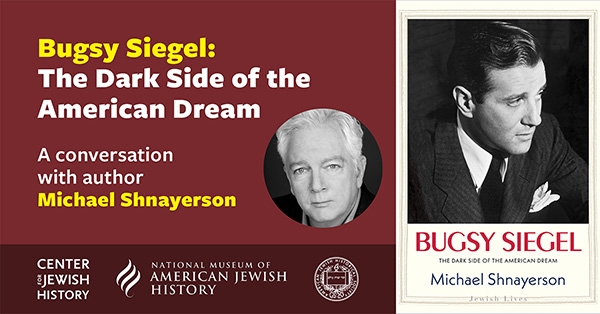
In a brief life that led to a violent end, Benjamin “Bugsy” Siegel (1906–1947) rose from desperate poverty to ill-gotten riches, from an early-twentieth-century family of Ukrainian Jewish immigrants on the Lower East Side to a kingdom of his own making in Las Vegas. In this captivating portrait, author Michael Shnayerson sets out not to absolve Bugsy Siegel but rather to understand him in all his complexity.
Through the 1920s, 1930s, and most of the 1940s, Bugsy Siegel and his longtime partner in crime Meyer Lansky engaged in innumerable acts of violence. As World War II came to an end, Siegel saw the potential for a huge, elegant casino resort in the sands of Las Vegas. Jewish gangsters built nearly all of the Vegas casinos that followed. Then, one by one, they disappeared. Siegel’s story laces through a larger, generational story of eastern European Jewish immigrants in the early- to mid-twentieth century.
Program registrants will receive a code for 30% off and free shipping on the book.
This program is funded, in part, by a Humanities New York CARES Grant, with support from the National Endowment for the Humanities and the federal CARES Act, and by public funds from the New York City Department of Cultural Affairs in partnership with the City Council.
Ticket Info: Pay what you wish; registration required at /tickets/bugsy-siegel-2021-04-26 to receive a Zoom link
Presented by:

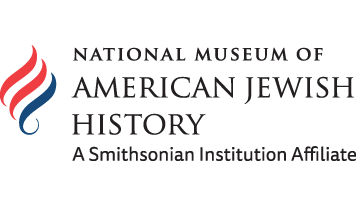

book talk
virtual tour
Global Nacao: Tour of the Venice Ghetto
Tour the Venice Ghetto with Moshe Bassali.
About the tour guide:
Moshe Bassali was born in Milan to Sephardic Jewish parents that came to Italy from Iran in the 1950's and married in Italy. His mother arrived at age 12 and went to school in Milan. Moshe has a degree in economics, works in diamonds, and is an official certified tour guide for Venice and Italy. He has been working in Venice since 1991 and after his marriage, Moshe and his wife, Tally, decided to move there. Currently they have three children. Moshe's father and brothers still live in Milan.
Ticket Info: $8; register at us02web.zoom.us for a Zoom link
Presented by:

virtual tour
lecture
Sephardi Thought and Modernity: In Praise of the Orient: Elia Benamozegh’s Sephardic Modernities
The intention of this series is to spark the interest in processes of Jewish modernization not exclusively mediated by Europeanization. The questions we will be dealing with are related to non-dichotomic identities, multiplicity and loss of language, colonization, social transformation, and intellectual responses to it. We will approach these questions by looking at Jewish-Arab influences, the Sephardi response to European modernization, the responses of the rabbinic leadership and the work of Sephardi intellectuals.
April 22nd: Clemence Boulouque (Columbia University): In praise of the Orient: Elia Benamozegh’s Sephardic Modernities
Ticket Info: Free; register at ucalgary.zoom.us for a Zoom link
Presented by:

lecture
book talk
Sutzkever Essential Prose
Sutzkever Essential Prose brings the largely unknown prose of seminal Yiddish poet Avrom Sutzkever to English readers in new translations by Zachary Sholem Berger. In these works, Sutzkever blurs the lines between fiction, memoir, and poetry; between real and imagined; between memory and metaphor. He offers haunting scenes drawn from a vast imagination and from the unique life he lived—his youth in Siberia and Vilna, his trauma as a partisan fighter and a survivor of the Holocaust, and his post-war life as a Yiddish poet in Israel. Join us for a conversation celebrating this new book with translator Zachary Sholem Berger and scholars Miriam Trinh and Karolina Szymaniak, moderated by Justin Cammy.
About the Participants
Zackary Sholem Berger is a poet and translator working in Yiddish, Hebrew, and English. His work has appeared in Poetry magazine, the Yiddish Forward, and Asymptote and elsewhere. Themes of his verse range from the philosophical and medical to the immediate problems of his adopted city Baltimore. In the Yiddish world he might be best known as a regular contributor to the Forverts and the translator of Dr. Seuss's Cat in the Hat (as well as other Seuss creations) into Yiddish.
Dr. Miriam Trinh is a professor of Yiddish and Yiddish literature at Hebrew University. Co-founder of “Yo”-Yidish-Ort, a center for Yiddish language and culture in Tel-Aviv and Jerusalem, Trinh is a noted Yiddish educator including at many international summer courses around the world.
Justin Cammy is chair and associate professor of Jewish Studies and World Literatures at Smith College, and senior fellow of the Goldreich Institute for Yiddish at Tel Aviv University. He is the author of the introduction to The Full Pomegranate, a recent volume of Sutzkever poetry translated by Richard Fein. Cammy's own translation of Sutzkever's memoir Vilna Ghetto will appear with McGill-Queens University Press in 2021.
Karolina Szymaniak is assistant professor at the Jewish Studies Department at the University of Wroclaw and Research Fellow at the Jewish Historical Institute. Her research interests range across modern Yiddish literature, Polish-Jewish cultural relations, and translation studies. In addition to having taught Yiddish language and culture throughout Poland and Europe, she has also served as a consultant for the POLIN Museum and the Museum of Modern Art in ?ódz. Her recent publications include Montages. Debora Vogel and the New Legend of the City and My wild goat. Anthology of women Yiddish poets (in Polish). She is also the editor of Rachel Auerbach's ghetto writings, which received the 2016 Polityka History Award.
Ticket Info: Free; register at yivo.org/Sutzkever-Essential-Prose for a Zoom link
Presented by:

book talk
book talk
The Soul of Judaism - Jews of African Descent in America
Author Dr. Bruce D. Haynes speaks of his recent work The Soul of Judaism in conversation with Dr. Michael Alexander. The Soul of Judaism offers the first exploration of the full diversity of Black Jews, including bi-racial Jews of both matrilineal and patrilineal descent; adoptees; black converts to Judaism; and Black Hebrews and Israelites, who trace their Jewish roots to Africa and challenge the dominant western paradigm of Jews as white and of European descent.
Blending historical analysis and oral history, Haynes showcases the lives of Black Jews within the Orthodox, Conservative, Reconstruction and Reform movements, as well as the religious approaches that push the boundaries of the common forms of Judaism we know today. He illuminates how in the quest to claim whiteness, American Jews of European descent gained the freedom to express their identity fluidly while African Americans have continued to be seen as a fixed racial group. This book demonstrates that racial ascription has been shaping Jewish selfhood for centuries. Pushing us to reassess the boundaries between race and ethnicity, it offers insight into how Black Jewish individuals strive to assert their dual identities and find acceptance within their respective communities.
About the Speakers:
Bruce D. Haynes was born in Harlem, New York. After receiving his B.A. in Sociology from Manhattanville College, he conducted applied research, under sociologist and jury expert Jay Schulman, selecting juries for trials throughout New York State. From there he went on to earn his doctorate in sociology from the City University of New York (1995) and was appointed Assistant Professor of Sociology and African-American Studies at Yale University in 1995. In 2001, he joined the faculty at the University of California, Davis, where he now serves as Professor of Sociology. In addition, he is now a Senior Fellow in the Urban Ethnography Project at Yale University. In 2019 he was awarded the Albert J. Raboteau Book Prize for the Best Book in Africana Religions.
Michael Scott Alexander is the Maimonides Chair of Jewish Studies and Associate Professor of Religious Studies at U.C. Riverside. He is the author of Jazz Age Jews, which won the National Jewish Book Award, and Making Peace with the Universe: Personal Crisis and Spiritual Healing. Alexander earned a Ph.D. in Religious Studies from Yale University and a B.A. in Near Eastern Languages & Civilizations from the University of Pennsylvania. He has been faculty at the University of Oklahoma, as well as Temple University where he was director of the Feinstein Center for American Jewish History. He has served on the board and as associate editor of American Jewish History, where he guest edited several volumes, including co-editing “The Color Issue” with Prof. Bruce Haynes (U.C. Davis). Alexander writes about Jewish history, psychology of religion, and medical humanities.
Ticket Info: Free; register at forms.office.com for a Zoom link
Presented by:

book talk
lecture
Global Nacao: How the Unique Confluence of Culture can Benefit Modern Jewry
Western Sephardim have lived in the West for over 400 years. Yet their unique background in Spain, rather than Germany and France, has given them a different lens on Western life and thought and we just may discover valuable lessons from them.
Ticket Info: $8; register at us02web.zoom.us for a Zoom link
Presented by:

lecture
concert
Continuing Evolution 2: Yiddish Folksong in Classical Music
Join us for a digital premiere performance of 5 new compositions engaging with Yiddish folksongs. The new works by composers Derek David, David Ludwig, Anthony Russell, Daniel Schlosberg, and Dan Shore, were commissioned by YIVO and will be presented alongside archival recordings of the folksongs that they are reimagining. Performances will be by members of the Bard Graduate Vocal Arts Program. These new works carry forward a trend which began with Joel Engel's 1909 set of folksong arrangements and includes many works by composers of the Society for Jewish Folk Music as well as composers such as Maurice Ravel, Sergei Prokofiev, Stefan Wolpe, Frederic Rzewski, Julia Wolfe, and others. YIVO began contributing to this repertoire with the commission of 5 new works for a performance in Spring 2020 and continues to build on this legacy with this concert.
About the Performers
The Graduate Vocal Arts Program at Bard Conservatory is a unique Master of Music program in vocal arts. Created to prepare the young singer for the special challenges of pursuing a professional life in music in the 21st century, this two-year MM degree program balances a respect for established repertory and expressive techniques with the flexibility and curiosity needed to keep abreast of evolving musical ideas. Students work on operatic, art song, chamber music, and new music repertoire throughout the coursework of the program. Operatic repertoire is studied and performed throughout the curriculum and in fully staged productions at the Richard B. Fisher Center for the Performing Arts. The program also includes a strong practical component, with seminars and classes on career skills led by some of the leading figures in arts management and administration.
Ticket Info: Free; register at yivo.org/Continuing-Evolution2 for a Zoom link
Presented by:


concert
book talk
The Light of Days: the Untold Story of Women Resistance Fighters in Hitler’s Ghettos
Judy Batalion's new book, The Light of Days: The Untold Story of Women Resistance Fighters in Hitler’s Ghettos—already optioned by Steven Spielberg for a major motion picture—brings the largely unknown stories of Jewish women resistance fighters to light. Join us for a conversation with Batalion about this new book led by Andrew Silow-Carroll (New York Jewish Week).
Witnesses to the brutal murder of their families and neighbors and the violent destruction of their communities, a cadre of Jewish women in Poland—some still in their teens—helped transform the Jewish youth groups into resistance cells to fight the Nazis. These “ghetto girls” paid off Gestapo guards, hid revolvers in loaves of bread and jars of marmalade, and helped build systems of underground bunkers. They bombed German train lines and blew up a town’s water supply. They also nursed the sick and taught children.
Ticket Info: Free; register at yivo.org/Women-Resistance-Fighters for a Zoom link
Presented by:

book talk
conversation
A Conversation on Charlotte Salomon
Griselda Pollock (University of Leeds, UK) will be in conversation with Kerry Wallach (Gettysburg College, PA) about the work and life of the Berlin-born Jewish artist, Charlotte Salomon (1917-1943).
Murdered with her unborn child on arrival at Auschwitz in 1943 at the age of 26, Charlotte Salomon left behind an artistic legacy that is as beguiling as it is perplexing. A single, composite artwork of images, text and music that she titled Leben? oder Theater? (Life? Or Theater?) comprises 784 paintings in a variety of modes produced in one year between 1941 and 1942 in the South of France. Salomon began the work after having spent several months in a French concentration camp at Gurs where many ‘German’ refugees in the France had been interned, including Hannah Arendt. In 1943, Salomon had been forced into hiding once Italy, hitherto controlling the Nice region where so many Jewish refugees had sought refuge, fell to German control after Hitler’s invasion of Italy. Pollock is the author of Charlotte Salomon and the Theatre of Memory (Yale U. Press, 2018. She has described Leben? oder Theater? as “an event in the history of modern art,” and has sought to present a searching analysis of Salomon’s paintings through the lenses of feminist art history and Jewish studies in order to draw out a more complex range of meanings in the work than are usually ascribed to it when it has treated as a visual autobiography.
Kerry Wallach, the author of Passing Illusions: Jewish Visibility in Weimar Germany (U. of Mich. Press, 2017), brings to the conversation insights that she has gained from her research on German-Jewish culture as well as new ones related to the preparation of the first book-length study of East European-born Jewish artist and illustrator Rahel Szalit-Marcus (1888–1942).
Ticket Info: Free; register at eventbrite.com/e/a-conversation-on-artist-charlotte-salomon-tickets-132447779875 for a Zoom link
Presented by:

conversation
lecture
Global Nacao: Five London Hakhamim in the Early Enlightenment
The centers of Sephardic life in early modern Europe--Amsterdam, London, Hamburg, Livorno, Venice--were at the very same time the fulcrum of Enlightenment culture. While we know about Sephardic figures like Spinoza and da Costa who were deeply engaged with Enlightenment ideas, most Sephardim were engrossed in commerce. What was on the minds of their Hakhamim, who, in the case of London, lived in close proximity to Locke, Newton and Boyle?
About the Speaker:
Professor Matt Goldish, Dept. of History, Ohio State University is a specialist in Jewish and European History, with interests in Messianism, Jewish-Christian intellectual relations, and Sephardic studies. He holds the Samuel M. and Esther Melton Chair in Jewish History. He earned his B.A. degree from the University of California, Los Angeles in 1986. His Ph.D. (1996) is from Hebrew University of Jerusalem. Professor Goldish has published "Judaism in the Theology of Sir Issac Newton" (Dordrecht: Kluwer-- International Archives of the History of Ideas, 1998), "The Sabbatean Prophets" (Cambridge, Mass.: Harvard University Press, 2004), "Jewish Questions: Responsa on Jewish Life in the Early Modern Period" (Princeton: Princeton University Press, 2008), and several edited collections, as well as articles and book reviews. Professor Goldish is active as an invited lecturer in various academic and community environments.
Ticket Info: $8; register at us02web.zoom.us for a Zoom link
Presented by:

lecture
virtual tour
Global Nacao: Synagogue Tour - Indonesia, Dominican Republic, and St. Thomas
Join us as we explore three more Western Sephardi communities that have spread around the globe.
Indonesia:
Yaakov Baruch was born in Jakarta, Indonesia. His grandmother's family came from the Netherlands. In 2004 Mr. Baruch opened a synagogue for the Jews of the Netherlands who remain in Indonesia.
Dominican Republic:
Dr. Hakham Yehonatan Elazar-Demota was born in Miami. He comes from a long line of Sephardic families from Spain, Portugal, and North Africa who established themselves in the Caribbean. He is trained as a Hakham, shochet, and mohel. The Sephardic community in La Romana, Dominican Republic was established in 2013. Today there are over 50 families that gather there. The synagogue was established in 2017 in its current location. Members from the community built the hekhal, teba, and a wooden menorah for Hanukkah.
St. Thomas:
The Hebrew Congregation of St. Thomas was founded by nine Sephardic Jewish families of Spanish and Portugese descent. Today, it is the oldest synagogue building in continuous use under the American flag and the second oldest in the western hemisphere. Rabbi Michael Feshbach has been leading the congregation since 2017.
Ticket Info: $8; register at us02web.zoom.us for a Zoom link
Presented by:

virtual tour
conversation
At Lunch with Trish Hall
Author and journalist Julie Salamon (Wall Street Journal and NY Times) sits down with influential cultural leaders in the Jewish American Community; we'll hear their thoughts about working in this present moment, current projects, and what they have to say about their Jewish identity. Grab your lunch and tune in for our conversation with Trish Hall, writer and former New York Times editor & journalist.
Our Guest This Month: Trish Hall- is a writer and journalist who worked for the New York Times for more than two decades. She initially joined the paper from The Wall Street Journal as a food reporter and eventually oversaw all the feature sections as a member of the masthead. For almost five years, she served as the Op Ed editor. She expanded the reach and the nature of digital offerings, winning an Emmy for an Op Doc produced by her team. She also created the Sunday Review, which since its inception has been one of the most popular sections at the Times. Her book for Norton, "Writing to Persuade," was published in June 2019. She lives in New York City.
Interviewed By: Julie Salamon- is an American author, critic and storyteller. She worked at The Wall Street Journal for five years first as a commodities and banking reporter before spending eleven years as the paper's film critic. Later she became a staff journalist at The New York Times where she was a TV critic and arts reporter. Later she gained fellowships at the MacDowell Colony and became a Kaiser Media Fellow. She has written both fiction and non-fiction books for adults and children-- and produced articles for magazines that include The New Yorker, Vanity Fair, Vogue, Bazaar, and The New Republic. Her books have received wide critical and popular attention, she has just completed "Unlikely Friends," a memoir for Audible Original, scheduled for release in 2021.
Ticket Info: Free; register at forms.office.com for a link to the Zoom program
Presented by:

conversation
lecture
Family History Today: Researching your Family History in Israel from Home
Rescheduled from January 21, 2021
Searching for records of your family in Israel can be daunting. Fortunately, much of your research can now be done online. In this lecture, Garri Regev, President of the Israel Genealogy Research Association (IGRA), will provide an overview of the types of records available online and where to focus your efforts. In addition, you will learn about alternatives to vital records and how you can create a vivid picture of how your ancestors lived in Israel.
This program is funded, in part, by a Humanities New York CARES Grant, with support from the National Endowment for the Humanities and the federal CARES Act, and by public funds from the New York City Department of Cultural Affairs in partnership with the City Council.
Ticket Info: Pay what you wish; registration required at /tickets/family-history-today-2021-04-15 to receive a link to the Zoom program
Presented by:

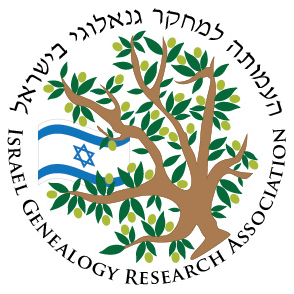
lecture
lecture
Glikl's Afterlives: On the Circulation and Reception of Glikl's Memoirs
How did Glikl, often referred to as "Glückel von Hameln," become such an iconic and oft-cited figure in Ashkenazic cultural history? In this talk, Matthew Johnson ventures an answer to this question by exploring the belated circulation and reception of Glikl's memoirs (written between 1691 and 1719) in the late nineteenth and early twentieth centuries. Johnson will provide an overview of the particular editions and translations—in Yiddish, German, Hebrew, and English—that first made Glikl's memoirs available to a large audience and shaped how they were read and understood, often in contradictory ways, in modernity.
About the Speaker:
Matthew Johnson is a PhD candidate in Germanic Studies at the University of Chicago. His dissertation concerns the relationship between Yiddish- and German-language literature in the twentieth century. His research has been supported by the YIVO Institute, the Fulbright Program and the IFK in Vienna, the Posen Society of Fellows, and the Yiddish Book Center.
Ticket Info: Free; register at yivo.org/Glikl for a Zoom link
Presented by:

lecture
lecture
Rich Cultural Heritage of Bukharian Jews II: Language and Literature
On the heels of previous IJE sessions on Bukharian Jewish history and culture, we invite you to join us for a deeper dive into the literary and linguistic tradition of Bukharian Jews. Through our exploration of the eclectic literature and dynamic language of Bukharian Jews, we will discover some of the essential ways in which this Central Asian Jewish community has developed its vibrant and multifaceted culture. Our discussion will take us on a journey to Central Asia, Iran, Afghanistan, the Land of Israel, the United States and beyond.
Originally from Uzbekistan, Ruben Shimonov grew up in Seattle, where he obtained his BA in International Relations, Near Eastern Studies, and Jewish Studies at the University of Washington. As a Bukharian Jew—whose multilayered identity lies at the intersection of Mizrahi, Sephardic, and Russian-speaking Jewish (RSJ)—Ruben roots his work as an educator, social innovator, and community builder in a deep passion for the diverse cultural mosaic of the Jewish people.
Ticket Info: $10; register at us02web.zoom.us for a Zoom link
Presented by:

lecture
book talk
Julie Metz and Ariana Neumann in Conversation: Eva and Eve
Julie Metz's mother Eve was the quintessential New Yorker–steely, savvy, thrifty, pragmatic, brusque. It was difficult to imagine her living anywhere else except the Upper West Side of Manhattan, but New York City was in fact her adopted home. She was born in Vienna to a comfortable, middle class Jewish family until Germany annexed Austria on March 12th, 1938.
In the two years following the Nazi takeover, her father Julius struggled to find a safe haven for his wife and children. Across the ocean, anti-immigration fervor prevailed as part of the initial America First movement. Miraculously, Julius got his family out of Vienna just in time, thanks to perseverance, a medicine package made of folded paper, a sympathetic American Vice Consul, and good luck.
Shortly after Eve’s death, Metz found a keepsake book her mother had kept hidden in a drawer for over half a century, filled with farewell notes from her childhood friends and relatives. In that secret keepsake book, her mother’s name was Eva. Inspired by this discovery, Metz set out in search of her mother’s lost childhood. The result is Eva and Eve, a real-life detective story that offers moments of grace, serendipity, and lessons for this polarized moment when once again Otherness is the enemy.
Please join us as Julie Metz engages in conversation with Ariana Neumann, who in similar fashion wrote about her family's past as Jews living in Prague at the time of the Nazi occupation. Both women in their work bring to light answers to questions that they had learned, growing up in their families, were not to be asked. Ariana Neumann's own work, When Time Stopped: A Memoir of my Father's War and What Remains, was published in 2020. It was a winner of the 2020 National Jewish Book Award for Best Memoir. Both women have appeared on the New York Times Bestseller List.
About the Speakers:
Julie Metz is the New York Times bestselling author of Perfection. She has written for publications including The New York Times, Salon, Dame, Redbook, and Glamour. She has received fellowships at Yaddo, the MacDowell Colony, the Virginia Center for the Creative Arts, and The Vermont Studio Center. She lives with her family in the Hudson Valley. You can find out more about Julie’s writing life on Instagram: @JulieMetzWriter and her website.
Ariana Neumann was born and grew up in Venezuela. She has a BA in History and French Literature from Tufts University, an MA in Spanish and Latin American Literature from New York University and a PgDIP in Psychology of Religion from University of London. She previously was involved in publishing, worked as a foreign correspondent for Venezuela’s The Daily Journal and her writing also appeared in The European. She currently lives in London with her family. When Time Stopped is her first book. Listen to a podcast with Ariana Neumann here.
Order their Books
Eva and Eve: A Search for My Mother's Lost Childhood and What a War Left Behind.
When Time Stopped: Memoirs of my Father's War and What Remains
Ticket Info: Free; register at eventbrite.com for a Zoom link
Presented by:

book talk
lecture
The Untold Story of Bukharian Jews During WWII
Manashe Khaimov presents a unique intergenerational video project that documented the little-told story of the role of the Bukharian Jews in World War II; in addition to the stories of Ashkenazi Jews who were evacuated from their homes and fled to Central Asia.
Ticket Info: $10; register at us02web.zoom.us for a Zoom link
Presented by:

lecture
book talk
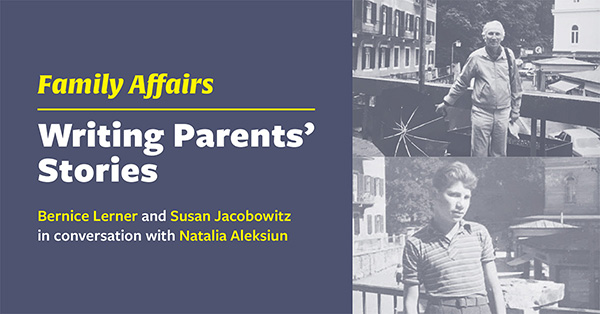
In the fourth program of the series, Bernice Lerner, author of All the Horrors of War: A Jewish Girl, a British Doctor and the Liberation of Bergen-Belsen (Johns Hopkins, 2020) and Susan Jacobowitz, author of the manuscript Far from Childhood: A Holocaust Memoir, discuss with Natalia Aleksiun their parents' interrupted childhoods during the Holocaust in the Carpathian Mountains. The authors will reflect on their work uncovering the life trajectories of Rachel Genuth and Henryk Jakobowicz and the link between their own familiarity with and distance from the stories. They will share insights about the role of their own scholarship and writing about intimate tales of suffering, rupture, continuity, and courage.
Ticket Info: Pay what you wish; registration required at /tickets/family-affairs-2021-04-07 to receive a link to the Zoom webinar
Presented by:

book talk
book club
LBI Book Club, Vol. IX: The Spirit Returneth by Selma Stern
The Spirit Returneth tells the story of a Jewish family living in Jewish communities along the Rhine in the fateful years of 1348 and 1349. Through following the children of one family, who leave home to marry and start families of their own or to study, we follow the progression of the Black Death as it spreads across Germany, bringing with it horrific pogroms and massacres of Jews. As the disease and accompanying violence spreads, we watch the characters, Jews but also Christians sympathetic to them, struggle for survival and/or accept death. The book was published immediately after the Holocaust in 1946, and both at the time and today reviewers have noted that the novel deals with the Holocaust in actuality, but the author chose to distance herself from the immediate event and purposely set her novel in an "earlier Holocaust" of the Jewish people in Germany.
Author
Selma Stern (1890 - 1981) was one of the first women to become a professional historian in Germany. Her writings in history dealt with Jewish history, and included the history of Jewish emancipation, the Court Jews of the Early Modern period, She is best-remembered for her seven-volume work The Prussian State and the Jews. A research fellow at the Akademie für die Wissenschaft des Judentums in Berlin, she received her doctorate and married the director and founder of the academy, Eugen Täubler. In 1941 they fled to the United States, some of the last Jews able to flee Germany. Settling in New York at first, they then went to the Hebrew Union College in Cincinnati, where she worked as an archivist. Eugen died in 1953. Selma Stern retired in 1955, quickly becoming one of the founders of the Leo Baeck Institute. In 1960 she moved to Switzerland to live near her sister, where she continued to write as well. She died in Basel in 1981.
Where to Get the Book
The Leo Baeck Institute has received permission from the publisher to copy and share the book with members of the book club, as the book is out of print. Once you register for the event, you will receive a link to a copy of the book in our Dropbox account in your order confirmation email. You can download the book and read it online, or if you have access to a printer you can print it out and read the hard copy. You will also find a copy here and there using Ebay, Amazon, and other book selling websites, but they are rare to find and often expensive. That said, you can sometimes find a cheap copy as well.
Ticket Info: Free; register at eventbrite.com for a Zoom link
Presented by:

book club
panel discussion
The Blood Libel: New Media and Conspiracy Theories
Magda Teter will join David N. Myers to discuss the story of Simon of Trent and the role of print media in spreading conspiracy theories.
More than 600 years ago, a conspiracy theory about the murder of children went viral in a brand new medium, and it has circulated in ever-changing forms to the present day, inspiring vigilantism, mob violence, and state persecution.
Magda Teter (Fordham University), whose new history of the "Blood Libel" tracks its origins and spread, will join fellow historian David N. Myers (UCLA) to discuss the story of Simon of Trent as a case study in how a new medium – print – accelerated the spread of conspiracy theories.
Simon was a toddler whose dead body was found on Easter Sunday in 1475 in a canal under the home of a Jewish family in the city of Trent, then part of the Holy Roman Empire (now Italy). The town’s Jews were accused of killing Simon as part of a supposed Jewish ritual that required the blood of a Christian child, and the trial resulted in the destruction of Trent’s Jewish community and the creation of a cult with little Simon at its center. As historian Magda Teter notes in her essay on the incident for Leo Baeck Institute's Shared History Project, “The trial had a long-term impact on Jewish history, Catholic history and canon law, and the history of antisemitism. Its reverberations are still felt today.”
While this incident was not the first or last trial of Jews accused of killing a Christian child, it took on a life of its own because it happened soon after the advent of the printing press. This allowed for the first time a broad dissemination of stories, inspiring literary and artistic productions that became increasingly detached from reality as they spread.
This history matters more than ever today as mis- and disinformation spread in another new medium destabilize institutions and inspire violence.
About the Panelists
Magda Teter is Shvidler Chair in Judaic Studies and Professor of History at Fordham University. Her work focuses on early modern religious and cultural history, with emphasis on Jewish-Christian relations, the politics of religion, and transmission of culture among Jews and Christians across Europe in the early modern period. She published numerous articles and books in English, Polish, Italian, and Hebrew. Teter was recently appointed the 2020-2021 National Endowment for the Humanities Senior Fellow at the Center for Jewish History, and she will be working on her current research project, The Dissemination and Uses of the Jewish Past: The Role of The Present in The Production and Politics of History.
David N. Myers is the Sady and Ludwig Kahn Professor of Jewish History at UCLA, where he serves as the director of the UCLA Luskin Center for History and Policy. He is the author or editor of fifteen books in the field of Jewish history, including a forthcoming book with Nomi Stolzenberg on the Satmar Hasidic community of Kiryas Joel, New York. Myers serves as President of the New Israel Fund.
Ticket Info: Free; register at eventbrite.com for a Zoom link
Presented by:

panel discussion
cooking show
What's Cooking for Passover - The Cream Puff Challenge!
Culinary historian Sarah Lohman gives a live demonstration from her kitchen.
A light fluffy choux pastry filled with cream that’s kosher for Passover? Sounds like a challenge! Culinary historian Sarah Lohman hosts a live demonstration with step-by-step instructions to help you whip up this delicate and delicious treat. Director of Collections Melanie Meyers pulls from several of the Passover cookbooks found in our collections that document how food trends have changed and evolved for this holiday. The ingredients tell a story of immigration, trade, and intersectionality- understanding through food, the diversity of the American Jewish community.
Ticket Info: Free; register at forms.office.com for a Zoom link
Presented by:

cooking show
book talk
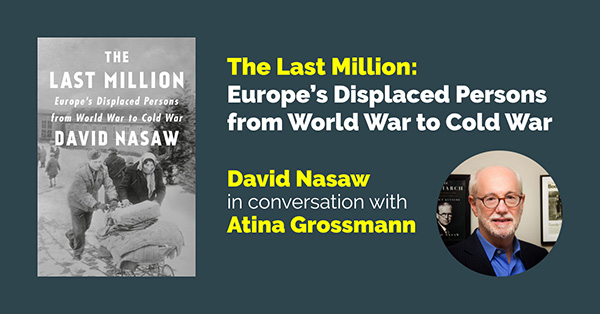
Historian David Nasaw is the author of the award-winning, acclaimed biographies The Patriarch, Andrew Carnegie, and The Chief. In his sweeping new masterwork, THE LAST MILLION: Europe’s Displaced Persons from World War to Cold War (Penguin Press), Nasaw turns his attention to the gripping yet little-known story of the million displaced persons left behind in Germany following the end of World War II: Jews, Poles, Estonians, Latvians, Lithuanians, Ukrainians, and other Eastern Europeans who refused to go home or had no homes to return to. The Last Million would spend the next three to five years in displaced persons camps, temporary homelands in exile, divided by nationality, with their own police forces, churches and synagogues, schools, newspapers, theaters, and infirmaries. By 1952, the Last Million were scattered around the world. As they crossed from their broken past into an unknowable future, they carried with them their wounds, their fears, their hope, and their secrets.
Nasaw will share this history in a wide-ranging conversation with Atina Grossmann, author of Jews, Germans, and Allies: Close Encounters in Occupied Germany (Princeton University Press) and Professor of History in the Faculty of Humanities and Social Sciences at the Cooper Union, whose research relates to transnational Jewish refugee stories.
This program is funded, in part, by a Humanities New York CARES Grant, with support from the National Endowment for the Humanities and the federal CARES Act, and by public funds from the New York City Department of Cultural Affairs in partnership with the City Council.
Ticket Info: Pay what you wish; registration required at /tickets/the-last-million-2021-03-24 to receive a Zoom link
Presented by:

book talk
panel discussion
Nazi-Looted Art and Archives: Recovering and Preserving Jewish Culture
The ravages of the Holocaust and post-World War II led to the theft and disappearance of art, archives, and personal assets. Join Jonathan Brent and Howard Spiegler for a discussion on the quest to recover and preserve these cultural treasures.
About the Speakers:
Jonathan Brent is the Executive Director of the YIVO Institute for Jewish Research in New York City. From 1991 to 2009 he was Editorial Director and Associate Director of Yale Press. He is the founder of the world acclaimed Annals of Communism series, which he established at Yale Press in 1991. Brent is the co-author of Stalin’s Last Crime: The Plot Against the Jewish Doctors, 1948-1953 (Harper-Collins, 2003) and Inside the Stalin Archives (Atlas Books, 2008). He is now working on a biography of the Soviet-Jewish writer Isaac Babel. Brent teaches history and literature at Bard College.
Howard Spiegler is co-chair of Herrick, Feinstein LLP’s Art Law Group, handling all aspects of commercial art matters. Working with other specialists in the firm, Howard advises clients on international trade issues, loans, museum and private exhibitions, organization and structuring of businesses, estate planning, insurance issues, art financing, tax, criminal law concerns, and other matters.
He has been integrally involved in some of the most important litigations brought on behalf of foreign governments and heirs of Holocaust victims and others to recover stolen artwork or other cultural property, including the precedent-setting “Portrait of Wally” case, in which he settled a litigation, with the assistance of the U.S. Government, brought on behalf of an estate to recover a painting confiscated by a Nazi agent in the late 1930s, the recovery on behalf of the family of the famous Soviet artist Kazimir Malevich of a number of extremely valuable and important Malevich paintings from the City of Amsterdam, and the recovery, on behalf of the Royal Library of Sweden, of a 415-year-old atlas, and other valuable books, which had been stolen from the library.
Howard is a frequent lecturer and panelist at educational, professional and industry organizations on a myriad of topics in art law. He is a regular writer and contributor to a variety of publications including the recently published first edition of The Art Law Review, of which Howard is the co-editor and for which he co-authored a chapter providing an overview of art law in the United States.
Ticket Info: Free; register at yivo.org/Herrick for a Zoom link
Presented by:


panel discussion
cooking show
Sephardic Culinary History with Chef Hélène Jawhara-Piñer
Episode VIII: Mexican Crypto-Jewish Pesach recipe
Sephardi Culinary History is a show that combines chef and scholar Hélène Jawhara-Piñer’s fascination with food studies and flair for creating delicious cuisine. Join along as she cooks Sephardic history! ASF Broome & Allen Fellow Piñer earned her Ph.D in History, Medieval History, and the History of Food from the University of Tours, France.
Ticket Info: Free; register at us02web.zoom.us for a Zoom link
Presented by:

cooking show
conversation
At Lunch with Susan Rosenberg Jones and Rebecca Naomi Jones
A new virtual interview series hosted by Julie Salamon
Author and journalist Julie Salamon (Wall Street Journal and NY Times) sits down with influential cultural leaders in the Jewish American community; we'll hear their thoughts about working in this present moment, current projects, and what they have to say about their Jewish identity. Grab your lunch and tune in for our conversation with Photographer Susan Rosenberg Jones and her daughter Actor, Rebecca Naomi Jones.
Our Guests This Week
Susan Rosenberg Jones is a portrait and documentary photographer focused on home, family, and community. Her work has been displayed at Camerawork Gallery, apexart Gallery in Tribeca, Griffin Museum, and Howland Cultural Arts Center among others. Her series Second Time Around was selected for the Portfolio Showcase 9 exhibit at the Center for Fine Art Photography, Ft Collins, CO in 2016, received Honorable Mention in the 2017 Baxter Street at CCNY Annual Juried Competition, and was named a 2017 Critical Mass Top 50. Widowed, a portrait and text series, was named a 2019 Critical Mass Top 200 finalist. And in 2020, Susan was awarded a Critical Mass 200 finalist for her series, Safe Haven, an examination of her relationship with her husband during the Covid-19 lockdown in NYC. Susan’s work has been published in Lenscratch, Fraction, Float Magazine, The American Scholar, and F-Stop Magazine. She has participated in numerous juried group exhibitions. www.susanrosenbergjones.com
Rebecca Naomi Jones has performed on Broadway in Oklahoma!, Significant Other, Hedwig and The Angry Inch, American Idiot and Passing Strange. Her off-Broadway performances include Big Love (Drama League nomination), Murder Ballad (Lilly award and Lucille Lortel nomination), Describe the Night (2018 Obie Award for Best Play), Marie and Rosetta, Fire In Dreamland, The Fortress of Solitude, Love’s Labour’s Lost, Wig Out! and As You Like It. Films: Someone Great (upcoming), The Outside Story (upcoming), French Fries, Most Likely To Murder, The Big Sick, Ratter, Ordinary World, Passing Strange and the documentary Broadway Idiot. Select Television: Strangers, High Maintenance, Sex&Drugs&Rock&Roll, Inside Amy Schumer, Limitless and Difficult People. Solo concerts: Lincoln Center American Songbook, Apollo Cafe. Rebecca holds a BFA in Drama from the North Carolina School of the Arts.
Interviewed By
Julie Salamon is an American author, critic and storyteller. She worked at The Wall Street Journal for sixteen years first as a commodities and banking reporter before spending eleven years as the paper's film critic. Later she became a staff journalist at The New York Times where she was a TV critic and arts reporter. Later she gained fellowships at the MacDowell Colony and became a Kaiser Media Fellow. She has written both fiction and non-fiction books for adults and children-- and produced articles for magazines that include The New Yorker, Vanity Fair, Vogue, Bazaar, and The New Republic. Her books have received wide critical and popular attention, she has just completed "Unlikely Friends," a memoir for Audible Original, scheduled for release in 2021.
Ticket Info: $5; available starting February 18 at ajhs.org/programs
Presented by:

conversation
lecture
Sephardi Thought and Modernity: Sephardim in Israel and the Critique of Secularism
The intention of this series is to spark the interest in processes of Jewish modernization not exclusively mediated by Europeanization. The questions we will be dealing with are related to non-dichotomic identities, multiplicity and loss of language, colonization, social transformation, and intellectual responses to it. We will approach these questions by looking at Jewish-Arab influences, the Sephardi response to European modernization, the responses of the rabbinic leadership and the work of Sephardi intellectuals.
March 18th: Yaakov Yadgar (Oxford School of Global and Area Studies, University of Oxford): Sephardim in Israel and the critique of secularism
Ticket Info: Free; register at ucalgary.zoom.us for a Zoom link
Presented by:

lecture
lecture
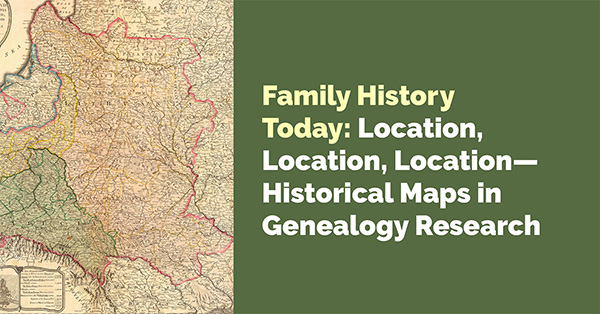
Answering the question "where do my ancestors come from?" is key to understanding their history and traditions. However, identifying and locating the places where they lived, particularly in Eastern Europe, is often a tricky task. In this lecture, Ed Mitukiewicz, map consultant for the documentary film Raise the Roof, will demonstrate how you can use historical map websites and geographic information databases to overcome these challenges.
This program is sponsored by the Ackman & Ziff Family Genealogy Institute. It is funded, in part, by a Humanities New York CARES Grant, with support from the National Endowment for the Humanities and the federal CARES Act, and by public funds from the New York City Department of Cultural Affairs in partnership with the City Council.
Ticket Info: Pay what you wish; register at /tickets/family-history-today-2021-03-17 to receive a link to the Zoom program
Presented by:

lecture
panel discussion
The Tenor of Irish-Jewish Relations in 19th-20th Century New York
Join us as Miriam Nyhan Grey, Associate Director of NYU's Ireland House, hosts a discussion with Dr. Hasia Diner and Dr. Jeffrey Gurock as they question the long-accepted visions of Hibernians and Hebrews at constant loggerheads, and look to complicate the historical narrative with examples of common ground and cooperation. Dr. Diner will speak to the histories of American Jews and Irish American’s entwined with each other starting in 19th century. How they met informally on streets and in apartment buildings, but also how they connected in the labor movement, through politics, and schools. In these encounters, Irish Americans, who had been in the United States longer and had established crucial power bases in the nation, served as mentors, models, and mediators for the Jews. Dr. Gurock will take us into the 20th century, describing the welcome Jews received at an Irish-Catholic University during the inter-war period, with a special emphasis on Jewish athletes becoming institutional standard bearers for St. John’s University. The relationship culminated in a tale of the unusual “get along” attitude obtained between the Irish and Jews in a post-war Bronx neighborhood.
Ticket Info: Free; register at forms.office.com for a Zoom link
Presented by:


panel discussion
panel discussion
Legal Sabotage: Ernst Fraenkel in Hitler's Germany
Join LBI for a discussion of Legal Sabotage: Ernst Fraenkel in Nazi Germany with author Douglas G. Morris and commentators David Abraham and Claudia Koonz.
About the Book
From Cambridge University Press: “The Jewish leftist lawyer Ernst Fraenkel was one of twentieth-century Germany's great intellectuals. During the Weimar Republic he was a shrewd constitutional theorist for the Social Democrats and in post-World War II Germany a respected political scientist who worked to secure West Germany's new democracy. This book homes in on the most dramatic years of Fraenkel's life, when he worked within Nazi Germany actively resisting the regime, both publicly and secretly. As a lawyer, he represented political defendants in court. As a dissident, he worked in the underground. As an intellectual, he wrote his most famous work, The Dual State – a classic account of Nazi law and politics. This first detailed account of Fraenkel's career in Nazi Germany opens up a new view on anti-Nazi resistance – its nature, possibilities, and limits. With grit, daring and imagination, Fraenkel fought for freedom against an increasingly repressive regime.”
About the Speakers:
Douglas G. Morris is the author of Legal Sabotage: Ernst Fraenkel in Hitler’s Germany (University of Cambridge Press, 2020). Morris is an attorney with the Federal Defenders of New York, and also holds a Ph.D. in Modern European History from the University of Rochester. His first book, Justice Imperiled: The Anti-Nazi Lawyer Max Hirschberg in Weimar Germany, was published by the University of Michigan Press in 2005.
David Abraham is a Professor of Law Emeritus at the University of Miami School of Law. Abraham has published widely on issues of politics and economics in Germany and is the author of The Collapse of the Weimar Republic, which examined the conditions and fate of a social-democratic, class-compromise effort to establish a viable welfare state. More recently he has written on immigration and citizenship law with a particular focus on citizenship in a neo-liberal era and problems of social solidarity and integration in Germany, Israel, and the US.
Claudia Koonz is the Peabody Family Distinguished Professor Emeritus of History in Trinity College of Arts and Sciences at Duke University. In The Nazi Conscience, Koonz examined public culture during the so-called “normal” years of the Third Reich (1933–1939), showed how the Nazis built a perverse ethical consensus, and identified the key role of popular racial science and expert opinion in convincing mainstream Germans that Jews, homosexuals, Roma (Gypsies) were so “alien” that they scarcely counted as human at all. In her current research, Koonz asks similar questions about contemporary Europeans' reactions to Muslim women who wear the hijab.
Ticket Info: Free; register at lbi.org/events/legal-sabotage/ for a Zoom link
Presented by:

panel discussion
book talk
New Works Wednesdays: The Mediterranean Diaspora in Late Antiquity: What Christianity Cost the Jews with Ross Shepard Kraemer
The Mediterranean Diaspora in Late Antiquity examines the fate of Jews living in the Mediterranean Jewish diaspora after the Roman emperor Constantine threw his patronage to the emerging orthodox (Nicene) Christian churches.
About the Author
Ross Shepard Kraemer is Professor Emerita of Religious Studies and Judaic Studies at Brown University, where she specialized in early Christianity and other religions of the Greco-Roman Mediterranean, including ancient Judaism. She holds an M.A. and a Ph.D. from Princeton University, and a B.A. from Smith College. Her many publications have focused particularly on gender and women's religions in the Greco-Roman Mediterranean, and on aspects of Jews and Judaism in the late antique Mediterranean diaspora.
Ticket Info: $5; register at us02web.zoom.us for a Zoom link
Presented by:

book talk
lecture
Leaving Behind the Froyen-vinkl, or How Women Functioned in the Male World of Yiddish Literature
For centuries, writing has been one of the few avenues available for women to make their voices heard in the public sphere. Joanna Lisek will present an overview of the strategies women used to break their way into the sphere of the printed Yiddish word: from annotations in the margins of books, to poems smuggled into the press in the guise of letters from readers, to the question of how relations with men were needed as leverage for getting published. Women writers and poets were not treated as equal partners in the male empire of Yiddish press and literature. Wedged into their froyen-vinkl, their “women’s corner,” women could expect condescension rather than actual recognition for their work. It is no coincidence that the seat of the Union of Jewish Writers and Journalists in Warsaw was described as a secular besmedresh, that is, a traditionally typical male institution. Finding a voice in the besmedresh of secular Yiddish literature was no easy task, and even more difficult was ensuring that this voice had a meaningful and important part in the discussion. Join us for this lecture to hear how they succeeded, oftentimes resorting to camouflage, at times openly manifesting their creative independence, all the while contending with unfavorable criticism.
About the Speaker:
Joanna Lisek is a literature scholar, translator, and faculty member at the Taube Department of Jewish Studies at the University of Wroclaw. Her main focus is on Jewish poetry and Yiddish culture, with a focus on women. She is the author of the monographs: Jung Wilne – ?ydowska grupa artystyczna [Yung Vilne, A Jewish Artistic Group, Wroclaw 2005] and Kol isze – g?os kobiet w poezji jidysz (od XVI w. do 1939 r.) [Kol ishe - The Voice of Women in Yiddish Poetry from the 16th Century to 1939, Sejny 2018], and the editor of the volumes: Nieme dusze? Kobiety w kulturze jidysz [Silent Souls? Women in Yiddish Culture, Wroclaw 2010] and Mykwa. Rytual i historia [Mikveh - Ritual and History, Wroclaw 2014]. She co-edited, with Karolina Szymaniak and Bella Szwarcman-Czarnota, Moja dzika koza. Antologia poetek jidysz [My Wild Goat. Anthology of Women Yiddish Poets, Kraków 2018]. In addition to the work of poets from Yiddish, she has translated into Polish works by, among others, Puah Rakovsky, Yente Serdatzky, and Chava Rosenfarb. Lisek is the editor of Zydzi. Polska. Autobiografia [Jews. Poland. Autobiography] series, which by 2023 will publish over 20 volumes of Jewish autobiographical literature, translated into Polish from Yiddish, Hebrew, German, Russian, as well as memoirs written originally in Polish.
Ticket Info: Free; register at yivo.org/Froyen-vinkl for a Zoom link
Presented by:

lecture
book talk
New Works Wednesdays: The Jews of Iran and Rabbinic Literature: New Perspectives with Daniel Tsadik
Dr. Tsadik’s book addresses the question of Iranian Jewry’s familiarity with rabbinic literature from the 16th century to the beginning of the 20th century. Many of the book’s theses challenge and revise prevailing views that see this Jewry as largely isolated from world Jewry and its rabbinic legacy.
About the Author
A Fulbright scholar, Dr. Daniel Tsadik obtained his PhD in 2002 from the Yale University History Department. He authored several articles, a book entitled "Between Foreigners and Shi‘is: Nineteenth-Century Iran and its Jewish Minority" (Stanford University Press, 2007), another book entitled "The Jews of Iran and Rabbinic Literature: New Perspectives" (2019) which won the (Israel) Prime Minister Prize, and co-edited the book "Iran, Israel and the Jews: Symbiosis and Conflict from the Archaemenids to the Islamic Republic" (2019). From 2008 to 2020, Professor Tsadik taught at Yeshiva University, where he served as Associate Professor of Sephardic and Iranian Studies. His current research is on Shi‘ite-Jewish polemics.
For more about the book: mosadharavkook.com
Ticket Info: $5; register at us02web.zoom.us for a Zoom link
Presented by:

book talk
book talk
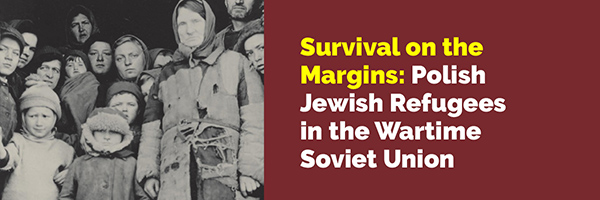
Join author Eliyana R. Adler (Penn State University) in conversation with Debórah Dwork (The Graduate Center, CUNY) about her book, the forgotten story of 200,000 Polish Jews who escaped the Holocaust as refugees stranded in remote corners of the USSR.
Between 1940 and 1946, about 200,000 Jewish refugees from Poland lived and toiled in the harsh Soviet interior. They endured hard labor, bitter cold, and extreme deprivation. But out of reach of the Nazis, they escaped the fate of millions of their coreligionists in the Holocaust.
Survival on the Margins is the first comprehensive account in English of their experiences. The refugees fled Poland after the German invasion in 1939 and settled in the Soviet territories newly annexed under the Molotov-Ribbentrop Pact. Facing hardship, and trusting little in Stalin, most spurned the offer of Soviet citizenship and were deported to labor camps in unoccupied areas of the east. They were on their own, in a forbidding wilderness thousands of miles from home. But they inadvertently escaped Hitler’s 1941 advance into the Soviet Union. While war raged and Europe’s Jews faced genocide, the refugees were permitted to leave their settlements after the Soviet government agreed to an amnesty. Most spent the remainder of the war coping with hunger and disease in Soviet Central Asia. When they were finally allowed to return to Poland in 1946, they encountered the devastation of the Holocaust, and many stopped talking about their own ordeals, their stories eventually subsumed within the central Holocaust narrative.
Drawing on untapped memoirs and testimonies of the survivors, Eliyana Adler rescues these important stories of determination and suffering on behalf of new generations.
Ticket Info: Pay what you wish; register at /tickets/survival-on-margins-2021-03-03 to receive a Zoom link
Presented by:

book talk
panel discussion
Beba Epstein: The Extraordinary Life of an Ordinary Girl
The YIVO Bruce and Francesca Cernia Slovin Online Museum's inaugural exhibition, Beba Epstein: The Extraordinary Life of an Ordinary Girl, uses the true story of Beba Epstein, a girl born in Vilna in 1922 who survived the Holocaust, to explore East European Jewish life in the 20th century. The museum's innovative, interactive storytelling contextualizes over two hundred artifacts from the YIVO Archives.
Join us for a discussion celebrating this exhibition featuring Beba Epstein's son, Michael Leventhal, scholar Antony Polonsky, museum chief curator Karolina Ziulkoski, and YIVO's Executive Director and CEO Jonathan Brent. The discussion will be moderated by Gal Beckerman (The New York Times Book Review).
Ticket Info: Free; register at yivo.org/Beba-2021 for a Zoom link
Presented by:

panel discussion
lecture
The Persian Experience: The Jews of the Great Silk Road
Follow in the footsteps of the Bukharian Jewish merchants on the Silk Road and discover the ancient network of trade routes that were for centuries crucial to Eurasian cultural interaction. Explore with us the history of these roads connecting East and West, stretching from the Korean peninsula and Japan to the Mediterranean Sea. Understand the impact and the contribution that Central Asia's Jewish communities of today's Uzbekistan, Tajikistan, Kazakhstan, Turkmenistan, and Afghanistan made towards the development of this ancient path. We will learn about the Jewish presence in this area for over 2000 years, will look into their houses and read into the letters that the Jews of Central Asia exchanged for centuries with their fellow European Jewish communities.
About the Speaker:
Manashe Khaimov is an Adjunct Professor in Jewish Studies, with a specialty in History and Culture of the Bukharian Jews at Queens College. Manashe was born in a city along the Silk Road, in Samarkand, Uzbekistan, where his ancestors lived for over 2000 years, which makes Manashe’s Jewish identity simultaneously Bukharian, Sephardic, Mizrahi, and Russian speaking. He is a fourth-generation community organizer, informal Jewish educator, and a lifelong learner who brings his passion working with Jewish community. He is founding director and social innovator of the Bukharian Jewish Union, the founder of AskBobo.org, the only Bukharian online dictionary and the founder of The Jewish Silk Road Tours ™ walking tours in NYC. Manashe researched and produced several documentaries about Bukharian Jewish community as part of the Bukharian Lens project: The Untold Story of Bukharian Jews; The Untold Story of Bukharian Jews and Ashkenazi Jews Who Were Evacuated During WWII to Central Asia; Bukharian Roots. Manashe launched MEROS: Center for Bukharian Jewish Research & Identity at Queens College Hillel.
Ticket Info: $10; register at us02web.zoom.us for a Zoom link
Presented by:

lecture
cooking show
Sephardic Culinary History with Chef Hélène Jawhara-Piñer
Episode Seven: Turrón and Conversos
Sephardi Culinary History is a new show that combines chef and scholar Hélène Jawhara-Piñer’s fascination with food studies and flair for creating delicious cuisine. Join along as she cooks Sephardic history! ASF Broome & Allen Fellow Piñerearned her Ph.D in History, Medieval History, and the History of Food from the University of Tours, France.
Ticket Info: $2.99; register at us02web.zoom.us for a Zoom link
Presented by:

cooking show
lecture
The Persian Experience: Uprooted from Iran with Sharona Mizrahi
In this part of "The Persian Experience" series, Sharona Mizrahi shares her personal story.
Sharona was born in Kerman, Iran. Her great-grandparents came from Hamadan and Yazd. Sharona's great-grandparents escaped the famine of 1917-1920 in Hamadan, the city mentioned in the Book of Esther as Hegmatana or Ekbatana, the capitol of the Persian Empire during Acheshverosh's regime.
Sharona's oldest brother, Kurosh, has traced her family's lineage back six generations. Sharona attended public school in Iran until her first year of high school. Then in 1984, she, along with two sisters and one brother Z"L, escaped from Iran. One night in August, two weeks prior to Rosh Hashanah, smugglers arrived in the middle of the night and the Mizrahi family dropped everything and left their house to escape.
In this talk, Sharona will give a brief history of her family and their one-year journey to the United States.
Ticket Info: $5; register at us02web.zoom.us for a Zoom link
Presented by:

lecture
book club
LBI Book Club, Vol. VIII - Fanny von Arnstein: Daughter of the Enlightenment
In February, we will be reading Fanny von Arnstein: Daughter of the Enlightenment by Hilde Spiel. We are pleased to have as our special guest in the discussion Professor Deborah Hertz.
About the Book
Fanny von Arnstein was an important figure in the history of the Enlightenment. Born into a wealthy Jewish family in Berlin, she married and moved to Vienna, where she founded a salon attracted politicians, artists, writers, and other prominent figures. Included in this list are Madame de Staël, Arthur Schopenhauer, and Amadeus Mozart. Hilde Spiel's biography provides "a vivid portrait of a brave and passionate woman, illuminating a central era in European cultural and social history." (Quotes from Amazon review). At the same time, a biography is also a product of its own place and time. Published in 1962 in German, it was less than 20 years since the Holocaust, and thus speaks to Jewish world that had been decimated, but also reborn.
Author
Hilde Spiel (1911-1990) was born into a Jewish family in Vienna. With the rise of Nazism in the country, she chose to immigrate to London in 1936, before the Anschluss. Both an author and a journalist, Hilde and her family visited Austria regularly after the war, and Hilde returned permanently in 1963, the year after Fanny von Arnstein: Daughter of the Enlightenment was published. Spiel herself stated this was her favorite work of all she had written. She died in 1990 in Vienna.
Guest
Deborah Hertz is the Herman Wouk Chair in Modern Jewish Studies and a professor in the Department of History at the University of California in San Diego. You can learn more about her work here. We look forward to having her join us.
Ticket Info: Free; register at eventbrite.com/e/lbi-book-club-vol-viii-fanny-von-arnstein-daughter-of-the-enlightenment-tickets-138614191779 for a Zoom link
Presented by:

book club
lecture
Color on My Mind: The History of the First Black Mental Health Clinic in America
The Lafargue Clinic was founded in 1946 by a group of black intellectuals and German-Jewish doctors. These activists joined together to answer a pressing need in New York - the need for psychiatric care for Black people. Blacks were historically denied access to clinics and hospitals that provided for the mental needs of the city. Further, black intellectuals argued that their communities suffered two-fold: having the psychological needs all people had, but also further needs fueled by the racism they experienced around them.
Led by American cultural figures like writers Richard Wright, Ralph Ellison, and photographer Gordon Parks, as well as the German-Jewish doctors Frederic Wertham and Hilde Mosse (who had fled Berlin after Hitler took power in 1933), the Lafargue Clinic was in the basement of a church. Using partitions, small rooms were formed for visitors seeking psychiatric care. The care was free, even though it had to be privately supported, as no New York City government agencies agreed to fund it. The Lafargue Clinic became the first clinic for psychiatric care for Black people in America. Its legacy continues today as The Northside Center for Child Development.
Register to join this presentation by Gabriel Mendes, author of Under the Strain of Color: Harlem's Lafargue Clinic and the Promise of an Antiracist Psychiatry, (Cornell University Press, 2015). He will discuss the history of the Lafargue clinic, its importance in the history of public health, and its important role in the battles against school segregation.
About the Speaker:
Gabriel N. Mendes is Director of Public Health Programs at the Bard Prison Initiative. He has held academic positions at Emmanuel College, UC San Diego, and, most recently, Vanderbilt University, where he was Senior Lecturer at the Center for Medicine, Health, and Society. He was also Associate Director of the Higher Education Opportunity Program at Bard College and Director of the Men2B Program at the Rhode Island Department of Corrections. Mendes is the author of Under the Strain of Color: Harlem’s Lafargue Clinic and the Promise of an Antiracist Psychiatry (Cornell University Press, 2015), and he is currently writing his second book Through a Glass Darkly: Race and Madness in Modern America. Mendes holds a Ph.D. in American Civilization from Brown University, an M.T.S. from Harvard Divinity School, and a B.A. from Hobart College.
Ticket Info: Free; register at lbi.org/events/color-on-my-mind/ for a Zoom link
Presented by:

lecture
book club
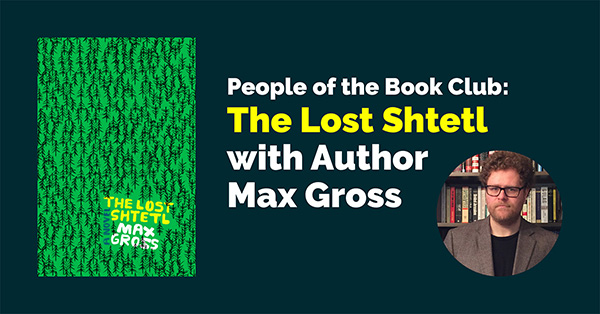
Go behind the stories and peer inside the archives at the CJH book discussion, led by Lauren Gilbert, Senior Manager for Public Services at the Center for Jewish History. This session will feature a discussion of The Lost Shtetl by Max Gross, winner of the 2020 National Jewish Book Award in the "Book Club" category. A work of speculative fiction and magical realism, The Lost Shtetl tells the tale of a previously undiscovered remote Polish shtetl that is suddenly and unceremoniously dragged into the present. We will be joined by the author for a Q&A after the discussion.
Participants will need to obtain their own copy to read before the discussion.
NOTE: This is a book discussion, not a lecture, so space is limited.
Ticket Info: Pay what you wish; register at programs.cjh.org/tickets/people-book-club-2021-02-24 for a Zoom link
Presented by:

book club
workshop
The Persian Experience: East and West - Can the Two Walk Together?
Join us for an experiential workshop with poet Esther Shkalim where she will share about her life as a Persian Jew in Israel, accompanied by readings from her well-received works "Sharkiya" and "What a Woman Must Know," published by Kinneret-Zemura-Bitan.
Part of "The Persian Experience," East and West: Can the Two Walk Together? (Amos 3:3) is a discussion with poet Esther Shkalim on a Mizrahi woman in a Western, secular society. Shkalim will discuss the following questions:
How does a woman from a Mizrahi traditional patriarchal society contend with Western, modern, secular Israeli society?
What is her relationship to the status of women in Mizrahi society, Orthodox society, and Israeli society?
How does she approach the ethnic mosaic of Israeli society?
About the Speaker:
Esther Shkalim is a poet of Persian heritage who researches Jewish diasporas of the East and West, with a focus on culture and community. Her two books, "Sharkiya" and "What a Woman Must Know" were published by Kinneret-Zemura-Bitan. In addition, she has published many poems in different books and journals, educational texts, and literary journals. Her poems are studied in universities, colleges and schools across Israel.
Ticket Info: $5; register at us02web.zoom.us for a Zoom link
Presented by:

workshop
lecture
The Picture and Price of Jewish Assimilation in Documentary & Feature Silent Film
The early twentieth century was a period of assimilation and acculturation for large segments of the Jewish population living in the United States and Central and Eastern Europe. It was also a time of development and flowering for cinema – a new, democratic art form. Focusing on documentaries as well as feature silent films, 2019 Jan Karski & Pola Nirenska Award recipient Professor Daniel Grinberg will analyze the changing character and perception of Jews in both the United States and Poland.
This analysis will be compared with sociological theories and observations, as well as with literary presentations of the subject (I. Zangwill, A Yezierska, A Gordin). This talk will also consider the price of assimilation for Jewish communities of this period, the persistent “myth of America,” omnipresent in Yiddish culture before WW2, and antisemitic stereotypes and cliches popular in films of the 1920s and 1930s.
Ticket Info: Free; register at yivo.org/Jewish-Assimilation for a Zoom link
Presented by:

lecture
workshop
The Persian Experience: Persian Music Workshop
Explore Persian music with singer, creator, composer, and researcher Maureen Nehedar.
About the Speaker:
Maureen Nehedar is an Israeli singer, creator, composer, and researcher. She has created a revival of Persian-Jewish tradition poetry (Piyutim). In August 2018 she released her new Piyyutim CD 'Why do you stand afar', in 2016 she released the CD Gole Gandom and in 2014 she released the album Asleep in the Bosom of Childhood. In 2019 she won the Neve Shechter Prize and The Rabinovich Foundation for the Arts for Original Israeli Work.
Ticket Info: $5; register at us02web.zoom.us for a Zoom link
Presented by:

workshop
conversation
At Lunch with Ann Temkin
A new virtual interview series hosted by Julie Salamon
Author and journalist Julie Salamon (Wall Street Journal and NY Times) sits down with influential cultural leaders in the Jewish American Community; we'll hear their thoughts about working in this present moment, current projects, and what they have to say about their Jewish identity. Grab your lunch and tune in for our first conversation with Ann Temkin, Chief Curator at MoMA in New York City.
About the Speakers:
Julie Salamon is an American author, critic and storyteller. She worked at The Wall Street Journal for 16 years first as a commodities and banking reporter before spending 11 years as the paper's film critic. Later she became a staff journalist at The New York Times where she was a TV critic and arts reporter. Later she gained fellowships at the MacDowell Colony and became a Kaiser Media Fellow. She has written both fiction and non-fiction books for adults and children-- and produced articles for magazines that include The New Yorker, Vanity Fair, Vogue, Bazaar, and The New Republic. Her books have received wide critical and popular attention, she has just completed "Unlikely Friends," a memoir for Audible Original, scheduled for release in 2021.
Ann Temkin is an American art curator, and currently the Marie-Josee and Henry Kravis Chief Curator of Painting and Sculpture at the Museum of Modern Art in New York. Previously she was the Muriel and Philip Berman Curator of Modern and Contemporary Art at the Philadelphia Museum of Art. Ms. Temkin is an ex-officio Trustee at the Institute of Fine Arts, New York University and a member of the Claifornia Institute of the Arts Board of Overseers. She was born in Connecticut and received her BA magna cum laude from Harvard University and her PhD in the history of art from Yale University.
Ticket Info: $5; register at ajhs.org/programs for a link to the Zoom program
Presented by:

conversation
lecture
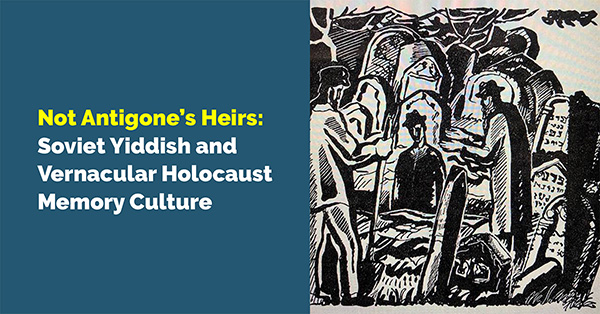
AJS Dissertation Completion Fellow 2020/21 Miriam Schulz looks at a little-known chapter of Soviet Jewry: Soviet Yiddish cultural groups and influential individuals and the ways in which they created their own vernacular Holocaust memory culture in the Soviet Union, not against but within state politics. They made their memory practices part of the post-Stalinist memory culture that had ostensibly little room for Holocaust memorialization. With the help of several examples, looking primarily at the interplay of Holocaust monuments and texts, she will showcase aspects of this Soviet Yiddish memory culture and the labor that went into it despite the less-than-conducive environment.
Ticket Info: Pay what you wish; registration required at /tickets/not-antigone-2021-02-18 to receive a link to the Zoom webinar
Presented by:

lecture
book talk
The Persian Experience: Book Discussion with Roya Hakakian
This discussion with Roya Hakakian opens our lecture series on Persian Jewry.
In "Journey from the Land of No" Roya Hakakian recalls her childhood and adolescence in prerevolutionary Iran with candor and verve. The result is a beautifully written coming-of-age story about one deeply intelligent and perceptive girl’s attempt to find an authentic voice of her own at a time of cultural closing and repression. Remarkably, she manages to re-create a time and place dominated by religious fanaticism, violence, and fear with an open heart and often with great humor.
Roya Hakakian is the author of "Assassins of the Turquoise Palace" and "Journey from the Land of No," and has published two collections of poetry in Persian. Her essays have appeared in The New York Times and The Wall Street Journal, and on NPR’s All Things Considered. She has collaborated on programming for leading journalism units in network television, including 60 Minutes. She is the recipient of a Guggenheim Fellowship, and served on the editorial board of World Affairs. Since 2015, she has taught at THREAD, a writing workshop at Yale, and is a fellow at the Davenport College at Yale. She lives in Connecticut.
For more about the book: https://www.penguinrandomhouse.com/books/73604/journey-from-the-land-of-no-by-roya-hakakian/
Ticket Info: $5; register at us02web.zoom.us for a Zoom link
Presented by:

book talk
book talk
Yiddish: Biography of a Language – Live on Zoom
Jeffrey Shandler's new book, Yiddish: Biography of a Language, presents the story of Yiddish, the defining vernacular of Ashkenazi Jews, from its origins to the present. Shandler relates the multifaceted history of Yiddish in the form of a biographical profile. Through a series of thematic chapters—from “Name” and “Date and Place of Birth” to “Religion” and “Life Expectancy”—he offers surprising insights into the dynamic interrelation of the language, its speakers, and their culture and explores the varied symbolic investments that Yiddish speakers and others have made in the language. Join us for a conversation celebrating this new book with Jeffrey Shandler, Anita Norich, and Ayala Fader, moderated by YIVO's Academic Advisor and Director of Exhibitions Eddy Portnoy.
Ticket Info: Free; register at https://www.yivo.org/Biography-of-a-Language to receive a Zoom link
Presented by:

book talk
book talk
Dr. Albert Menashe & The Holocaust in Salonika
Join Dr. Joe Halio for a special book talk on the newly republished memoirs of Dr. Albert Menashe, one of the few survivors from the Jewish Community of Salonika. BIRKENAU (AUSCHWITZ II): How 72,000 Greek Jews Perished was a ground-breaking work of Holocaust survivor testimony and was one of the first testimonies written by a survivor after World War II.
Ticket Info: Free; register at us02web.zoom.us for a Zoom link
Presented by:

book talk
panel discussion
Jewish Life in Late Antiquity: From Colonia Agrippina to Augusta Raurica
Thanks to the order of a Roman Emperor from 321 CE that allowed the municipal council of the Roman colony at the site of modern-day Cologne to compel Jews to service, we know that Jews were part of late Roman society in the northern European provinces at least 17 centuries ago. A tiny ring of similar age bearing a menorah was unearthed in the Roman town of Augusta Raurica in modern-day Switzerland bears further testament to the presence of Jews in the late Roman Empire in Europe.
But what was life like in these outposts of the Empire? How did Jews relate to their pagan and Christian neighbors, and how do we know? As Leo Baeck Institute explores this history in the Shared History Project, we are pleased to convene three experts on late antiquity for a discussion of the archeological and historical evidence surrounding Jewish life in ancient Rome, the social and political structure of late Roman Society, and the role the Jews played in particular.
About the Panelists
Dr. Thomas Otten is the founding director of MiQua – LVR-Jewish Museum in the Archeological Quarter of Cologne. After studying pre- and early history, classical archaeology and ancient history, he managed the Rhenish Association for Monument and Landscape Conservation before heading the department of conservation and preservation at the public monument agency in the Ministry of Construction of North Rhine-Westphalia from 2006 to 2016. Between 2010 and 2015 he curated archaeology exhibitions on behalf of the federal state. He lectures at the Institute of Archaeology of Cologne University.
Prof. Werner Eck was Professor of Ancient History in the University of Cologne from 1979 to 2007. He earned a PhD in Ancient History from the University of Erlangen-Nürnberg. He is a leading expert on the history of the Roman Empire, and he was awarded the Max Planck Prize for International Research for “for pioneering insights in the history of the Roman Empire.” He was a member of the Institute for Avanced Study in Princeton from 1983–84, and at the Sackler-Institute for Advanced Study at the University of Tel Aviv from 1999–2000. He is Dr. h. c. of the Hebrew University in Jerusalem and one of the co-editors of the Corpus Inscriptionum Iudaeae/Palaestinae, a multi-lingual corpus of the inscriptions from Alexander to Muhammad in Israel.
Prof. René Bloch is Professor of Jewish Studies at the University of Bern (Switzerland), where he holds a joint appointment in the Institute of Jewish Studies and the Institute of Classics. He obtained his Ph.D. (Dr. phil.) as well as his “habilitation” from the University of Basel. Bloch’s recent publications include: “Der jüdische Ring von Kaiseraugst” (in Jüdischer Kulturraum Aargau, J. Picard, A. Bhend, ed., 2020). “Jew or Judean: The Latin Evidence” (in Torah, Temple, Land, M. Witte et al., ed., 2021). “Moses: Motherless with Two Mothers” (in Missing Mothers: Maternal Absence in Antiquity, S. Hübner, D. M. Ratzan, ed., 2021).
Ticket Info: Free; register at eventbrite.com/e/jewish-life-in-late-antiquity-from-colonia-agrippina-to-augusta-raurica-tickets-138806192057 for a Zoom link
Presented by:

panel discussion
panel discussion
Sexing American Jewish History
Moderator: Kathy Peiss, University of Pennsylvania
Discussants: Gillian Frank, University of Virginia; Rachel Kranson, University of Pittsburgh; Jonathan Krasner, Brandeis University
The latest issue of American Jewish History asks: What differences have Jews and Judaism made in the history of American sexuality? How has sexuality shaped the history of American Jews and Judaism?
Set the mood for your Valentine’s Day weekend by joining us for a virtual conversation that will celebrate the publication of this special issue, and consider all that we stand to learn by sexing American Jewish history.
Ticket Info: Free; register at pitt.zoom.us for a Zoom link
Presented by:

panel discussion
lecture
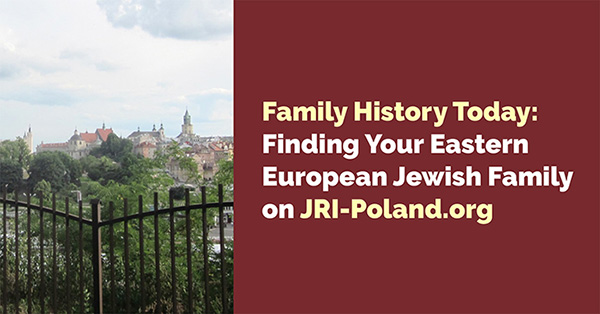
For 25 years, JRI-Poland.org has served as the preferred database for the historical Jewish records that survive in the archives of Poland. This vast collection of 6.2 million documents includes information about towns and families from Poland, Ukraine, Belarus, Lithuania, Germany, and the former territories of Galicia and Prussia. In this lecture, Robinn Magid, Assistant Director of JRI-Poland.org, will recount some truly memorable stories of genealogical breakthroughs achieved by researchers, and will demonstrate how you can take advantage of this vast resource.
This program is sponsored by the Ackman & Ziff Family Genealogy Institute. It is funded, in part, by a Humanities New York CARES Grant, with support from the National Endowment for the Humanities and the federal CARES Act, and by public funds from the New York City Department of Cultural Affairs in partnership with the City Council.
Ticket Info: Pay what you wish; register at /tickets/family-history-today-2021-02-11 to receive a link to the Zoom program
Presented by:

lecture
book talk
New Works Wednesdays: Ideas: Shemot with Sina Kahen
Following our New Works Wednesdays fall series with Sina Kahen discussing his first book in the "Ideas" series, we welcome him back for a discussion on the second, newly-released book "Ideas: Shemot."
Sina will be speaking about "Monotheism & Science: How the Exodus impacted our understanding of reality."
The Torah is Judaism's crown. The ideas gleaned from it have improved and advanced human civilisation. Sina Kahen weaves together ideas from ancient to modern times, in an effort to provide an intellectually honest and spiritually fulfilling representation of the Torah's weekly portions. Drawing from science, philosophy, psychology, and history, this series offers the reader a vision of Torah based on intellect and integration, rather than superstition and isolation.
Sina Kahen is author of 'Ideas: Shemot', the latest volume in his popular series on the weekly Torah portion, based on the Classical Sephardi approach to Torah. His full time work is in surgical robotics and AI, and he represents The Sephardi Habura in the UK.
For more about his book: https://www.amazon.com/dp/B08RRBPX1Y
Ticket Info: $5; register at us02web.zoom.us for a Zoom link
Presented by:

book talk
workshop
Writing Between Tongues: An Exploration of Hebrew and Arabic Calligraphy - Part 2
Following the success of December’s talk “Writing Between Tongues: An Exploration of Hebrew and Arabic Calligraphy”, we are excited to bring back educator and artist Ruben Shimonov for a follow-up interactive artist talk, virtual gallery tour, and workshop. In this 90-minute session, we will take a deeper dive into the rich visual worlds of Arabic and Hebrew calligraphy. Educator, community organizer, and artist Ruben Shimonov will take us on an exploratory journey of his multilingual calligraphy and the ways he has used his art to enrich Muslim-Jewish interfaith communities. We will have a talk-back with the artist, as well as a live calligraphy demonstration during which you can try your hand at the calligraphy!
Ticket Info: $15; register at us02web.zoom.us to receive a Zoom link
Presented by:

workshop
book talk
New Works Wednesdays: Views of Jewish Morocco: Forms, Places, Narratives with Nadia Sabri
In this interactive session Nadia Sabri will have a discussion with book contributors Abdou Filaly Ansary, Vanessa Paloma Elbaz and Brahim El Guabli.
The book is a multidisciplinary collective work that focuses on the memory of Moroccan Judaism through autobiographical accounts, testimonies, artistic experiences and critical writings that shed light on them. These contributions weave an unprecedented set of texts and works of art, combining temporalities around memories of a world lost forever, of a Morocco that the young ignore, and that this book proposes to revisit in a pluralistic manner. The collection encompasses a contemporary reflection on the scope of maintaining the memory of Moroccan Judaism.
About the Speaker:
Academic and independent curator, Dr. Nadia Sabri is president of the Moroccan section of AICA (International Association of Art Critics). Nadia Sabri has built projects around Art and societal issues over the course of the last fifteen years. She conceives artistic projects as a driving force combining research, demonstrative processes, and experiences. Nadia Sabri has written and directed several research projects and publications on contemporary art and its relationship to sociopolitical issues such as cities, exile or even artist commitment. In 2015, she founded Exiles, paradigm fertile, a multidisciplinary platform for reflection and creation around the issue of exile as a creative and evolutionary paradigm. She lives in Rabat (Morocco) where she is associated professor at Mohammed V University and also works as a curator and researcher in several countries. For more about the book: https://lefennec.com/livre/exils-vues-du-maroc-juif-formes-lieux-recits/
Ticket Info: $5; register at us02web.zoom.us for a Zoom link
Presented by:

book talk
discussion
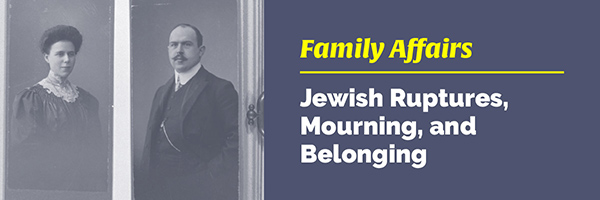
In the third program of the series, Sharon Musher, author of Promised Lands: Hadassah Kaplan, Zionism, and the Making of American Jewish Women and David Slucki, author of Sing This at My Funeral: A Memoir of Fathers and Sons, will discuss with Natalia Aleksiun their grandparents’ and parents’ turbulent life trajectories before, during, and after the war in New York, Europe, British Palestine, and Australia. Rather than an examination of modern Jewish politics, this conversation will reflect on family ties, hopes and disappointments, loss and belonging in an intimate perspective through studying personal documents of loved ones.
Ticket Info: Pay what you wish; registration required at /tickets/family-affairs-2021-02-03 to receive a link to the Zoom webinar
Presented by:

discussion
cooking show
Sephardic Culinary History with Chef Hélène Jawhara-Piñer
Episode Six: Meatballs ‘cursed by the Jews’ & Muhallabiyye
A special show focusing on Sepharadim in the Middle East.
Sephardi Culinary History is a new show that combines chef and scholar Hélène Jawhara-Piñer’s fascination with food studies and flair for creating delicious cuisine. Join along as she cooks Sephardic history! ASF Broome & Allen Fellow Piñer earned her Ph.D in History, Medieval History, and the History of Food from the University of Tours, France.
Ticket Info: Free; register at us02web.zoom.us for a Zoom link
Presented by:

cooking show
exhibit opening
Behind the Scenes of an Exhibition: Emile Bocian in Chinatown
In partnership with the Museum of Chinese in America (MOCA), the Center has launched a new online exhibition, An Unlikely Photojournalist: Emile Bocian in Chinatown, a never-before-seen collection of images of Manhattan’s Chinatown in the 1970s and 80s. Co-curators Kevin Chu, Assistant Director of Collections at MOCA, and Lauren Gilbert, Senior Manager of Public Services at the Center for Jewish History, will share a behind-the-scenes look into Bocian's life, his collection, and the genesis of the exhibition. Bocian’s grandniece and nephew will also be in attendance to share their memories.
Emile Bocian (1912-1990) was the child of Jewish immigrants who spent the last two decades of his life living and working in Chinatown as a photojournalist for The China Post, a Chinese-language daily. He photographed protests, celebrations, and scenes of daily life, as well as storefronts and streetscapes that provide a glimpse into a vanishing New York.
Ticket Info: Pay what you wish; register at /tickets/emile-bocian-2021-01-28 to receive a Zoom link
Presented by:

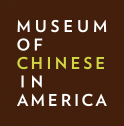
exhibit opening
book talk
The American Jewish Philanthropic Complex: A Conversation between Lila Corwin Berman and Dahlia Lithwick
Join Lila Corwin Berman, author of The American Jewish Philanthropic Complex: The History of a Multibillion-Dollar Institution, and Dahlia Lithwick, senior editor at Slate, for a discussion about the history of American Jewish philanthropy and what that history might tell us about money, politics, and the public good in American and American Jewish life today.
Berman is professor of history at Temple University, where she directs the Feinstein Center for American Jewish History. Lithwick writes about law and politics and is a contributing editor at Newsweek and senior editor at Slate.
Ticket Info: Free; register at for a Zoom link
Presented by:

book talk
book talk
New Works Wednesdays – “White Zion” with Gila Green
In our extended New Works Wednesdays series, we explore new fictions works. In this part of the series, Gila Green discusses her new work White Zion.
The novel takes readers into the worlds of 19th century Yemen, pre-State Israel, modern Israel and modern Canada. You will hear the voices of a young boy marveling at Israel's first air force on his own roof, the cry of a newly married woman helpless to defend herself against her new husband's desires, the anger of the heroine's uncle as he reveals startling secrets about his marriage and the fall-out after generations of war.
Gila Green's novels feature characters of Sephardi, Yemenite, and mixed Middle Eastern heritage because she couldn't find any Jewish stories that reflected her experience growing up and decided to write them herself. Her novel-in-stories White Zion explores one Yemenite family's journey from Sanaa to Jerusalem to Canada. In Passport Control, heroine Miriam Gil struggles to understand her Yemenite father's past against a trove of family secrets. Gila is an author, a creative writing teacher, an EFL college lecturer, an editor, and a mother of five. When she's not exploring the Middle East in her novels, she migrates to South Africa in her continuing environmental young adult series that takes place in Kruger National Park. In addition to her four published novels, her short works have been featured in dozens of publications including: Sephardic Horizons, Jewish Fiction, Jewish Literary Journal, Fiction Magazine, Akashic Books, The Fiddlehead, and others.
For more about the book and the author: https://www.gilagreenwrites.com/
Ticket Info: $5; register at us02web.zoom.us for a Zoom link
Presented by:

book talk
book club
LBI Book Club, Vol. VII: The War of the Jews
This month, we will be reading and discussing The War of the Jews: A Historical Novel of Josephus, Imperial Rome, and the Fall of Judea and the Second Temple (also known as Josephus: A Historical Romance) by Lion Feuchtwanger, published in 1932. We are pleased to be joined for the discussion by Professor Johnathan Skolnik.
About the Book
Joseph ben Matthias, Judaen aristocrat and Jerusalem Temple priest of the first rank, steps out into the boundless, magnificent city of Rome. He's clever, handsome, fêted by his Jewish hosts, and on a righteous mission to free three venerable old Jews wrongfully imprisoned as rebels. Joseph secures an audience with Nero's beautiful young Empress, Poppæa. Charmed by Joseph's zeal, she asks the Minister of Oriental Affairs to release the prisoners. The Minister seizes the opportunity to trade his assent for an edict guaranteed to outrage and mobilize the Jews of Judaen; Rome needs an excuse to comprehensively crush ongoing Jewish resistance. His scheme bears fruit. In the year 66 Judaen revolts. Led by canny old commander Vespasian, Roman forces prevail until only the fortified city of Jerusalem remains in the hands of Jewish rebels. Vespasian is acclaimed Emperor and returns to Rome, leaving the siege to his son Titus. Weeks drag by. Jerusalem, with its lofty, magnificent Temple, becomes to the besieging Romans a symbol of obdurate Jewish arrogance to be overthrown. Rebel commander, Roman captive and Flavian protégé, Josephus, long reviled as a traitor and Roman toady, is portrayed by Feuchtwanger with clear-eyed empathy as a complex, brilliant man whose desire to become a "citizen of the world" conflicts with his Jewish identity. It was Joseph’s destiny, however, to become a fierce defender in Rome of the unique importance of Jewish contribution to humanity, and to become known as the first-century historian Flavius Josephus and the author of The Jewish War (Description adapted from a review by Annis, HistoricalNovels.info).
About the Author
Lion Feuchtwanger (1884–1958) was a German-Jewish novelist and playwright. A prominent figure in the literary world of Weimar Germany, he influenced numerous contemporaries as a leading cultural figure, including Bertolt Brecht. Feuchtwanger's Judaism and fierce criticism of the Nazi movement, years before it assumed power, ensured that he would be a target of government-sponsored persecution after Adolf Hitler's appointment as chancellor of Germany in January 1933. Following a brief period of internment in France and a harrowing escape from Europe, he found asylum in the United States, where he died in California. Until his death, he was an important figure in German literature and the middle of a circle of cultural figures who had fled Europe in the Nazi period.
About our Guest
Jonathan Skolnik is Associate Professor of German at the University of Massachusetts Amherst, where he is also on the faculty in Judaic and Near Eastern Studies and in History. His books include Jewish Pasts, German Fictions: History, Memory, and Minority Culture in Germany, 1824-1955. You can learn more about him here.
Ticket Info: Free; register at eventbrite.com/e/lbi-book-club-vol-vii-the-war-of-the-jews-by-lion-feuchtwanger-tickets-134219256409 for a Zoom link
Presented by:

book club
book talk
New Works Wednesdays – “Concealed” with Esther Amini
In our extended New Works Wednesdays series, we explore new fiction and nonfiction works. In this part of the series, Esther Amini discusses her new work Concealed.
Esther Amini grew up in Queens, New York, during the freewheeling 1960s. She also grew up in a Persian-Jewish household, the American-born daughter of parents who had fled Mashhad, Iran. In Concealed, she tells the story of being caught between these two worlds: the dutiful daughter of tradition-bound parents who hungers for more self-determination than tradition allows.
Exploring the roots of her father's deep silences and explosive temper, her mother's flamboyance and flights from home, and her own sense of indebtedness to her Iranian-born brothers, Amini uncovers the story of her parents' early years in Mashhad, Iran's holiest Muslim city; the little-known history of Mashhad's underground Jews; the incident that steeled her mother's resolve to leave; and her parents' arduous journey to the U.S., where they faced a new threat to their traditions: the threat of freedom. Determined to protect his daughter from corruption, Amini's father prohibits talk, books, education, and pushes an early Persian marriage instead. Can she resist? Should she? Focused intently on what she stands to gain, Amini comes to see what she also stands to lose: a family and community bound by food, celebrations, sibling escapades, and unexpected acts of devotion by parents to whom she feels invisible.
Esther Amini is a writer, painter, and psychoanalytic psychotherapist in private practice. Her short stories have appeared in Elle, Lilith, Tablet, The Jewish Week, Barnard Magazine, Inscape Literary, and Proximity. She was named one of Aspen Words’ two best emerging memoirists and awarded its Emerging Writer Fellowship in 2016 based on her memoir entitled: “Concealed.” Her pieces have been performed by Jewish Women’s Theatre in Los Angeles and in Manhattan, and was chosen by JWT as their Artist-in-Residence in 2019.
Ticket Info: $5; register at us02web.zoom.us for a Zoom link
Presented by:

book talk
book talk
Rabbi Leo Baeck: Living a Religious Imperative in Troubled Times
Michael A. Meyer's new biography of Leo Baeck affirms Baeck's place in history as a courageous community leader and as one of the most significant Jewish religious thinkers of the twentieth century, comparable to such better-known figures as Martin Buber, Franz Rosenzweig, and Abraham Joshua Heschel. Meyer will discuss his new book with David Ellenson, Chancellor Emeritus of the Hebrew Union College – Jewish Institute of Religion.
About the Book
Rabbi, educator, intellectual, and community leader, Leo Baeck (1873–1956) was one of the most important Jewish figures of prewar Germany. The publication of his 1905 Das Wesen des Judentums (The Essence of Judaism) established him as a major voice for liberal Judaism. He served as a chaplain to the German army during the First World War and in the years following, resisting the call of political Zionism, he expressed his commitment to the belief in a vibrant place for Jews in a new Germany. This hope was dashed with the rise of Nazism, and from 1933 on, and continuing even after his deportation to Theresienstadt, he worked tirelessly in his capacity as a leader of the German Jewish community to offer his coreligionists whatever practical, intellectual, and spiritual support remained possible. While others after the war worked to rebuild German Jewish life from the ashes, a disillusioned Baeck pronounced the effort misguided and spent the rest of his life in England. Yet his name is perhaps best-known today from the Leo Baeck Institutes in New York, London, Berlin, and Jerusalem dedicated to the preservation of the cultural heritage of German-speaking Jewry.
According to Meyer, to understand Baeck fully, one must probe not only his thought and public activity but also his personality. Generally described as gentle and kind, he could also be combative when necessary, and a streak of puritanism and an outsized veneration for martyrdom ran through his psychological makeup. Drawing on a broad variety of sources, some coming to light only in recent years, but especially turning to Baeck's own writings, Meyer presents a complex and nuanced image of one of the most noteworthy personalities in the Jewish history of our age.
About the Speakers:
Michael A. Meyer is the Adolph S. Ochs Professor of Jewish History Emeritus, Hebrew Union College-Jewish Institute of Religion, Cincinnati. Meyer is the author of more than 200 articles and reviews as well as numerous books, including Response to Modernity: A History of the Reform Movement in Judaism.
David Ellenson is Chancellor Emeritus and I.H. and Anna Grancell Professor of Jewish Religious Thought at of Hebrew Union College-Jewish Institute of Religion (HUC-JIR). He served as president of HUC-JIR for 12 years, from 2001–2013. He is a fellow at the Shalom Hartman Institute of Jerusalem and a fellow and lecturer at the Institute of Advanced Studies at Hebrew University, Jerusalem. His extensive publications include Tradition in Transition, Rabbi Esriel Hildesheimer and the Creation of a Modern Jewish Orthodoxy, Between Tradition and Culture, and After Emancipation (a National Jewish Book Award winner).
Ticket Info: Free; register at eventbrite.com/ for a Zoom link
Presented by:

book talk
book talk
New Works Wednesdays – The Lamps of Albarracin” with Edith Scott Saavedra
In our extended New Works Wednesdays series, we explore new fictions works. In this part of the series, Edith Scott Saavedra discusses her new work The Lamps of Albarracin.
Historical fiction author Edith Scott Saavedra explores her journey to bring alive the culture and history of Sephardic Aragon and true stories of resistance to the Spanish Inquisition by giving voice to women and girls. Inspired by traditions passed down from mother to daughter for generations, the author would discover in the historical records episodes of resistance long suppressed by the monarchy and church in Spain, write a historical novel in English and Spanish editions, and set out to bring this content to students in Spain and the United States.
"The Lamps of Albarracín" is a fictional first-person narrative by a Sephardic girl that recounts the arrival of the Spanish Inquisition into the Kingdom of Aragon in the 1480s. It is based on extensive review of Spanish Inquisition testimony and historical research. The novel gives voice to the diverse peoples of late-medieval Aragon – Jews, Muslims, Christians and persons of mixed heritage, with a focus on women and true stories of tolerance and courage. It also celebrates the rich culture and traditions of multicultural Aragon in the years prior to the Expulsion of the Jews.
Edith Scott Saavedra earned her BA and JD degrees from Harvard University. She has had a distinguished career as an international lawyer, business consultant and nonfiction author. The Lamps of Albarracín/Los Candiles de Albarracín, her first novel, has received media attention throughout the Spanish speaking world, including Radio Sefarad Madrid, Sefarad.es, eSefarad, Libertad Digital, Radio Aragón, Semanario Hebreo and Radio Las 2 Orillas Bogotá.
For more about the book: https://www.amazon.com/Lamps-Albarracin-Edith-Scott-Saavedra/dp/1724787519/
Ticket Info: $5; register at us02web.zoom.us for a Zoom link
Presented by:

book talk
celebration
New York Ladino Day 2021: Adelantre / Onward!
Join us for ASF’s 4th Annual Ladino Day created by Jane Mushabac and Bryan Kirschen.
You’ll hear Ruth Azaria, actor Hank Azaria’s mother, speak about growing up with Ladino; Rabbi Nissim Elnecavé on expressions we love; Ladino students on learning the language; renowned writer Myriam Moscona; the premiere of a contemporary short play; and celebrated singer Daphna Mor.
Ladino is a bridge to many cultures. It is a variety of Spanish that has absorbed words from Hebrew, Turkish, Arabic, French, Greek, and Portuguese. The mother tongue of Jews in the Ottoman Empire for 500 years, Ladino became the home language of Sephardim worldwide. While the number of Ladino speakers has sharply declined, distinguished Ladino Day programs like ours celebrate and preserve a vibrant language and heritage. These programs are, as Aviya Kushner wrote in the Forward last January, “Why Ladino Will Rise Again.”
Since 2013, International Ladino Day programs have been held around the world to honor the Ladino language, also known as Judeo-Spanish. January 10th marks New York’s 4th Annual Ladino Day created by Drs. Jane Mushabac and Bryan Kirschen for the American Sephardi Federation.
Ticket Info: Early Bird $12 available until December 17 (after December 17 tickets are $15); register at us02web.zoom.us for a Zoom link
Presented by:


celebration
lecture
The Rich Cultural Heritage of Bukharan Jews
On the heels of our 2-part session about the multifaceted history of Bukharian Jews, we invite you to join us for a deeper dive into the rich and dynamic culture of this millenia-old community. Join us as we explore the musical, literary, and culinary heritage of Bukharian Jews—discovering the ways in which they have developed their mosaic culture through a dynamic interaction with the dominant and changing societies surrounding them. Our discussion will take us on a journey to Central Asia, the Land of Israel, the United States, and beyond.
About the Speaker:
Born in Uzbekistan, raised in Seattle, and currently based in New York City, Ruben Shimonov is a Jewish educator, community builder, social entrepreneur and artist with a passion for Jewish diversity and pluralism. He previously served as Director of Community Engagement & Education at Queens College Hillel—where he had, within his vast portfolio, the unique role of cultivating Sephardic & Mizrahi student life on campus. Currently, he is the Founding Executive Director of the Sephardic Mizrahi Q Network—a grassroots movement building a supportive, vibrant and much-needed community for LGBTQ+ Sephardic & Mizrahi Jews. He also serves as Vice-President of Education & Community Engagement on the Young Leadership Board of the American Sephardi Federation, as well as Director of Educational Experiences & Programming for the Muslim-Jewish Solidarity Committee. Within both organizations, Ruben has used his artistry in Arabic, Hebrew & Persian calligraphy to enhance Muslim-Jewish dialogue and relationship building. In 2018, Ruben was listed among The Jewish Week’s “36 Under 36” young Jewish community leaders and changemakers. He has lectured extensively on the histories and cultures of various Sephardic & Mizrahi communities. He is also an alumnus of the COJECO Blueprint and Nahum Goldmann Fellowships for his work in Jewish social innovation.
Ticket Info: $10; register at us02web.zoom.us for a Zoom link
Presented by:

lecture
lecture
Modern Russia and the Putin System – Live on Zoom
Join us for a discussion of the political system of modern Russia and its significance to the world by Russian politician and economist Grigory Yavlinsky. Yavlinksy will address the history of how and why Russia came to be as it is now, the current Russian political system and how it works, and the future of autocracy in Russia. After his lecture, Yavlinsky will be joined by YIVO's Executive Director and CEO Jonathan Brent for a conversation around these issues and audience Q&A.
This lecture is dedicated to Jonathan Brent.
About the Speaker:
Grigory Yavlinsky is a Russian politician and economist. A proponent of market-oriented reforms under Gorbachev, Yavlinsky has been a key figure of the liberal democratic opposition as a leader of political party ‘Yabloko’ for which he was the member of the Russian Parliament and the 2018 presidential candidate. His books include The Putin System. An Opposing View (Columbia, 2019); Realeconomik: The Hidden Cause of the Great Recession (Yale, 2011); Incentive and Institutions: The Transition to a Market Economy in Russia (Princeton, 2000); 500 Days: Transition to the Market Economy (St. Martin, 1991). He is a professor at the National Research University “Higher School of Economics” in Moscow.
Ticket Info: Free; register at https://www.yivo.org/WP2021-Keynote to receive a Zoom link
Presented by:

lecture
